Environmental Studies and Sustainability Reports
VerifiedAdded on 2021/04/13
|42
|15013
|172
AI Summary
The assignment includes a list of publications and research papers on environmental degradation, oil industry activities, and sustainability reports from different sources. The papers cover topics such as the Niger-Delta region's environmental issues, corporate social responsibility in the oil and gas industry, and sustainable materials for high temperatures. The assignments also include studies on wastewater treatment using natural adsorbents and the importance of reputational risk in corporate social responsibility.
Contribute Materials
Your contribution can guide someone’s learning journey. Share your
documents today.
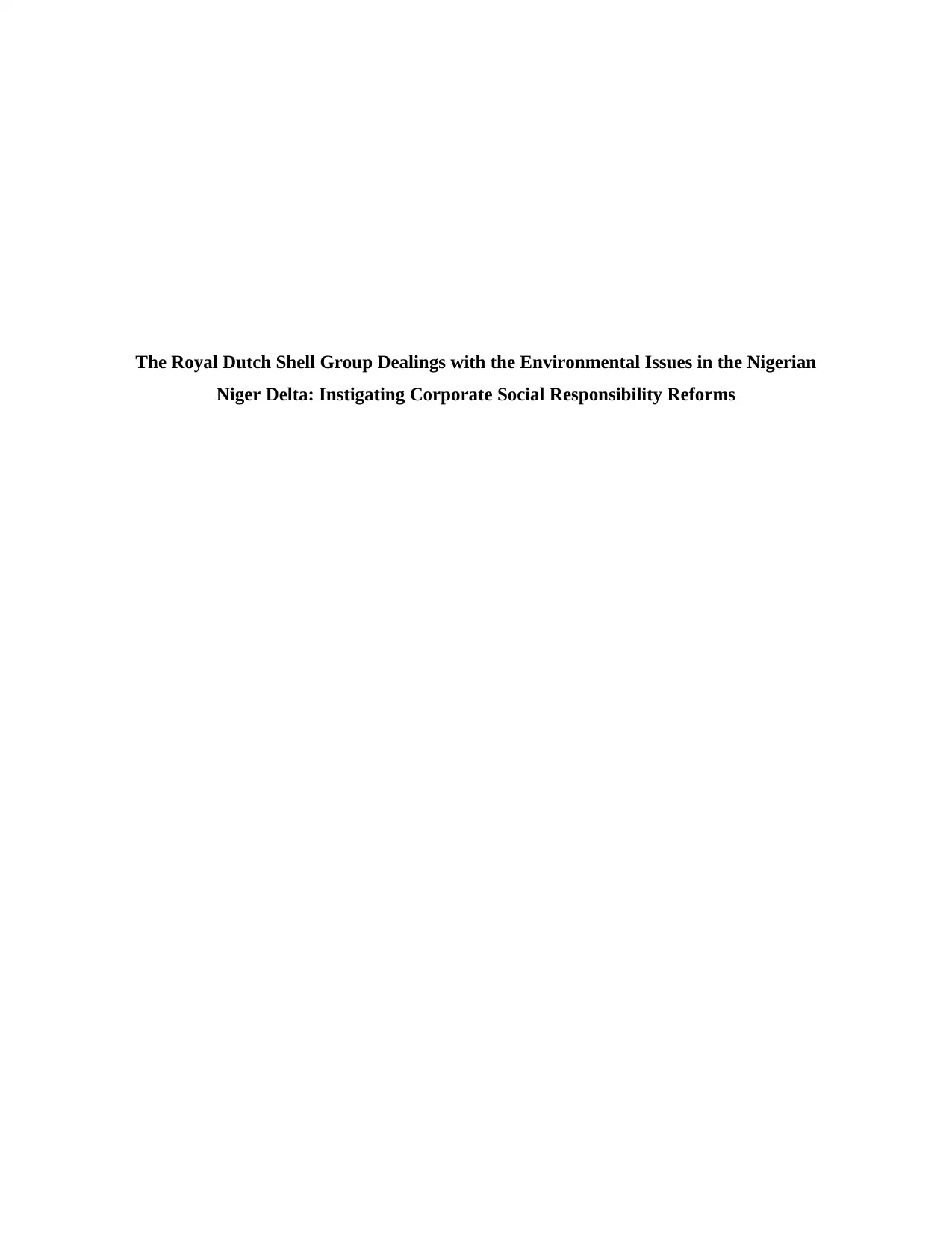
The Royal Dutch Shell Group Dealings with the Environmental Issues in the Nigerian
Niger Delta: Instigating Corporate Social Responsibility Reforms
Niger Delta: Instigating Corporate Social Responsibility Reforms
Secure Best Marks with AI Grader
Need help grading? Try our AI Grader for instant feedback on your assignments.
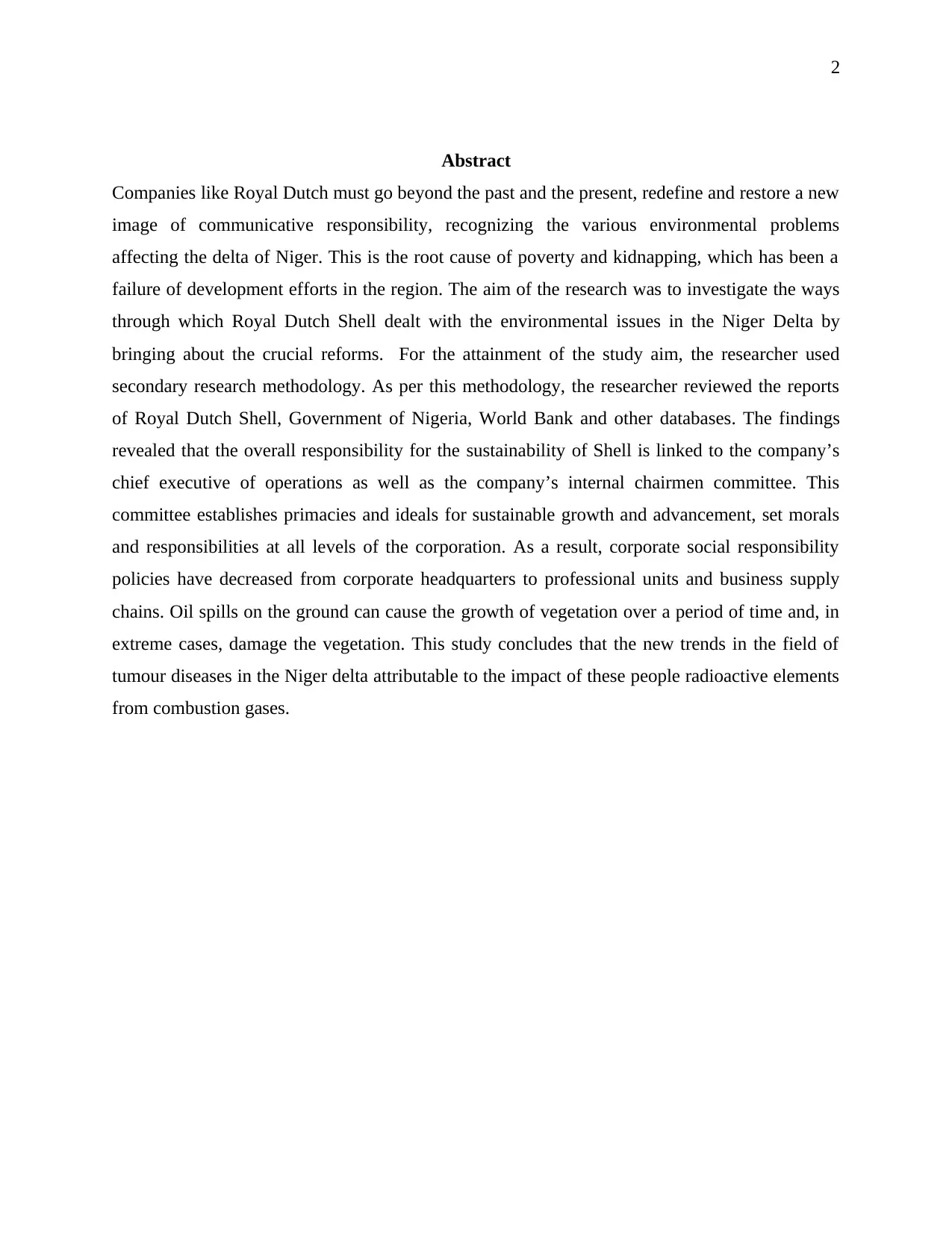
2
Abstract
Companies like Royal Dutch must go beyond the past and the present, redefine and restore a new
image of communicative responsibility, recognizing the various environmental problems
affecting the delta of Niger. This is the root cause of poverty and kidnapping, which has been a
failure of development efforts in the region. The aim of the research was to investigate the ways
through which Royal Dutch Shell dealt with the environmental issues in the Niger Delta by
bringing about the crucial reforms. For the attainment of the study aim, the researcher used
secondary research methodology. As per this methodology, the researcher reviewed the reports
of Royal Dutch Shell, Government of Nigeria, World Bank and other databases. The findings
revealed that the overall responsibility for the sustainability of Shell is linked to the company’s
chief executive of operations as well as the company’s internal chairmen committee. This
committee establishes primacies and ideals for sustainable growth and advancement, set morals
and responsibilities at all levels of the corporation. As a result, corporate social responsibility
policies have decreased from corporate headquarters to professional units and business supply
chains. Oil spills on the ground can cause the growth of vegetation over a period of time and, in
extreme cases, damage the vegetation. This study concludes that the new trends in the field of
tumour diseases in the Niger delta attributable to the impact of these people radioactive elements
from combustion gases.
Abstract
Companies like Royal Dutch must go beyond the past and the present, redefine and restore a new
image of communicative responsibility, recognizing the various environmental problems
affecting the delta of Niger. This is the root cause of poverty and kidnapping, which has been a
failure of development efforts in the region. The aim of the research was to investigate the ways
through which Royal Dutch Shell dealt with the environmental issues in the Niger Delta by
bringing about the crucial reforms. For the attainment of the study aim, the researcher used
secondary research methodology. As per this methodology, the researcher reviewed the reports
of Royal Dutch Shell, Government of Nigeria, World Bank and other databases. The findings
revealed that the overall responsibility for the sustainability of Shell is linked to the company’s
chief executive of operations as well as the company’s internal chairmen committee. This
committee establishes primacies and ideals for sustainable growth and advancement, set morals
and responsibilities at all levels of the corporation. As a result, corporate social responsibility
policies have decreased from corporate headquarters to professional units and business supply
chains. Oil spills on the ground can cause the growth of vegetation over a period of time and, in
extreme cases, damage the vegetation. This study concludes that the new trends in the field of
tumour diseases in the Niger delta attributable to the impact of these people radioactive elements
from combustion gases.
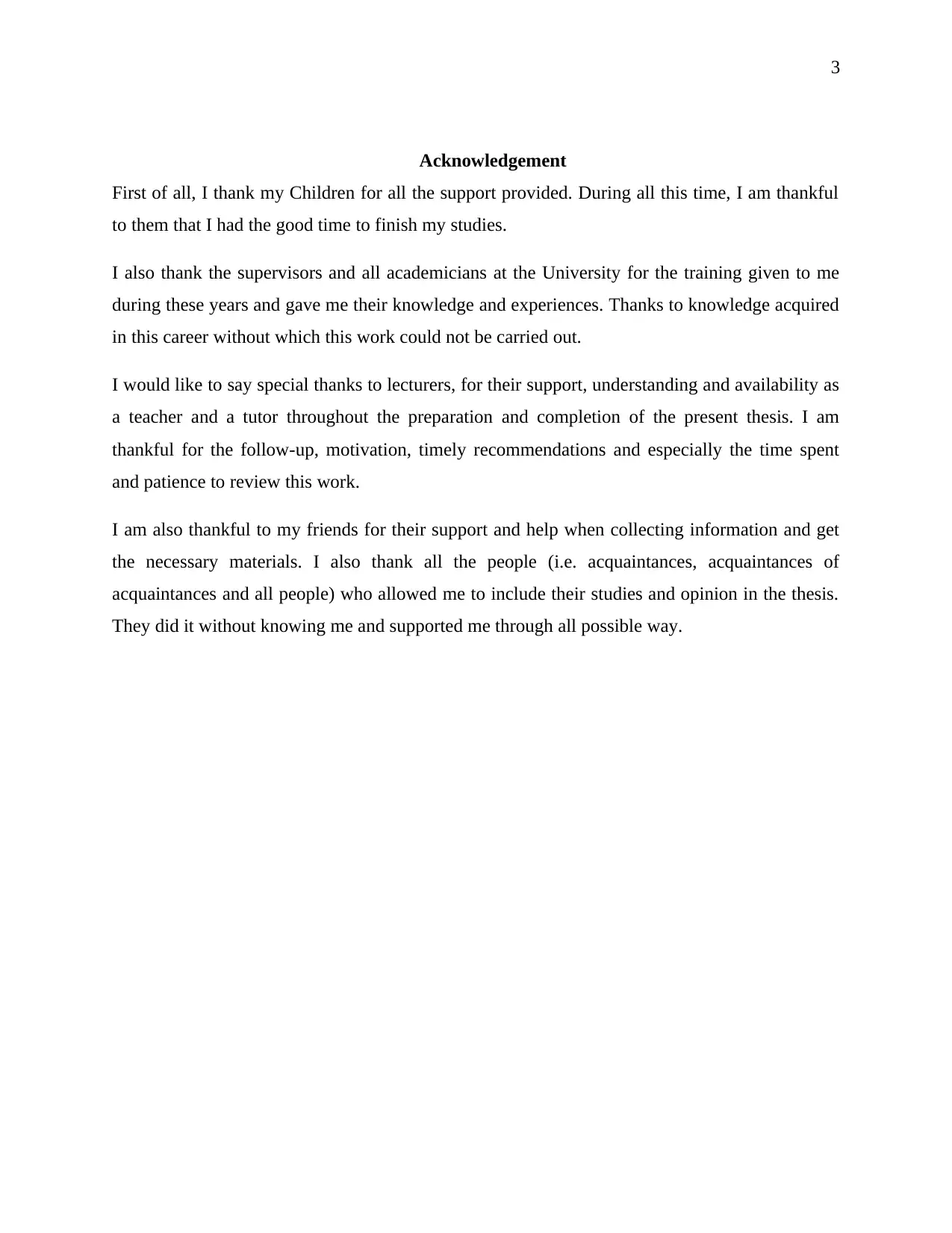
3
Acknowledgement
First of all, I thank my Children for all the support provided. During all this time, I am thankful
to them that I had the good time to finish my studies.
I also thank the supervisors and all academicians at the University for the training given to me
during these years and gave me their knowledge and experiences. Thanks to knowledge acquired
in this career without which this work could not be carried out.
I would like to say special thanks to lecturers, for their support, understanding and availability as
a teacher and a tutor throughout the preparation and completion of the present thesis. I am
thankful for the follow-up, motivation, timely recommendations and especially the time spent
and patience to review this work.
I am also thankful to my friends for their support and help when collecting information and get
the necessary materials. I also thank all the people (i.e. acquaintances, acquaintances of
acquaintances and all people) who allowed me to include their studies and opinion in the thesis.
They did it without knowing me and supported me through all possible way.
Acknowledgement
First of all, I thank my Children for all the support provided. During all this time, I am thankful
to them that I had the good time to finish my studies.
I also thank the supervisors and all academicians at the University for the training given to me
during these years and gave me their knowledge and experiences. Thanks to knowledge acquired
in this career without which this work could not be carried out.
I would like to say special thanks to lecturers, for their support, understanding and availability as
a teacher and a tutor throughout the preparation and completion of the present thesis. I am
thankful for the follow-up, motivation, timely recommendations and especially the time spent
and patience to review this work.
I am also thankful to my friends for their support and help when collecting information and get
the necessary materials. I also thank all the people (i.e. acquaintances, acquaintances of
acquaintances and all people) who allowed me to include their studies and opinion in the thesis.
They did it without knowing me and supported me through all possible way.
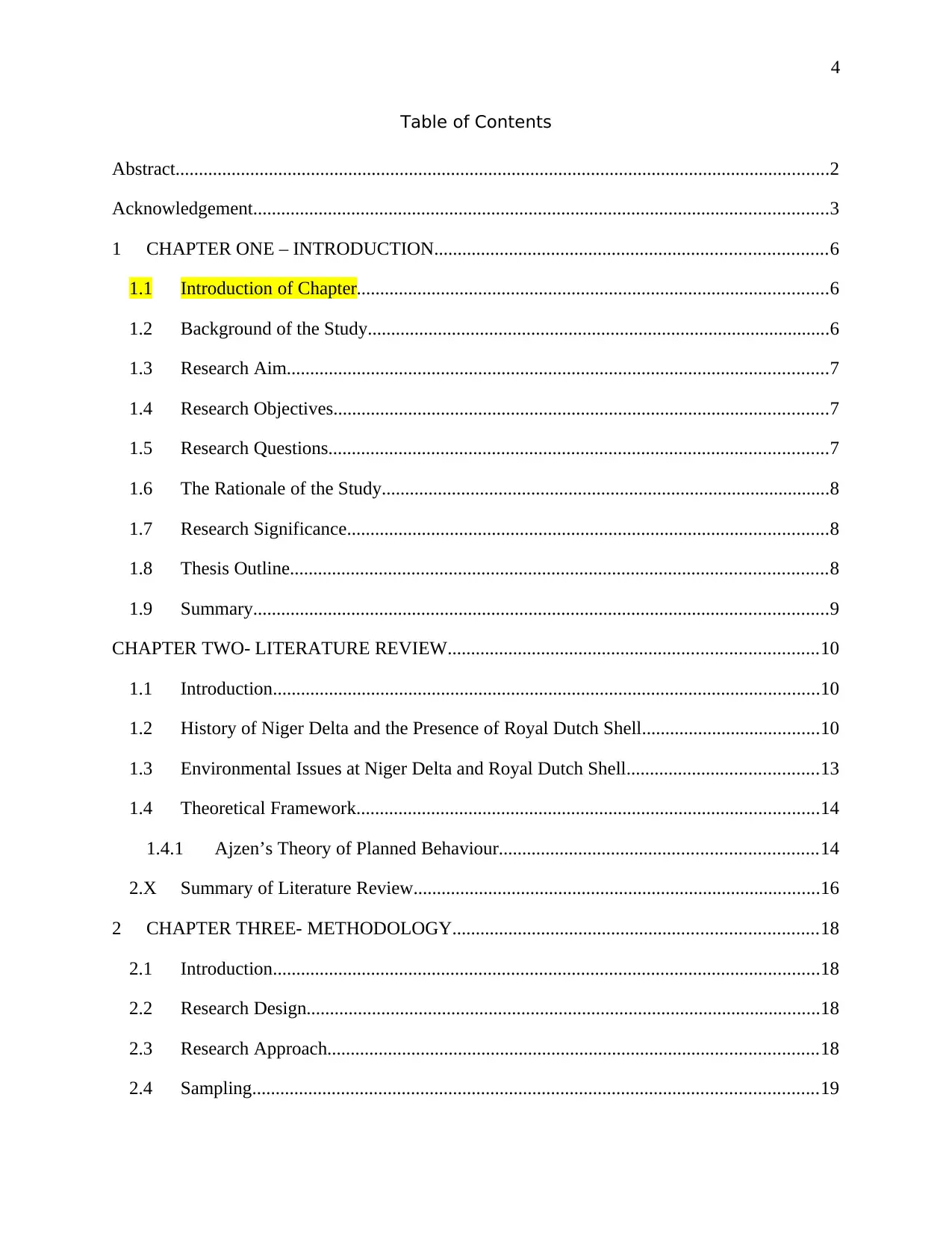
4
Table of Contents
Abstract............................................................................................................................................2
Acknowledgement...........................................................................................................................3
1 CHAPTER ONE – INTRODUCTION....................................................................................6
1.1 Introduction of Chapter.....................................................................................................6
1.2 Background of the Study...................................................................................................6
1.3 Research Aim....................................................................................................................7
1.4 Research Objectives..........................................................................................................7
1.5 Research Questions...........................................................................................................7
1.6 The Rationale of the Study................................................................................................8
1.7 Research Significance.......................................................................................................8
1.8 Thesis Outline...................................................................................................................8
1.9 Summary...........................................................................................................................9
CHAPTER TWO- LITERATURE REVIEW...............................................................................10
1.1 Introduction.....................................................................................................................10
1.2 History of Niger Delta and the Presence of Royal Dutch Shell......................................10
1.3 Environmental Issues at Niger Delta and Royal Dutch Shell.........................................13
1.4 Theoretical Framework...................................................................................................14
1.4.1 Ajzen’s Theory of Planned Behaviour....................................................................14
2.X Summary of Literature Review.......................................................................................16
2 CHAPTER THREE- METHODOLOGY..............................................................................18
2.1 Introduction.....................................................................................................................18
2.2 Research Design..............................................................................................................18
2.3 Research Approach.........................................................................................................18
2.4 Sampling.........................................................................................................................19
Table of Contents
Abstract............................................................................................................................................2
Acknowledgement...........................................................................................................................3
1 CHAPTER ONE – INTRODUCTION....................................................................................6
1.1 Introduction of Chapter.....................................................................................................6
1.2 Background of the Study...................................................................................................6
1.3 Research Aim....................................................................................................................7
1.4 Research Objectives..........................................................................................................7
1.5 Research Questions...........................................................................................................7
1.6 The Rationale of the Study................................................................................................8
1.7 Research Significance.......................................................................................................8
1.8 Thesis Outline...................................................................................................................8
1.9 Summary...........................................................................................................................9
CHAPTER TWO- LITERATURE REVIEW...............................................................................10
1.1 Introduction.....................................................................................................................10
1.2 History of Niger Delta and the Presence of Royal Dutch Shell......................................10
1.3 Environmental Issues at Niger Delta and Royal Dutch Shell.........................................13
1.4 Theoretical Framework...................................................................................................14
1.4.1 Ajzen’s Theory of Planned Behaviour....................................................................14
2.X Summary of Literature Review.......................................................................................16
2 CHAPTER THREE- METHODOLOGY..............................................................................18
2.1 Introduction.....................................................................................................................18
2.2 Research Design..............................................................................................................18
2.3 Research Approach.........................................................................................................18
2.4 Sampling.........................................................................................................................19
Secure Best Marks with AI Grader
Need help grading? Try our AI Grader for instant feedback on your assignments.
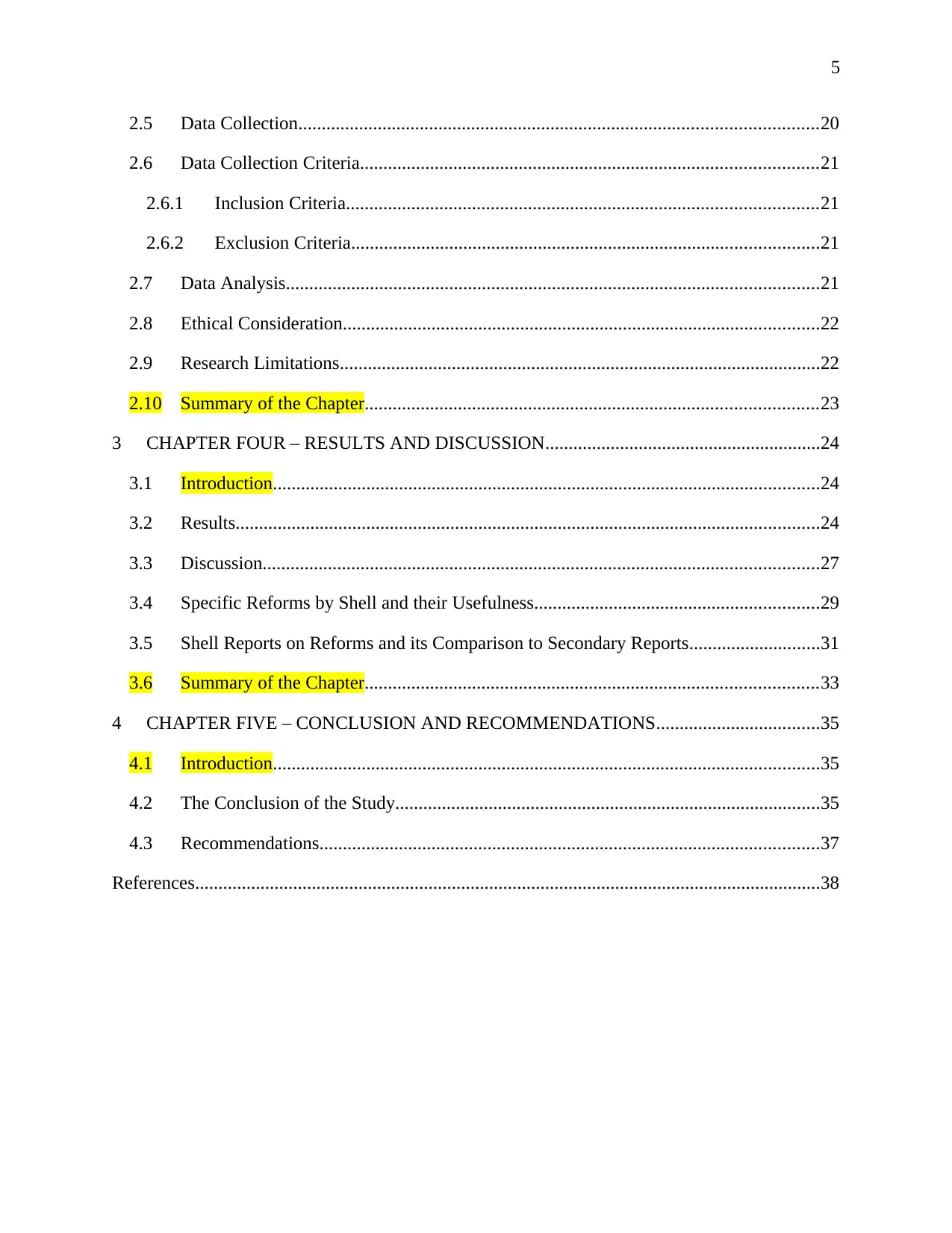
5
2.5 Data Collection...............................................................................................................20
2.6 Data Collection Criteria..................................................................................................21
2.6.1 Inclusion Criteria.....................................................................................................21
2.6.2 Exclusion Criteria....................................................................................................21
2.7 Data Analysis..................................................................................................................21
2.8 Ethical Consideration......................................................................................................22
2.9 Research Limitations.......................................................................................................22
2.10 Summary of the Chapter.................................................................................................23
3 CHAPTER FOUR – RESULTS AND DISCUSSION...........................................................24
3.1 Introduction.....................................................................................................................24
3.2 Results.............................................................................................................................24
3.3 Discussion.......................................................................................................................27
3.4 Specific Reforms by Shell and their Usefulness.............................................................29
3.5 Shell Reports on Reforms and its Comparison to Secondary Reports............................31
3.6 Summary of the Chapter.................................................................................................33
4 CHAPTER FIVE – CONCLUSION AND RECOMMENDATIONS...................................35
4.1 Introduction.....................................................................................................................35
4.2 The Conclusion of the Study...........................................................................................35
4.3 Recommendations...........................................................................................................37
References......................................................................................................................................38
2.5 Data Collection...............................................................................................................20
2.6 Data Collection Criteria..................................................................................................21
2.6.1 Inclusion Criteria.....................................................................................................21
2.6.2 Exclusion Criteria....................................................................................................21
2.7 Data Analysis..................................................................................................................21
2.8 Ethical Consideration......................................................................................................22
2.9 Research Limitations.......................................................................................................22
2.10 Summary of the Chapter.................................................................................................23
3 CHAPTER FOUR – RESULTS AND DISCUSSION...........................................................24
3.1 Introduction.....................................................................................................................24
3.2 Results.............................................................................................................................24
3.3 Discussion.......................................................................................................................27
3.4 Specific Reforms by Shell and their Usefulness.............................................................29
3.5 Shell Reports on Reforms and its Comparison to Secondary Reports............................31
3.6 Summary of the Chapter.................................................................................................33
4 CHAPTER FIVE – CONCLUSION AND RECOMMENDATIONS...................................35
4.1 Introduction.....................................................................................................................35
4.2 The Conclusion of the Study...........................................................................................35
4.3 Recommendations...........................................................................................................37
References......................................................................................................................................38
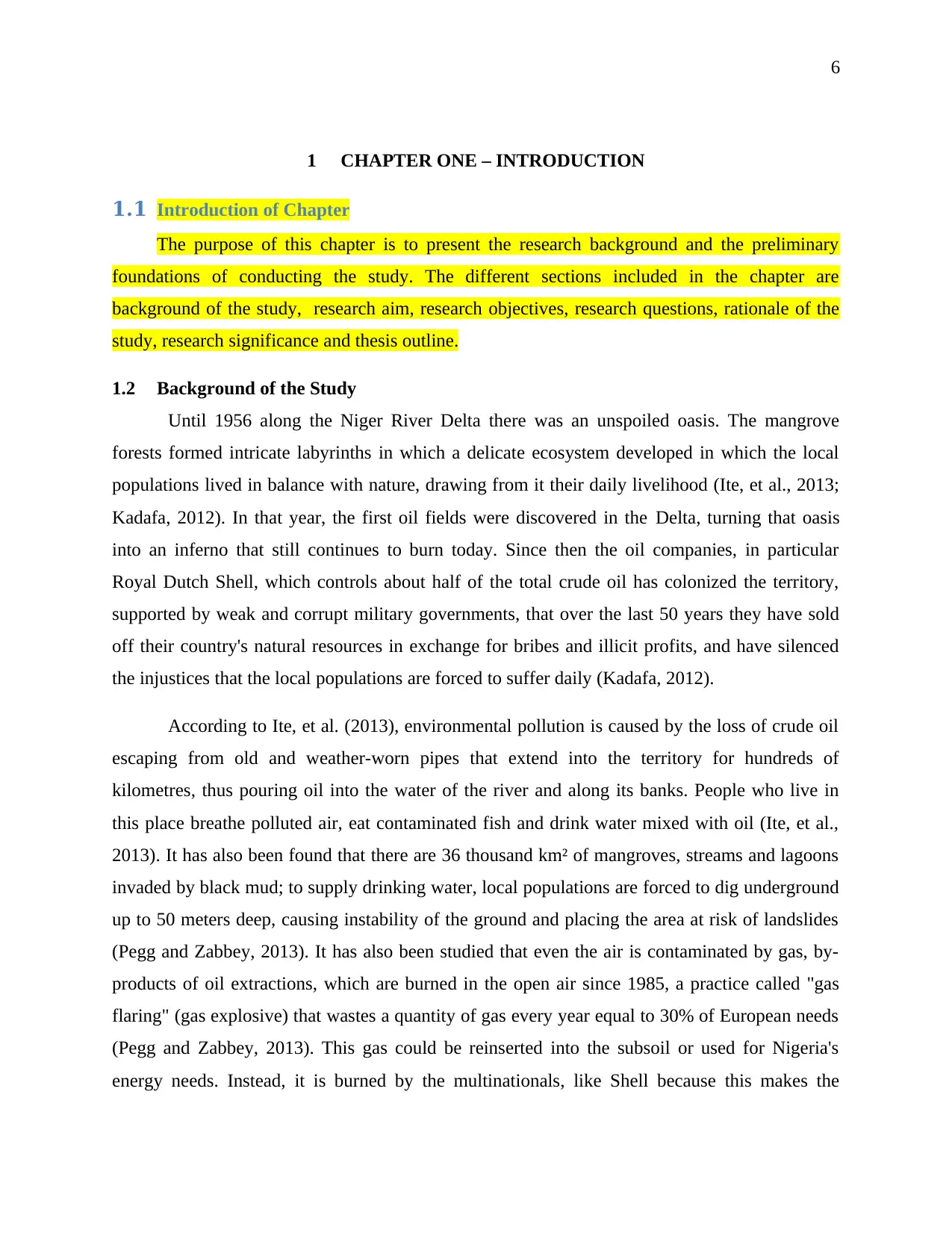
6
1 CHAPTER ONE – INTRODUCTION
1.1 Introduction of Chapter
The purpose of this chapter is to present the research background and the preliminary
foundations of conducting the study. The different sections included in the chapter are
background of the study, research aim, research objectives, research questions, rationale of the
study, research significance and thesis outline.
1.2 Background of the Study
Until 1956 along the Niger River Delta there was an unspoiled oasis. The mangrove
forests formed intricate labyrinths in which a delicate ecosystem developed in which the local
populations lived in balance with nature, drawing from it their daily livelihood (Ite, et al., 2013;
Kadafa, 2012). In that year, the first oil fields were discovered in the Delta, turning that oasis
into an inferno that still continues to burn today. Since then the oil companies, in particular
Royal Dutch Shell, which controls about half of the total crude oil has colonized the territory,
supported by weak and corrupt military governments, that over the last 50 years they have sold
off their country's natural resources in exchange for bribes and illicit profits, and have silenced
the injustices that the local populations are forced to suffer daily (Kadafa, 2012).
According to Ite, et al. (2013), environmental pollution is caused by the loss of crude oil
escaping from old and weather-worn pipes that extend into the territory for hundreds of
kilometres, thus pouring oil into the water of the river and along its banks. People who live in
this place breathe polluted air, eat contaminated fish and drink water mixed with oil (Ite, et al.,
2013). It has also been found that there are 36 thousand km² of mangroves, streams and lagoons
invaded by black mud; to supply drinking water, local populations are forced to dig underground
up to 50 meters deep, causing instability of the ground and placing the area at risk of landslides
(Pegg and Zabbey, 2013). It has also been studied that even the air is contaminated by gas, by-
products of oil extractions, which are burned in the open air since 1985, a practice called "gas
flaring" (gas explosive) that wastes a quantity of gas every year equal to 30% of European needs
(Pegg and Zabbey, 2013). This gas could be reinserted into the subsoil or used for Nigeria's
energy needs. Instead, it is burned by the multinationals, like Shell because this makes the
1 CHAPTER ONE – INTRODUCTION
1.1 Introduction of Chapter
The purpose of this chapter is to present the research background and the preliminary
foundations of conducting the study. The different sections included in the chapter are
background of the study, research aim, research objectives, research questions, rationale of the
study, research significance and thesis outline.
1.2 Background of the Study
Until 1956 along the Niger River Delta there was an unspoiled oasis. The mangrove
forests formed intricate labyrinths in which a delicate ecosystem developed in which the local
populations lived in balance with nature, drawing from it their daily livelihood (Ite, et al., 2013;
Kadafa, 2012). In that year, the first oil fields were discovered in the Delta, turning that oasis
into an inferno that still continues to burn today. Since then the oil companies, in particular
Royal Dutch Shell, which controls about half of the total crude oil has colonized the territory,
supported by weak and corrupt military governments, that over the last 50 years they have sold
off their country's natural resources in exchange for bribes and illicit profits, and have silenced
the injustices that the local populations are forced to suffer daily (Kadafa, 2012).
According to Ite, et al. (2013), environmental pollution is caused by the loss of crude oil
escaping from old and weather-worn pipes that extend into the territory for hundreds of
kilometres, thus pouring oil into the water of the river and along its banks. People who live in
this place breathe polluted air, eat contaminated fish and drink water mixed with oil (Ite, et al.,
2013). It has also been found that there are 36 thousand km² of mangroves, streams and lagoons
invaded by black mud; to supply drinking water, local populations are forced to dig underground
up to 50 meters deep, causing instability of the ground and placing the area at risk of landslides
(Pegg and Zabbey, 2013). It has also been studied that even the air is contaminated by gas, by-
products of oil extractions, which are burned in the open air since 1985, a practice called "gas
flaring" (gas explosive) that wastes a quantity of gas every year equal to 30% of European needs
(Pegg and Zabbey, 2013). This gas could be reinserted into the subsoil or used for Nigeria's
energy needs. Instead, it is burned by the multinationals, like Shell because this makes the
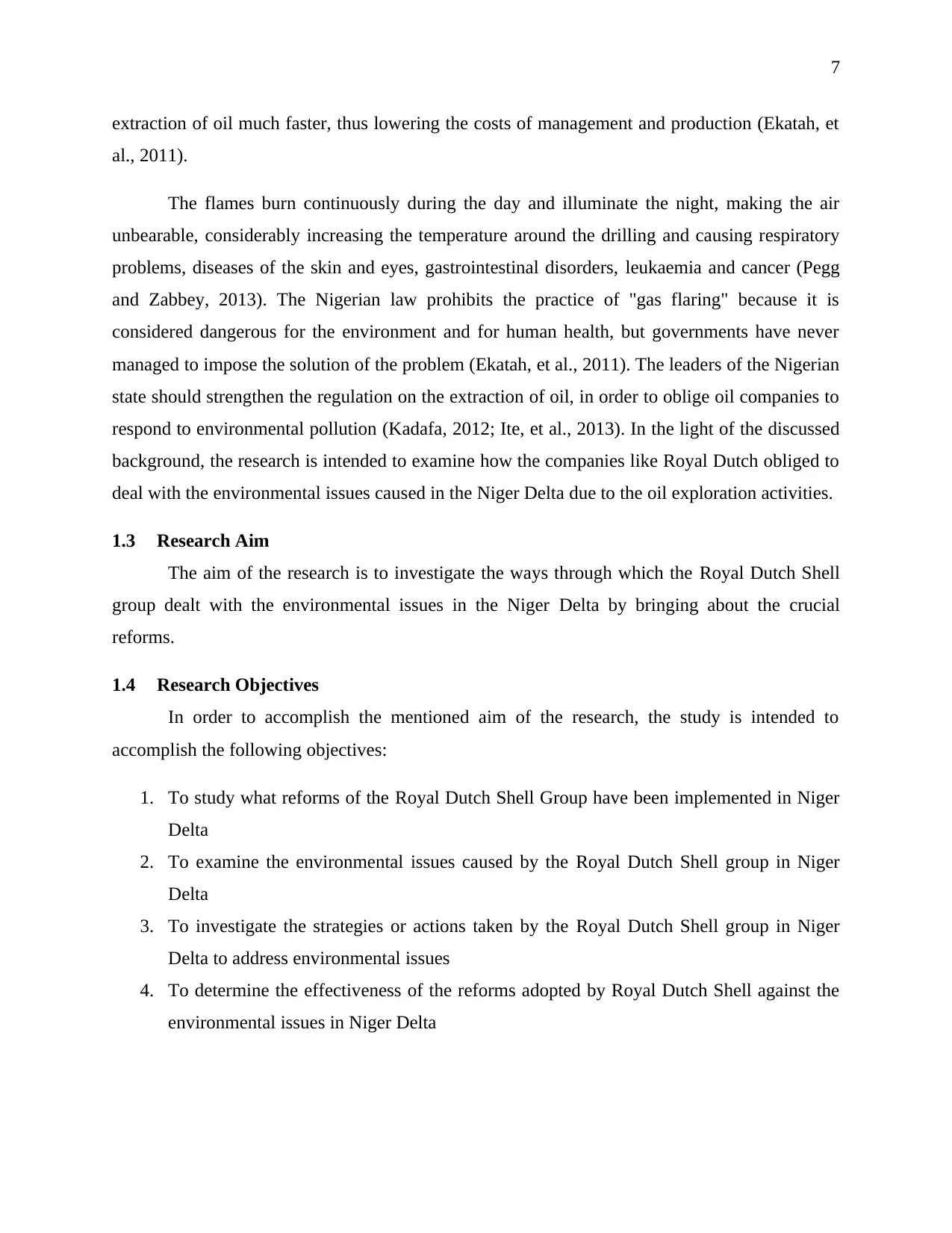
7
extraction of oil much faster, thus lowering the costs of management and production (Ekatah, et
al., 2011).
The flames burn continuously during the day and illuminate the night, making the air
unbearable, considerably increasing the temperature around the drilling and causing respiratory
problems, diseases of the skin and eyes, gastrointestinal disorders, leukaemia and cancer (Pegg
and Zabbey, 2013). The Nigerian law prohibits the practice of "gas flaring" because it is
considered dangerous for the environment and for human health, but governments have never
managed to impose the solution of the problem (Ekatah, et al., 2011). The leaders of the Nigerian
state should strengthen the regulation on the extraction of oil, in order to oblige oil companies to
respond to environmental pollution (Kadafa, 2012; Ite, et al., 2013). In the light of the discussed
background, the research is intended to examine how the companies like Royal Dutch obliged to
deal with the environmental issues caused in the Niger Delta due to the oil exploration activities.
1.3 Research Aim
The aim of the research is to investigate the ways through which the Royal Dutch Shell
group dealt with the environmental issues in the Niger Delta by bringing about the crucial
reforms.
1.4 Research Objectives
In order to accomplish the mentioned aim of the research, the study is intended to
accomplish the following objectives:
1. To study what reforms of the Royal Dutch Shell Group have been implemented in Niger
Delta
2. To examine the environmental issues caused by the Royal Dutch Shell group in Niger
Delta
3. To investigate the strategies or actions taken by the Royal Dutch Shell group in Niger
Delta to address environmental issues
4. To determine the effectiveness of the reforms adopted by Royal Dutch Shell against the
environmental issues in Niger Delta
extraction of oil much faster, thus lowering the costs of management and production (Ekatah, et
al., 2011).
The flames burn continuously during the day and illuminate the night, making the air
unbearable, considerably increasing the temperature around the drilling and causing respiratory
problems, diseases of the skin and eyes, gastrointestinal disorders, leukaemia and cancer (Pegg
and Zabbey, 2013). The Nigerian law prohibits the practice of "gas flaring" because it is
considered dangerous for the environment and for human health, but governments have never
managed to impose the solution of the problem (Ekatah, et al., 2011). The leaders of the Nigerian
state should strengthen the regulation on the extraction of oil, in order to oblige oil companies to
respond to environmental pollution (Kadafa, 2012; Ite, et al., 2013). In the light of the discussed
background, the research is intended to examine how the companies like Royal Dutch obliged to
deal with the environmental issues caused in the Niger Delta due to the oil exploration activities.
1.3 Research Aim
The aim of the research is to investigate the ways through which the Royal Dutch Shell
group dealt with the environmental issues in the Niger Delta by bringing about the crucial
reforms.
1.4 Research Objectives
In order to accomplish the mentioned aim of the research, the study is intended to
accomplish the following objectives:
1. To study what reforms of the Royal Dutch Shell Group have been implemented in Niger
Delta
2. To examine the environmental issues caused by the Royal Dutch Shell group in Niger
Delta
3. To investigate the strategies or actions taken by the Royal Dutch Shell group in Niger
Delta to address environmental issues
4. To determine the effectiveness of the reforms adopted by Royal Dutch Shell against the
environmental issues in Niger Delta
Paraphrase This Document
Need a fresh take? Get an instant paraphrase of this document with our AI Paraphraser
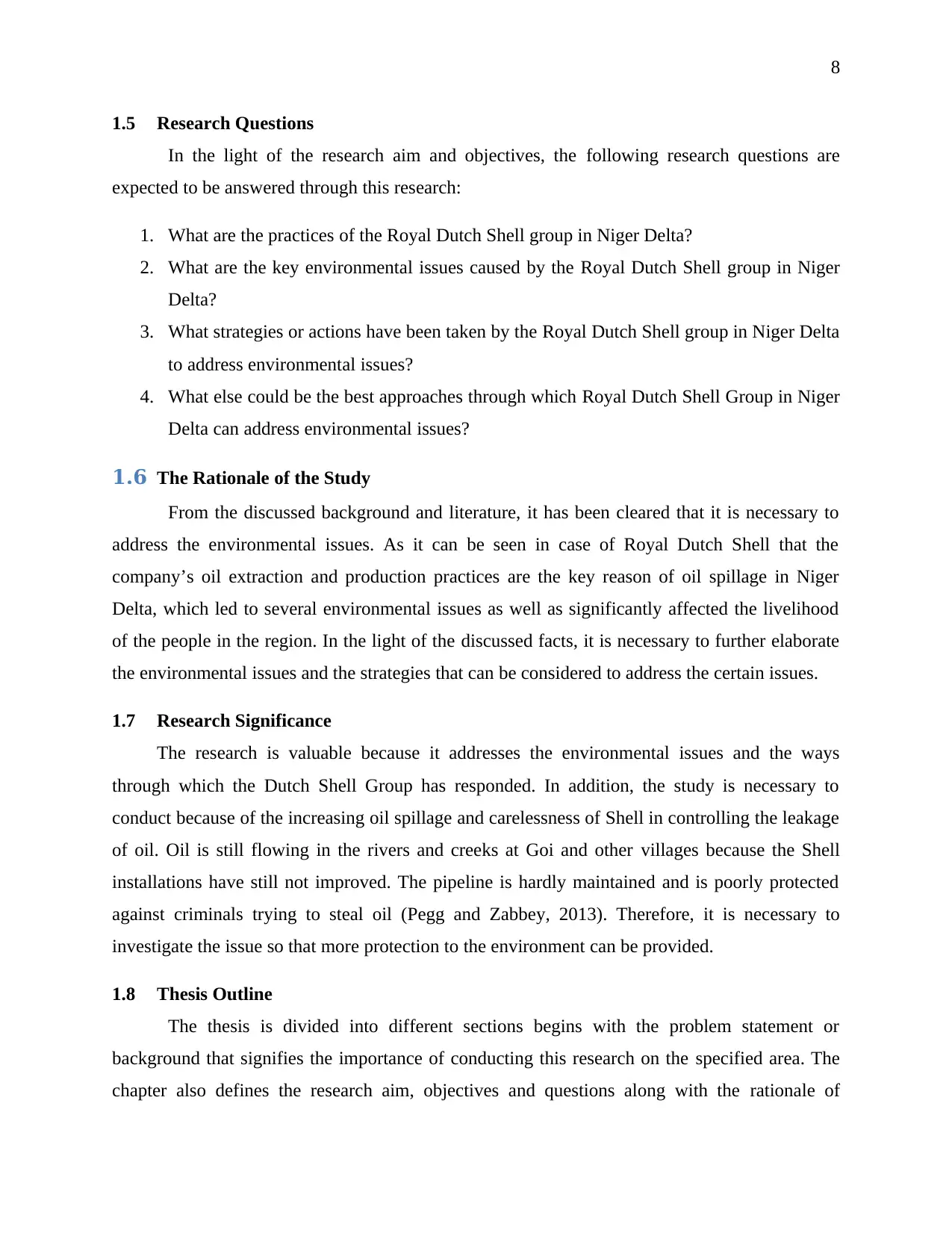
8
1.5 Research Questions
In the light of the research aim and objectives, the following research questions are
expected to be answered through this research:
1. What are the practices of the Royal Dutch Shell group in Niger Delta?
2. What are the key environmental issues caused by the Royal Dutch Shell group in Niger
Delta?
3. What strategies or actions have been taken by the Royal Dutch Shell group in Niger Delta
to address environmental issues?
4. What else could be the best approaches through which Royal Dutch Shell Group in Niger
Delta can address environmental issues?
1.6 The Rationale of the Study
From the discussed background and literature, it has been cleared that it is necessary to
address the environmental issues. As it can be seen in case of Royal Dutch Shell that the
company’s oil extraction and production practices are the key reason of oil spillage in Niger
Delta, which led to several environmental issues as well as significantly affected the livelihood
of the people in the region. In the light of the discussed facts, it is necessary to further elaborate
the environmental issues and the strategies that can be considered to address the certain issues.
1.7 Research Significance
The research is valuable because it addresses the environmental issues and the ways
through which the Dutch Shell Group has responded. In addition, the study is necessary to
conduct because of the increasing oil spillage and carelessness of Shell in controlling the leakage
of oil. Oil is still flowing in the rivers and creeks at Goi and other villages because the Shell
installations have still not improved. The pipeline is hardly maintained and is poorly protected
against criminals trying to steal oil (Pegg and Zabbey, 2013). Therefore, it is necessary to
investigate the issue so that more protection to the environment can be provided.
1.8 Thesis Outline
The thesis is divided into different sections begins with the problem statement or
background that signifies the importance of conducting this research on the specified area. The
chapter also defines the research aim, objectives and questions along with the rationale of
1.5 Research Questions
In the light of the research aim and objectives, the following research questions are
expected to be answered through this research:
1. What are the practices of the Royal Dutch Shell group in Niger Delta?
2. What are the key environmental issues caused by the Royal Dutch Shell group in Niger
Delta?
3. What strategies or actions have been taken by the Royal Dutch Shell group in Niger Delta
to address environmental issues?
4. What else could be the best approaches through which Royal Dutch Shell Group in Niger
Delta can address environmental issues?
1.6 The Rationale of the Study
From the discussed background and literature, it has been cleared that it is necessary to
address the environmental issues. As it can be seen in case of Royal Dutch Shell that the
company’s oil extraction and production practices are the key reason of oil spillage in Niger
Delta, which led to several environmental issues as well as significantly affected the livelihood
of the people in the region. In the light of the discussed facts, it is necessary to further elaborate
the environmental issues and the strategies that can be considered to address the certain issues.
1.7 Research Significance
The research is valuable because it addresses the environmental issues and the ways
through which the Dutch Shell Group has responded. In addition, the study is necessary to
conduct because of the increasing oil spillage and carelessness of Shell in controlling the leakage
of oil. Oil is still flowing in the rivers and creeks at Goi and other villages because the Shell
installations have still not improved. The pipeline is hardly maintained and is poorly protected
against criminals trying to steal oil (Pegg and Zabbey, 2013). Therefore, it is necessary to
investigate the issue so that more protection to the environment can be provided.
1.8 Thesis Outline
The thesis is divided into different sections begins with the problem statement or
background that signifies the importance of conducting this research on the specified area. The
chapter also defines the research aim, objectives and questions along with the rationale of
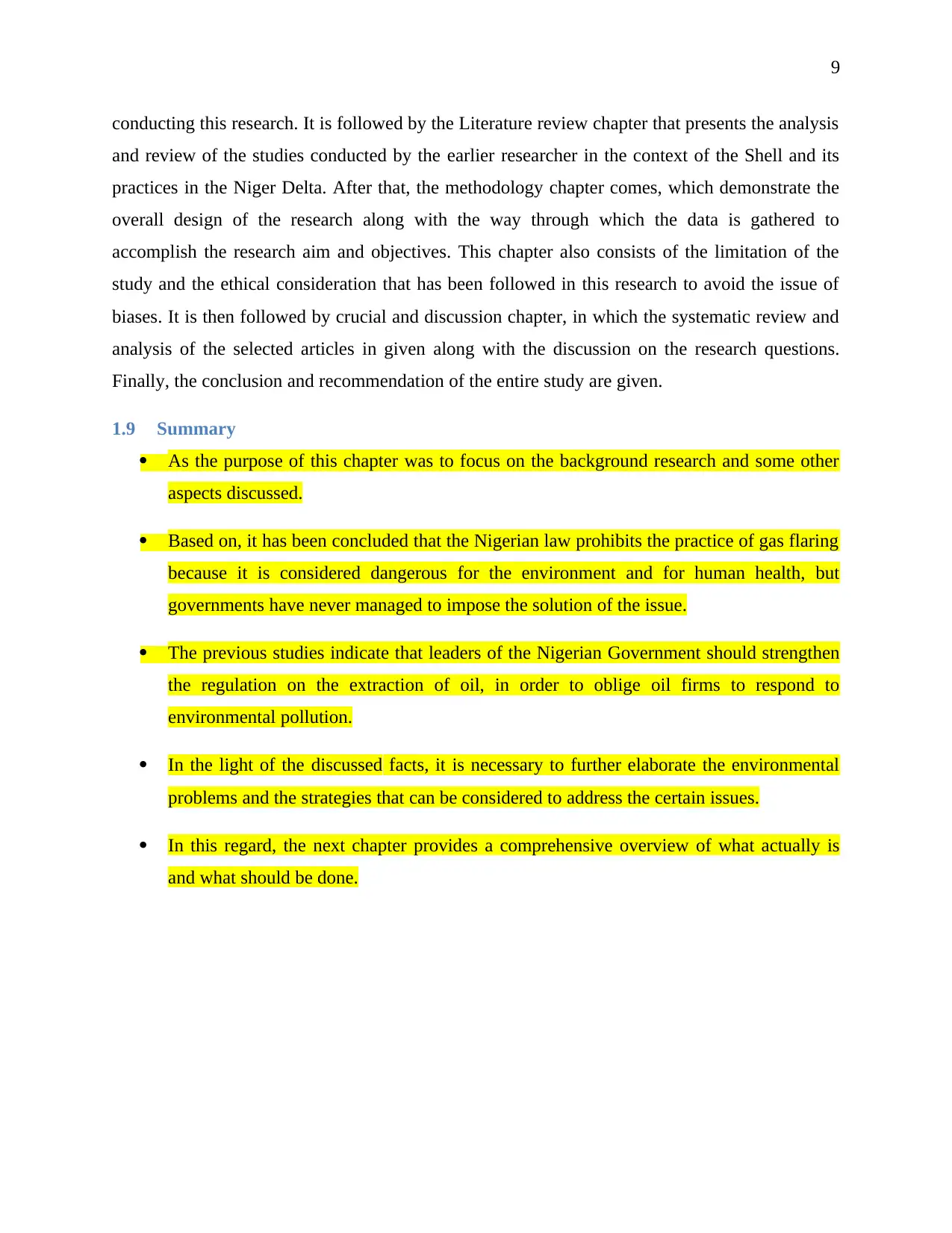
9
conducting this research. It is followed by the Literature review chapter that presents the analysis
and review of the studies conducted by the earlier researcher in the context of the Shell and its
practices in the Niger Delta. After that, the methodology chapter comes, which demonstrate the
overall design of the research along with the way through which the data is gathered to
accomplish the research aim and objectives. This chapter also consists of the limitation of the
study and the ethical consideration that has been followed in this research to avoid the issue of
biases. It is then followed by crucial and discussion chapter, in which the systematic review and
analysis of the selected articles in given along with the discussion on the research questions.
Finally, the conclusion and recommendation of the entire study are given.
1.9 Summary
As the purpose of this chapter was to focus on the background research and some other
aspects discussed.
Based on, it has been concluded that the Nigerian law prohibits the practice of gas flaring
because it is considered dangerous for the environment and for human health, but
governments have never managed to impose the solution of the issue.
The previous studies indicate that leaders of the Nigerian Government should strengthen
the regulation on the extraction of oil, in order to oblige oil firms to respond to
environmental pollution.
In the light of the discussed facts, it is necessary to further elaborate the environmental
problems and the strategies that can be considered to address the certain issues.
In this regard, the next chapter provides a comprehensive overview of what actually is
and what should be done.
conducting this research. It is followed by the Literature review chapter that presents the analysis
and review of the studies conducted by the earlier researcher in the context of the Shell and its
practices in the Niger Delta. After that, the methodology chapter comes, which demonstrate the
overall design of the research along with the way through which the data is gathered to
accomplish the research aim and objectives. This chapter also consists of the limitation of the
study and the ethical consideration that has been followed in this research to avoid the issue of
biases. It is then followed by crucial and discussion chapter, in which the systematic review and
analysis of the selected articles in given along with the discussion on the research questions.
Finally, the conclusion and recommendation of the entire study are given.
1.9 Summary
As the purpose of this chapter was to focus on the background research and some other
aspects discussed.
Based on, it has been concluded that the Nigerian law prohibits the practice of gas flaring
because it is considered dangerous for the environment and for human health, but
governments have never managed to impose the solution of the issue.
The previous studies indicate that leaders of the Nigerian Government should strengthen
the regulation on the extraction of oil, in order to oblige oil firms to respond to
environmental pollution.
In the light of the discussed facts, it is necessary to further elaborate the environmental
problems and the strategies that can be considered to address the certain issues.
In this regard, the next chapter provides a comprehensive overview of what actually is
and what should be done.
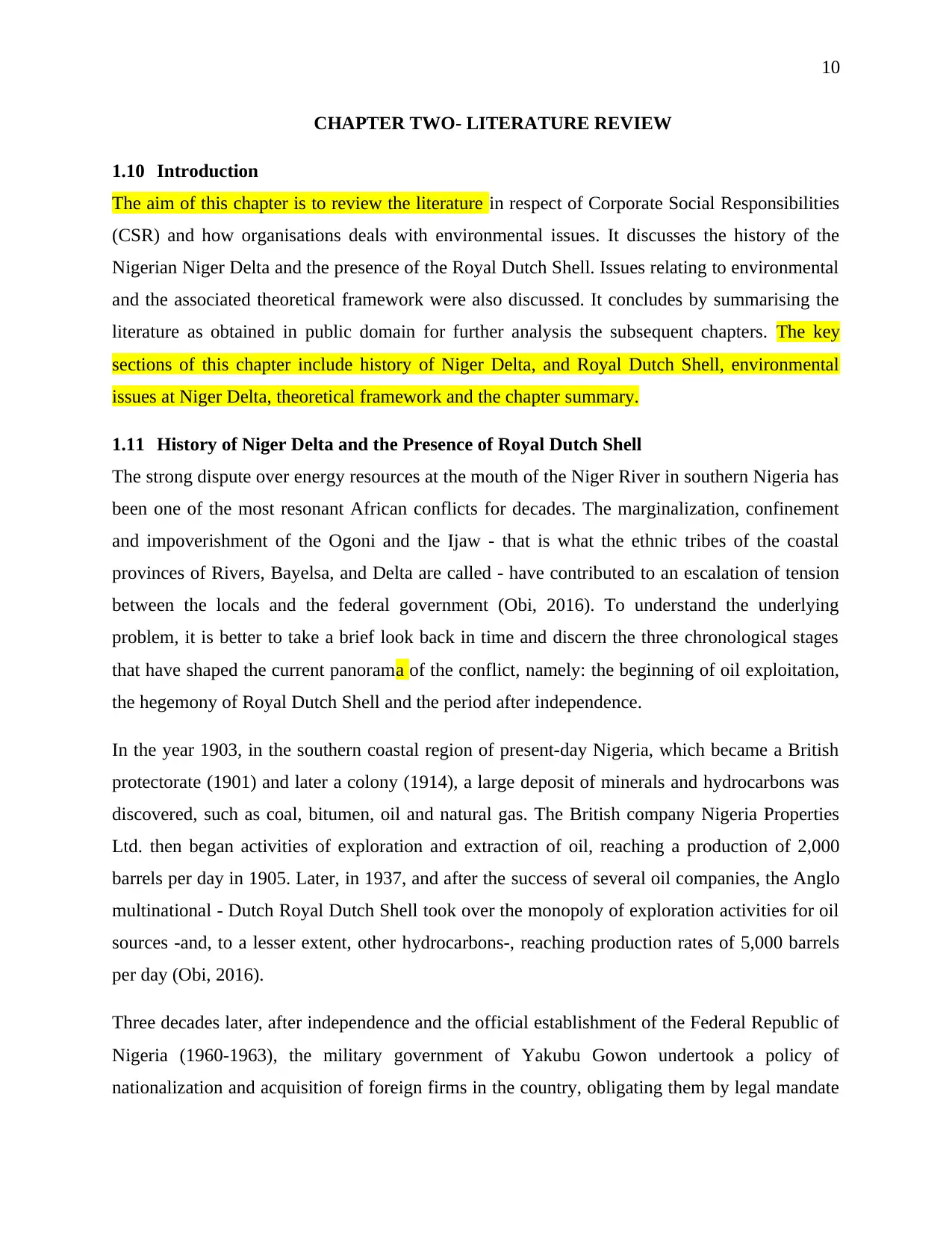
10
CHAPTER TWO- LITERATURE REVIEW
1.10 Introduction
The aim of this chapter is to review the literature in respect of Corporate Social Responsibilities
(CSR) and how organisations deals with environmental issues. It discusses the history of the
Nigerian Niger Delta and the presence of the Royal Dutch Shell. Issues relating to environmental
and the associated theoretical framework were also discussed. It concludes by summarising the
literature as obtained in public domain for further analysis the subsequent chapters. The key
sections of this chapter include history of Niger Delta, and Royal Dutch Shell, environmental
issues at Niger Delta, theoretical framework and the chapter summary.
1.11 History of Niger Delta and the Presence of Royal Dutch Shell
The strong dispute over energy resources at the mouth of the Niger River in southern Nigeria has
been one of the most resonant African conflicts for decades. The marginalization, confinement
and impoverishment of the Ogoni and the Ijaw - that is what the ethnic tribes of the coastal
provinces of Rivers, Bayelsa, and Delta are called - have contributed to an escalation of tension
between the locals and the federal government (Obi, 2016). To understand the underlying
problem, it is better to take a brief look back in time and discern the three chronological stages
that have shaped the current panorama of the conflict, namely: the beginning of oil exploitation,
the hegemony of Royal Dutch Shell and the period after independence.
In the year 1903, in the southern coastal region of present-day Nigeria, which became a British
protectorate (1901) and later a colony (1914), a large deposit of minerals and hydrocarbons was
discovered, such as coal, bitumen, oil and natural gas. The British company Nigeria Properties
Ltd. then began activities of exploration and extraction of oil, reaching a production of 2,000
barrels per day in 1905. Later, in 1937, and after the success of several oil companies, the Anglo
multinational - Dutch Royal Dutch Shell took over the monopoly of exploration activities for oil
sources -and, to a lesser extent, other hydrocarbons-, reaching production rates of 5,000 barrels
per day (Obi, 2016).
Three decades later, after independence and the official establishment of the Federal Republic of
Nigeria (1960-1963), the military government of Yakubu Gowon undertook a policy of
nationalization and acquisition of foreign firms in the country, obligating them by legal mandate
CHAPTER TWO- LITERATURE REVIEW
1.10 Introduction
The aim of this chapter is to review the literature in respect of Corporate Social Responsibilities
(CSR) and how organisations deals with environmental issues. It discusses the history of the
Nigerian Niger Delta and the presence of the Royal Dutch Shell. Issues relating to environmental
and the associated theoretical framework were also discussed. It concludes by summarising the
literature as obtained in public domain for further analysis the subsequent chapters. The key
sections of this chapter include history of Niger Delta, and Royal Dutch Shell, environmental
issues at Niger Delta, theoretical framework and the chapter summary.
1.11 History of Niger Delta and the Presence of Royal Dutch Shell
The strong dispute over energy resources at the mouth of the Niger River in southern Nigeria has
been one of the most resonant African conflicts for decades. The marginalization, confinement
and impoverishment of the Ogoni and the Ijaw - that is what the ethnic tribes of the coastal
provinces of Rivers, Bayelsa, and Delta are called - have contributed to an escalation of tension
between the locals and the federal government (Obi, 2016). To understand the underlying
problem, it is better to take a brief look back in time and discern the three chronological stages
that have shaped the current panorama of the conflict, namely: the beginning of oil exploitation,
the hegemony of Royal Dutch Shell and the period after independence.
In the year 1903, in the southern coastal region of present-day Nigeria, which became a British
protectorate (1901) and later a colony (1914), a large deposit of minerals and hydrocarbons was
discovered, such as coal, bitumen, oil and natural gas. The British company Nigeria Properties
Ltd. then began activities of exploration and extraction of oil, reaching a production of 2,000
barrels per day in 1905. Later, in 1937, and after the success of several oil companies, the Anglo
multinational - Dutch Royal Dutch Shell took over the monopoly of exploration activities for oil
sources -and, to a lesser extent, other hydrocarbons-, reaching production rates of 5,000 barrels
per day (Obi, 2016).
Three decades later, after independence and the official establishment of the Federal Republic of
Nigeria (1960-1963), the military government of Yakubu Gowon undertook a policy of
nationalization and acquisition of foreign firms in the country, obligating them by legal mandate
Secure Best Marks with AI Grader
Need help grading? Try our AI Grader for instant feedback on your assignments.
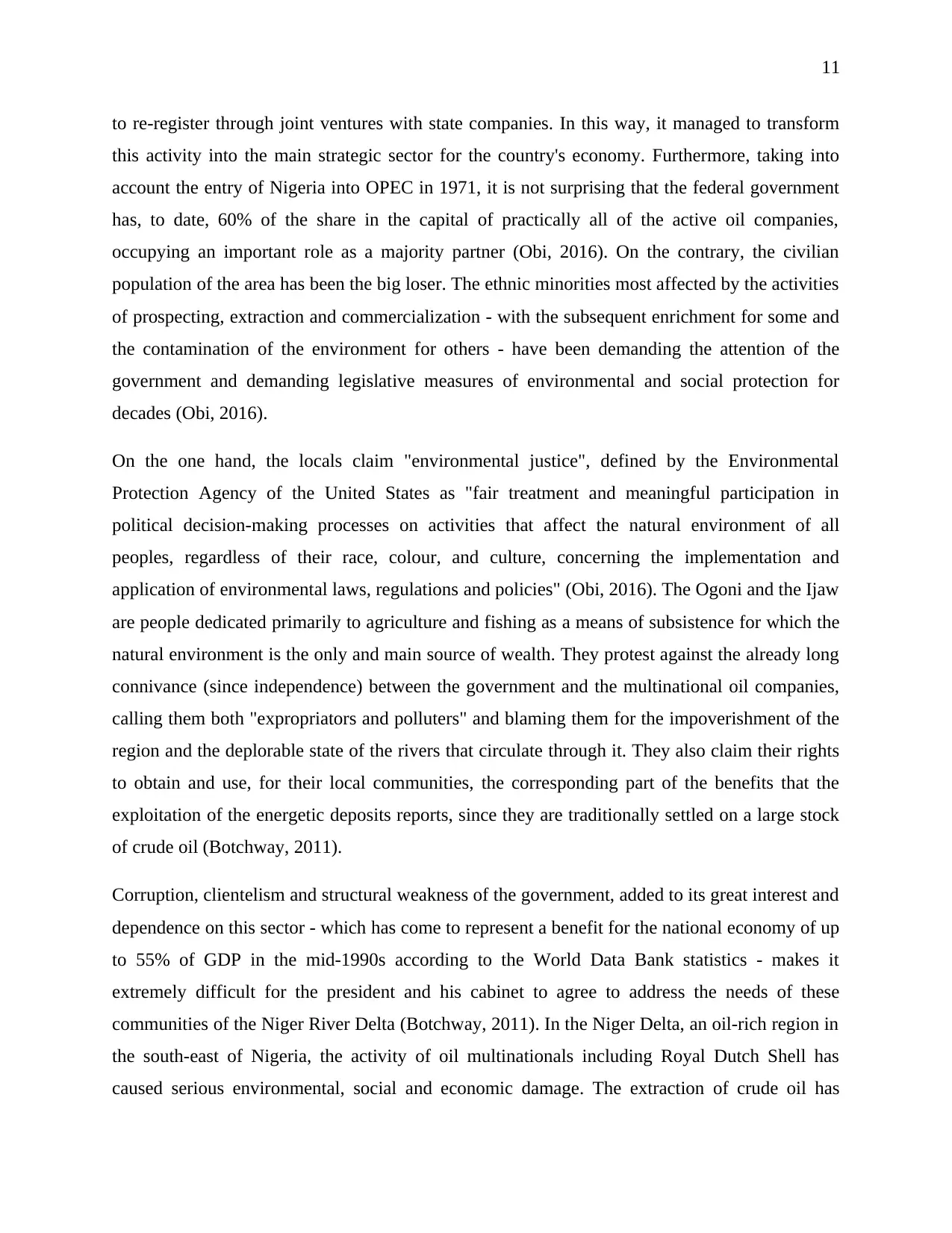
11
to re-register through joint ventures with state companies. In this way, it managed to transform
this activity into the main strategic sector for the country's economy. Furthermore, taking into
account the entry of Nigeria into OPEC in 1971, it is not surprising that the federal government
has, to date, 60% of the share in the capital of practically all of the active oil companies,
occupying an important role as a majority partner (Obi, 2016). On the contrary, the civilian
population of the area has been the big loser. The ethnic minorities most affected by the activities
of prospecting, extraction and commercialization - with the subsequent enrichment for some and
the contamination of the environment for others - have been demanding the attention of the
government and demanding legislative measures of environmental and social protection for
decades (Obi, 2016).
On the one hand, the locals claim "environmental justice", defined by the Environmental
Protection Agency of the United States as "fair treatment and meaningful participation in
political decision-making processes on activities that affect the natural environment of all
peoples, regardless of their race, colour, and culture, concerning the implementation and
application of environmental laws, regulations and policies" (Obi, 2016). The Ogoni and the Ijaw
are people dedicated primarily to agriculture and fishing as a means of subsistence for which the
natural environment is the only and main source of wealth. They protest against the already long
connivance (since independence) between the government and the multinational oil companies,
calling them both "expropriators and polluters" and blaming them for the impoverishment of the
region and the deplorable state of the rivers that circulate through it. They also claim their rights
to obtain and use, for their local communities, the corresponding part of the benefits that the
exploitation of the energetic deposits reports, since they are traditionally settled on a large stock
of crude oil (Botchway, 2011).
Corruption, clientelism and structural weakness of the government, added to its great interest and
dependence on this sector - which has come to represent a benefit for the national economy of up
to 55% of GDP in the mid-1990s according to the World Data Bank statistics - makes it
extremely difficult for the president and his cabinet to agree to address the needs of these
communities of the Niger River Delta (Botchway, 2011). In the Niger Delta, an oil-rich region in
the south-east of Nigeria, the activity of oil multinationals including Royal Dutch Shell has
caused serious environmental, social and economic damage. The extraction of crude oil has
to re-register through joint ventures with state companies. In this way, it managed to transform
this activity into the main strategic sector for the country's economy. Furthermore, taking into
account the entry of Nigeria into OPEC in 1971, it is not surprising that the federal government
has, to date, 60% of the share in the capital of practically all of the active oil companies,
occupying an important role as a majority partner (Obi, 2016). On the contrary, the civilian
population of the area has been the big loser. The ethnic minorities most affected by the activities
of prospecting, extraction and commercialization - with the subsequent enrichment for some and
the contamination of the environment for others - have been demanding the attention of the
government and demanding legislative measures of environmental and social protection for
decades (Obi, 2016).
On the one hand, the locals claim "environmental justice", defined by the Environmental
Protection Agency of the United States as "fair treatment and meaningful participation in
political decision-making processes on activities that affect the natural environment of all
peoples, regardless of their race, colour, and culture, concerning the implementation and
application of environmental laws, regulations and policies" (Obi, 2016). The Ogoni and the Ijaw
are people dedicated primarily to agriculture and fishing as a means of subsistence for which the
natural environment is the only and main source of wealth. They protest against the already long
connivance (since independence) between the government and the multinational oil companies,
calling them both "expropriators and polluters" and blaming them for the impoverishment of the
region and the deplorable state of the rivers that circulate through it. They also claim their rights
to obtain and use, for their local communities, the corresponding part of the benefits that the
exploitation of the energetic deposits reports, since they are traditionally settled on a large stock
of crude oil (Botchway, 2011).
Corruption, clientelism and structural weakness of the government, added to its great interest and
dependence on this sector - which has come to represent a benefit for the national economy of up
to 55% of GDP in the mid-1990s according to the World Data Bank statistics - makes it
extremely difficult for the president and his cabinet to agree to address the needs of these
communities of the Niger River Delta (Botchway, 2011). In the Niger Delta, an oil-rich region in
the south-east of Nigeria, the activity of oil multinationals including Royal Dutch Shell has
caused serious environmental, social and economic damage. The extraction of crude oil has
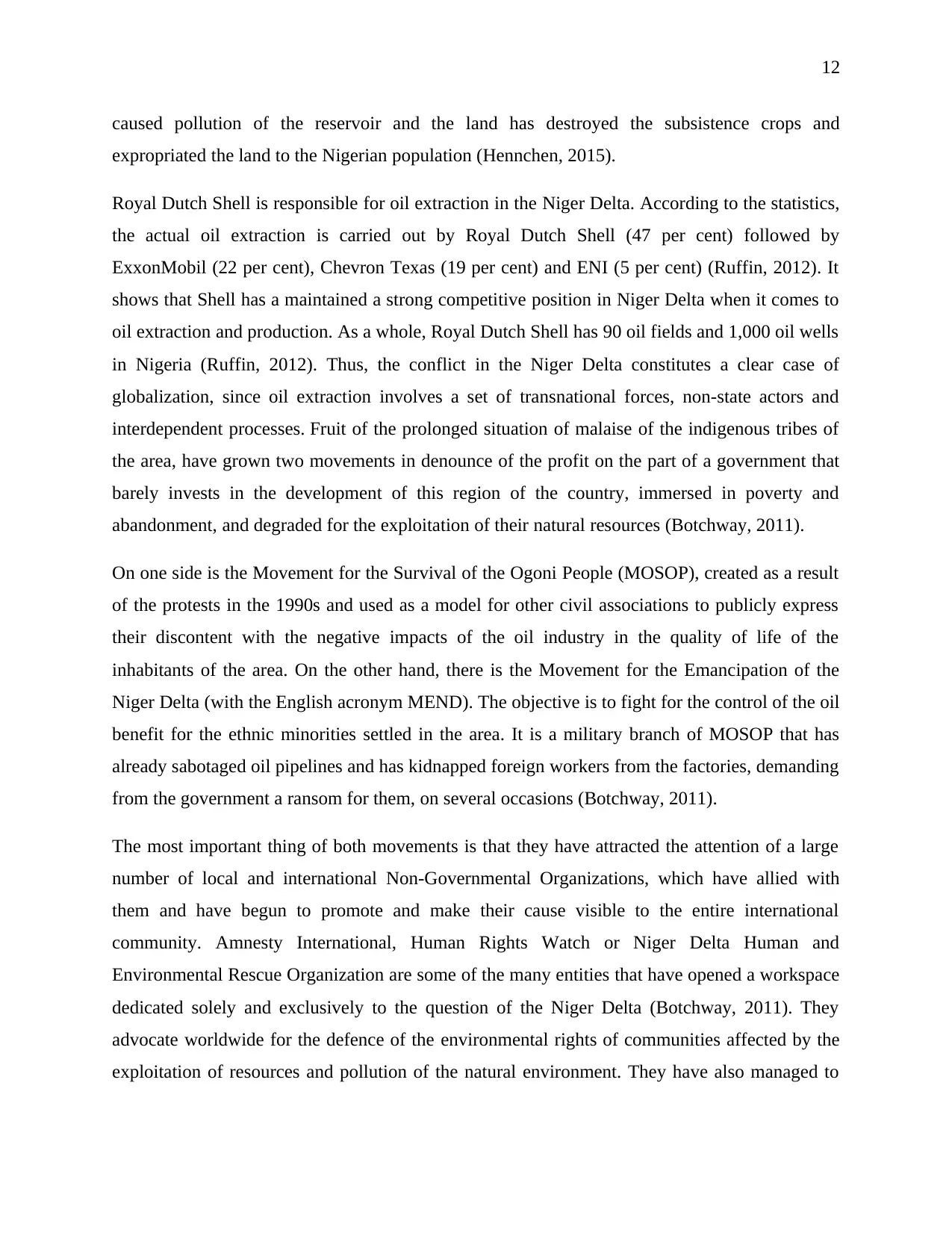
12
caused pollution of the reservoir and the land has destroyed the subsistence crops and
expropriated the land to the Nigerian population (Hennchen, 2015).
Royal Dutch Shell is responsible for oil extraction in the Niger Delta. According to the statistics,
the actual oil extraction is carried out by Royal Dutch Shell (47 per cent) followed by
ExxonMobil (22 per cent), Chevron Texas (19 per cent) and ENI (5 per cent) (Ruffin, 2012). It
shows that Shell has a maintained a strong competitive position in Niger Delta when it comes to
oil extraction and production. As a whole, Royal Dutch Shell has 90 oil fields and 1,000 oil wells
in Nigeria (Ruffin, 2012). Thus, the conflict in the Niger Delta constitutes a clear case of
globalization, since oil extraction involves a set of transnational forces, non-state actors and
interdependent processes. Fruit of the prolonged situation of malaise of the indigenous tribes of
the area, have grown two movements in denounce of the profit on the part of a government that
barely invests in the development of this region of the country, immersed in poverty and
abandonment, and degraded for the exploitation of their natural resources (Botchway, 2011).
On one side is the Movement for the Survival of the Ogoni People (MOSOP), created as a result
of the protests in the 1990s and used as a model for other civil associations to publicly express
their discontent with the negative impacts of the oil industry in the quality of life of the
inhabitants of the area. On the other hand, there is the Movement for the Emancipation of the
Niger Delta (with the English acronym MEND). The objective is to fight for the control of the oil
benefit for the ethnic minorities settled in the area. It is a military branch of MOSOP that has
already sabotaged oil pipelines and has kidnapped foreign workers from the factories, demanding
from the government a ransom for them, on several occasions (Botchway, 2011).
The most important thing of both movements is that they have attracted the attention of a large
number of local and international Non-Governmental Organizations, which have allied with
them and have begun to promote and make their cause visible to the entire international
community. Amnesty International, Human Rights Watch or Niger Delta Human and
Environmental Rescue Organization are some of the many entities that have opened a workspace
dedicated solely and exclusively to the question of the Niger Delta (Botchway, 2011). They
advocate worldwide for the defence of the environmental rights of communities affected by the
exploitation of resources and pollution of the natural environment. They have also managed to
caused pollution of the reservoir and the land has destroyed the subsistence crops and
expropriated the land to the Nigerian population (Hennchen, 2015).
Royal Dutch Shell is responsible for oil extraction in the Niger Delta. According to the statistics,
the actual oil extraction is carried out by Royal Dutch Shell (47 per cent) followed by
ExxonMobil (22 per cent), Chevron Texas (19 per cent) and ENI (5 per cent) (Ruffin, 2012). It
shows that Shell has a maintained a strong competitive position in Niger Delta when it comes to
oil extraction and production. As a whole, Royal Dutch Shell has 90 oil fields and 1,000 oil wells
in Nigeria (Ruffin, 2012). Thus, the conflict in the Niger Delta constitutes a clear case of
globalization, since oil extraction involves a set of transnational forces, non-state actors and
interdependent processes. Fruit of the prolonged situation of malaise of the indigenous tribes of
the area, have grown two movements in denounce of the profit on the part of a government that
barely invests in the development of this region of the country, immersed in poverty and
abandonment, and degraded for the exploitation of their natural resources (Botchway, 2011).
On one side is the Movement for the Survival of the Ogoni People (MOSOP), created as a result
of the protests in the 1990s and used as a model for other civil associations to publicly express
their discontent with the negative impacts of the oil industry in the quality of life of the
inhabitants of the area. On the other hand, there is the Movement for the Emancipation of the
Niger Delta (with the English acronym MEND). The objective is to fight for the control of the oil
benefit for the ethnic minorities settled in the area. It is a military branch of MOSOP that has
already sabotaged oil pipelines and has kidnapped foreign workers from the factories, demanding
from the government a ransom for them, on several occasions (Botchway, 2011).
The most important thing of both movements is that they have attracted the attention of a large
number of local and international Non-Governmental Organizations, which have allied with
them and have begun to promote and make their cause visible to the entire international
community. Amnesty International, Human Rights Watch or Niger Delta Human and
Environmental Rescue Organization are some of the many entities that have opened a workspace
dedicated solely and exclusively to the question of the Niger Delta (Botchway, 2011). They
advocate worldwide for the defence of the environmental rights of communities affected by the
exploitation of resources and pollution of the natural environment. They have also managed to
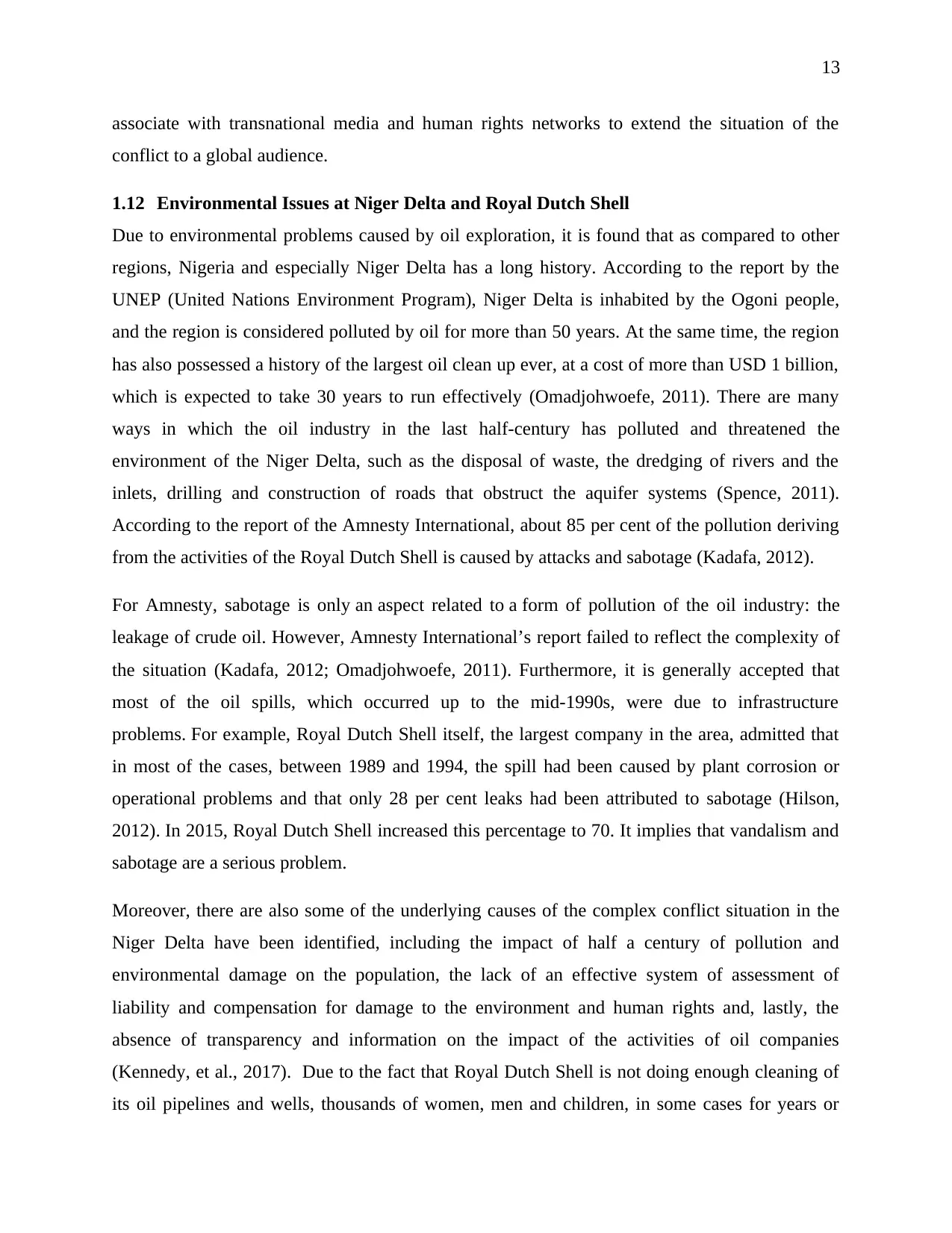
13
associate with transnational media and human rights networks to extend the situation of the
conflict to a global audience.
1.12 Environmental Issues at Niger Delta and Royal Dutch Shell
Due to environmental problems caused by oil exploration, it is found that as compared to other
regions, Nigeria and especially Niger Delta has a long history. According to the report by the
UNEP (United Nations Environment Program), Niger Delta is inhabited by the Ogoni people,
and the region is considered polluted by oil for more than 50 years. At the same time, the region
has also possessed a history of the largest oil clean up ever, at a cost of more than USD 1 billion,
which is expected to take 30 years to run effectively (Omadjohwoefe, 2011). There are many
ways in which the oil industry in the last half-century has polluted and threatened the
environment of the Niger Delta, such as the disposal of waste, the dredging of rivers and the
inlets, drilling and construction of roads that obstruct the aquifer systems (Spence, 2011).
According to the report of the Amnesty International, about 85 per cent of the pollution deriving
from the activities of the Royal Dutch Shell is caused by attacks and sabotage (Kadafa, 2012).
For Amnesty, sabotage is only an aspect related to a form of pollution of the oil industry: the
leakage of crude oil. However, Amnesty International’s report failed to reflect the complexity of
the situation (Kadafa, 2012; Omadjohwoefe, 2011). Furthermore, it is generally accepted that
most of the oil spills, which occurred up to the mid-1990s, were due to infrastructure
problems. For example, Royal Dutch Shell itself, the largest company in the area, admitted that
in most of the cases, between 1989 and 1994, the spill had been caused by plant corrosion or
operational problems and that only 28 per cent leaks had been attributed to sabotage (Hilson,
2012). In 2015, Royal Dutch Shell increased this percentage to 70. It implies that vandalism and
sabotage are a serious problem.
Moreover, there are also some of the underlying causes of the complex conflict situation in the
Niger Delta have been identified, including the impact of half a century of pollution and
environmental damage on the population, the lack of an effective system of assessment of
liability and compensation for damage to the environment and human rights and, lastly, the
absence of transparency and information on the impact of the activities of oil companies
(Kennedy, et al., 2017). Due to the fact that Royal Dutch Shell is not doing enough cleaning of
its oil pipelines and wells, thousands of women, men and children, in some cases for years or
associate with transnational media and human rights networks to extend the situation of the
conflict to a global audience.
1.12 Environmental Issues at Niger Delta and Royal Dutch Shell
Due to environmental problems caused by oil exploration, it is found that as compared to other
regions, Nigeria and especially Niger Delta has a long history. According to the report by the
UNEP (United Nations Environment Program), Niger Delta is inhabited by the Ogoni people,
and the region is considered polluted by oil for more than 50 years. At the same time, the region
has also possessed a history of the largest oil clean up ever, at a cost of more than USD 1 billion,
which is expected to take 30 years to run effectively (Omadjohwoefe, 2011). There are many
ways in which the oil industry in the last half-century has polluted and threatened the
environment of the Niger Delta, such as the disposal of waste, the dredging of rivers and the
inlets, drilling and construction of roads that obstruct the aquifer systems (Spence, 2011).
According to the report of the Amnesty International, about 85 per cent of the pollution deriving
from the activities of the Royal Dutch Shell is caused by attacks and sabotage (Kadafa, 2012).
For Amnesty, sabotage is only an aspect related to a form of pollution of the oil industry: the
leakage of crude oil. However, Amnesty International’s report failed to reflect the complexity of
the situation (Kadafa, 2012; Omadjohwoefe, 2011). Furthermore, it is generally accepted that
most of the oil spills, which occurred up to the mid-1990s, were due to infrastructure
problems. For example, Royal Dutch Shell itself, the largest company in the area, admitted that
in most of the cases, between 1989 and 1994, the spill had been caused by plant corrosion or
operational problems and that only 28 per cent leaks had been attributed to sabotage (Hilson,
2012). In 2015, Royal Dutch Shell increased this percentage to 70. It implies that vandalism and
sabotage are a serious problem.
Moreover, there are also some of the underlying causes of the complex conflict situation in the
Niger Delta have been identified, including the impact of half a century of pollution and
environmental damage on the population, the lack of an effective system of assessment of
liability and compensation for damage to the environment and human rights and, lastly, the
absence of transparency and information on the impact of the activities of oil companies
(Kennedy, et al., 2017). Due to the fact that Royal Dutch Shell is not doing enough cleaning of
its oil pipelines and wells, thousands of women, men and children, in some cases for years or
Paraphrase This Document
Need a fresh take? Get an instant paraphrase of this document with our AI Paraphraser
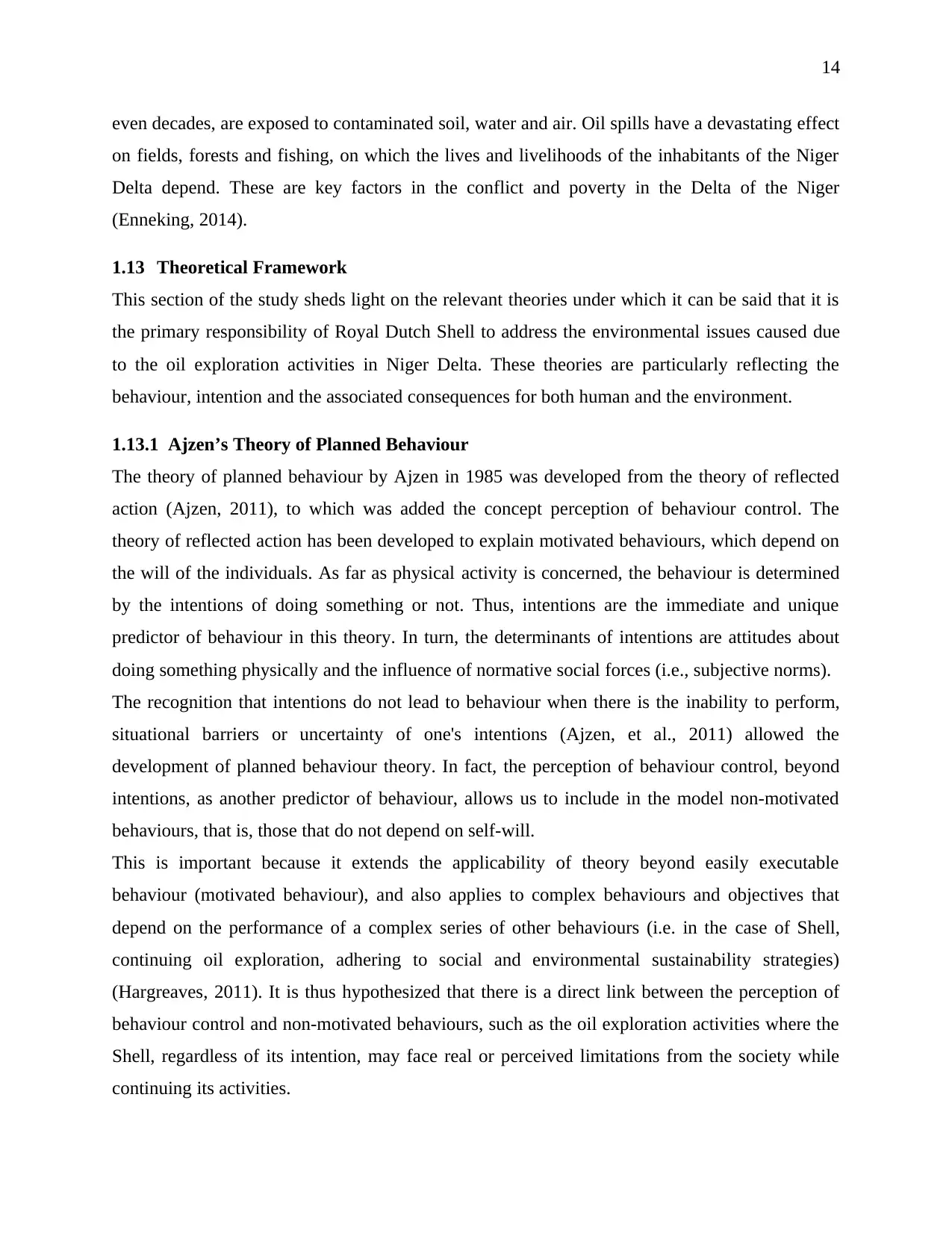
14
even decades, are exposed to contaminated soil, water and air. Oil spills have a devastating effect
on fields, forests and fishing, on which the lives and livelihoods of the inhabitants of the Niger
Delta depend. These are key factors in the conflict and poverty in the Delta of the Niger
(Enneking, 2014).
1.13 Theoretical Framework
This section of the study sheds light on the relevant theories under which it can be said that it is
the primary responsibility of Royal Dutch Shell to address the environmental issues caused due
to the oil exploration activities in Niger Delta. These theories are particularly reflecting the
behaviour, intention and the associated consequences for both human and the environment.
1.13.1 Ajzen’s Theory of Planned Behaviour
The theory of planned behaviour by Ajzen in 1985 was developed from the theory of reflected
action (Ajzen, 2011), to which was added the concept perception of behaviour control. The
theory of reflected action has been developed to explain motivated behaviours, which depend on
the will of the individuals. As far as physical activity is concerned, the behaviour is determined
by the intentions of doing something or not. Thus, intentions are the immediate and unique
predictor of behaviour in this theory. In turn, the determinants of intentions are attitudes about
doing something physically and the influence of normative social forces (i.e., subjective norms).
The recognition that intentions do not lead to behaviour when there is the inability to perform,
situational barriers or uncertainty of one's intentions (Ajzen, et al., 2011) allowed the
development of planned behaviour theory. In fact, the perception of behaviour control, beyond
intentions, as another predictor of behaviour, allows us to include in the model non-motivated
behaviours, that is, those that do not depend on self-will.
This is important because it extends the applicability of theory beyond easily executable
behaviour (motivated behaviour), and also applies to complex behaviours and objectives that
depend on the performance of a complex series of other behaviours (i.e. in the case of Shell,
continuing oil exploration, adhering to social and environmental sustainability strategies)
(Hargreaves, 2011). It is thus hypothesized that there is a direct link between the perception of
behaviour control and non-motivated behaviours, such as the oil exploration activities where the
Shell, regardless of its intention, may face real or perceived limitations from the society while
continuing its activities.
even decades, are exposed to contaminated soil, water and air. Oil spills have a devastating effect
on fields, forests and fishing, on which the lives and livelihoods of the inhabitants of the Niger
Delta depend. These are key factors in the conflict and poverty in the Delta of the Niger
(Enneking, 2014).
1.13 Theoretical Framework
This section of the study sheds light on the relevant theories under which it can be said that it is
the primary responsibility of Royal Dutch Shell to address the environmental issues caused due
to the oil exploration activities in Niger Delta. These theories are particularly reflecting the
behaviour, intention and the associated consequences for both human and the environment.
1.13.1 Ajzen’s Theory of Planned Behaviour
The theory of planned behaviour by Ajzen in 1985 was developed from the theory of reflected
action (Ajzen, 2011), to which was added the concept perception of behaviour control. The
theory of reflected action has been developed to explain motivated behaviours, which depend on
the will of the individuals. As far as physical activity is concerned, the behaviour is determined
by the intentions of doing something or not. Thus, intentions are the immediate and unique
predictor of behaviour in this theory. In turn, the determinants of intentions are attitudes about
doing something physically and the influence of normative social forces (i.e., subjective norms).
The recognition that intentions do not lead to behaviour when there is the inability to perform,
situational barriers or uncertainty of one's intentions (Ajzen, et al., 2011) allowed the
development of planned behaviour theory. In fact, the perception of behaviour control, beyond
intentions, as another predictor of behaviour, allows us to include in the model non-motivated
behaviours, that is, those that do not depend on self-will.
This is important because it extends the applicability of theory beyond easily executable
behaviour (motivated behaviour), and also applies to complex behaviours and objectives that
depend on the performance of a complex series of other behaviours (i.e. in the case of Shell,
continuing oil exploration, adhering to social and environmental sustainability strategies)
(Hargreaves, 2011). It is thus hypothesized that there is a direct link between the perception of
behaviour control and non-motivated behaviours, such as the oil exploration activities where the
Shell, regardless of its intention, may face real or perceived limitations from the society while
continuing its activities.
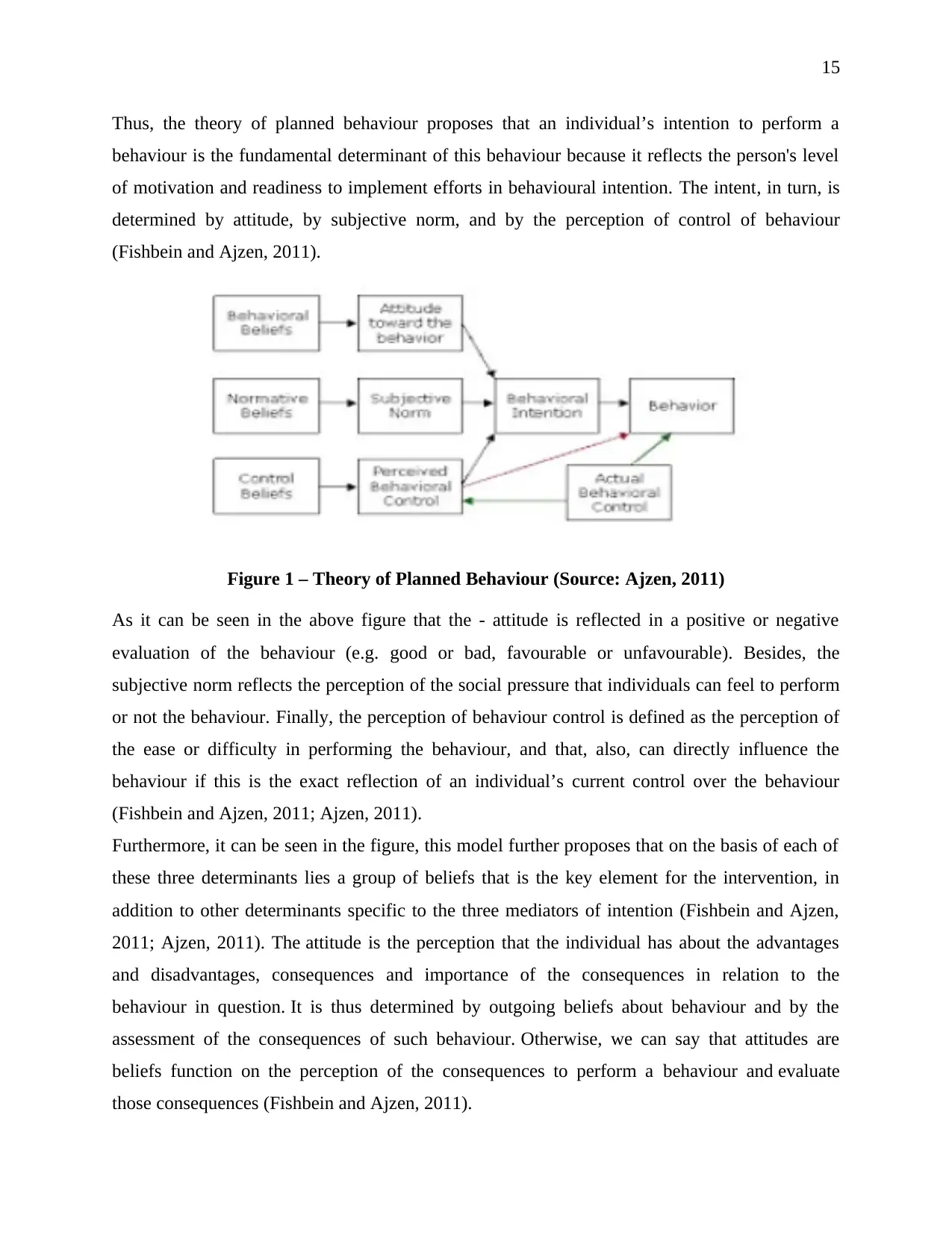
15
Thus, the theory of planned behaviour proposes that an individual’s intention to perform a
behaviour is the fundamental determinant of this behaviour because it reflects the person's level
of motivation and readiness to implement efforts in behavioural intention. The intent, in turn, is
determined by attitude, by subjective norm, and by the perception of control of behaviour
(Fishbein and Ajzen, 2011).
Figure 1 – Theory of Planned Behaviour (Source: Ajzen, 2011)
As it can be seen in the above figure that the - attitude is reflected in a positive or negative
evaluation of the behaviour (e.g. good or bad, favourable or unfavourable). Besides, the
subjective norm reflects the perception of the social pressure that individuals can feel to perform
or not the behaviour. Finally, the perception of behaviour control is defined as the perception of
the ease or difficulty in performing the behaviour, and that, also, can directly influence the
behaviour if this is the exact reflection of an individual’s current control over the behaviour
(Fishbein and Ajzen, 2011; Ajzen, 2011).
Furthermore, it can be seen in the figure, this model further proposes that on the basis of each of
these three determinants lies a group of beliefs that is the key element for the intervention, in
addition to other determinants specific to the three mediators of intention (Fishbein and Ajzen,
2011; Ajzen, 2011). The attitude is the perception that the individual has about the advantages
and disadvantages, consequences and importance of the consequences in relation to the
behaviour in question. It is thus determined by outgoing beliefs about behaviour and by the
assessment of the consequences of such behaviour. Otherwise, we can say that attitudes are
beliefs function on the perception of the consequences to perform a behaviour and evaluate
those consequences (Fishbein and Ajzen, 2011).
Thus, the theory of planned behaviour proposes that an individual’s intention to perform a
behaviour is the fundamental determinant of this behaviour because it reflects the person's level
of motivation and readiness to implement efforts in behavioural intention. The intent, in turn, is
determined by attitude, by subjective norm, and by the perception of control of behaviour
(Fishbein and Ajzen, 2011).
Figure 1 – Theory of Planned Behaviour (Source: Ajzen, 2011)
As it can be seen in the above figure that the - attitude is reflected in a positive or negative
evaluation of the behaviour (e.g. good or bad, favourable or unfavourable). Besides, the
subjective norm reflects the perception of the social pressure that individuals can feel to perform
or not the behaviour. Finally, the perception of behaviour control is defined as the perception of
the ease or difficulty in performing the behaviour, and that, also, can directly influence the
behaviour if this is the exact reflection of an individual’s current control over the behaviour
(Fishbein and Ajzen, 2011; Ajzen, 2011).
Furthermore, it can be seen in the figure, this model further proposes that on the basis of each of
these three determinants lies a group of beliefs that is the key element for the intervention, in
addition to other determinants specific to the three mediators of intention (Fishbein and Ajzen,
2011; Ajzen, 2011). The attitude is the perception that the individual has about the advantages
and disadvantages, consequences and importance of the consequences in relation to the
behaviour in question. It is thus determined by outgoing beliefs about behaviour and by the
assessment of the consequences of such behaviour. Otherwise, we can say that attitudes are
beliefs function on the perception of the consequences to perform a behaviour and evaluate
those consequences (Fishbein and Ajzen, 2011).
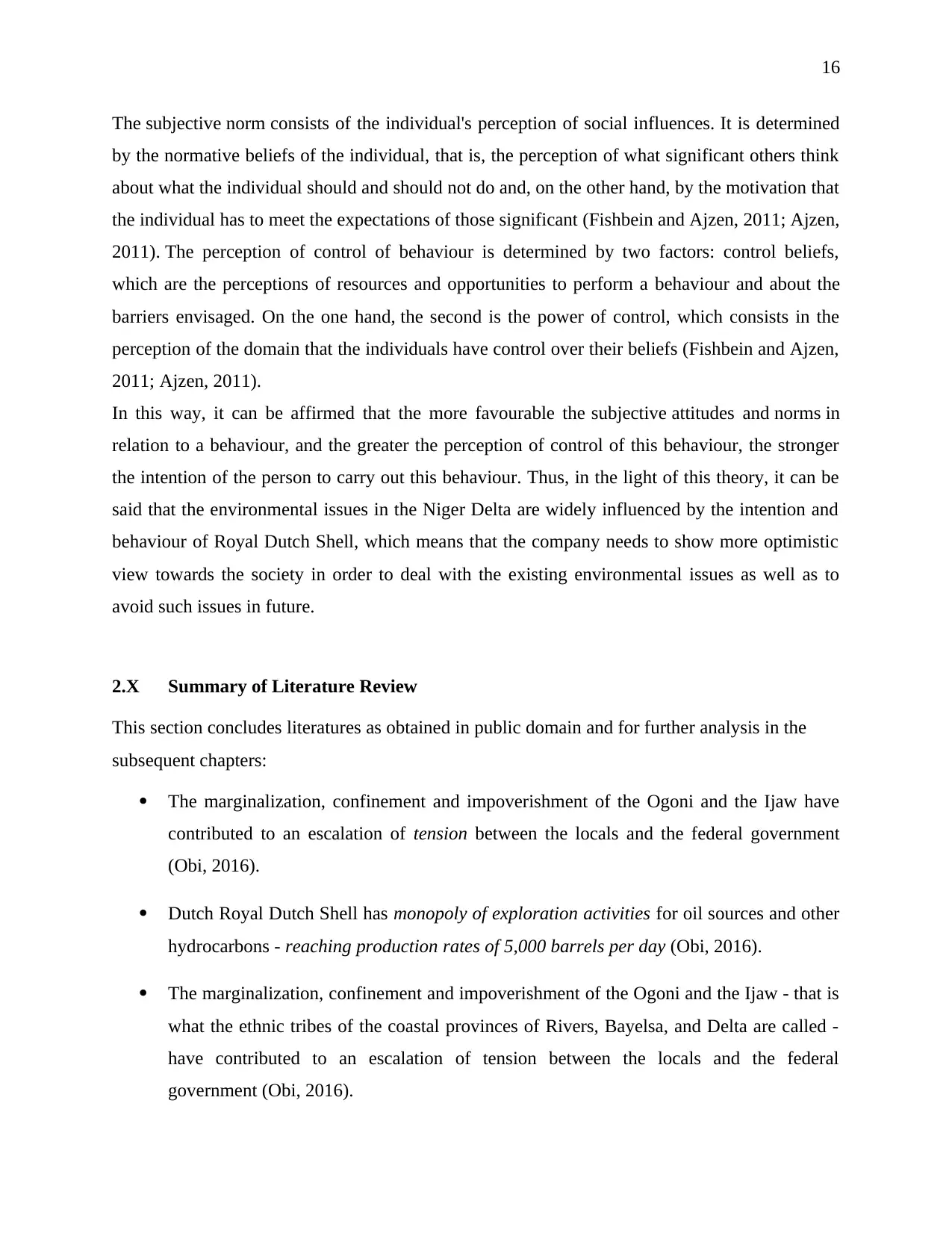
16
The subjective norm consists of the individual's perception of social influences. It is determined
by the normative beliefs of the individual, that is, the perception of what significant others think
about what the individual should and should not do and, on the other hand, by the motivation that
the individual has to meet the expectations of those significant (Fishbein and Ajzen, 2011; Ajzen,
2011). The perception of control of behaviour is determined by two factors: control beliefs,
which are the perceptions of resources and opportunities to perform a behaviour and about the
barriers envisaged. On the one hand, the second is the power of control, which consists in the
perception of the domain that the individuals have control over their beliefs (Fishbein and Ajzen,
2011; Ajzen, 2011).
In this way, it can be affirmed that the more favourable the subjective attitudes and norms in
relation to a behaviour, and the greater the perception of control of this behaviour, the stronger
the intention of the person to carry out this behaviour. Thus, in the light of this theory, it can be
said that the environmental issues in the Niger Delta are widely influenced by the intention and
behaviour of Royal Dutch Shell, which means that the company needs to show more optimistic
view towards the society in order to deal with the existing environmental issues as well as to
avoid such issues in future.
2.X Summary of Literature Review
This section concludes literatures as obtained in public domain and for further analysis in the
subsequent chapters:
The marginalization, confinement and impoverishment of the Ogoni and the Ijaw have
contributed to an escalation of tension between the locals and the federal government
(Obi, 2016).
Dutch Royal Dutch Shell has monopoly of exploration activities for oil sources and other
hydrocarbons - reaching production rates of 5,000 barrels per day (Obi, 2016).
The marginalization, confinement and impoverishment of the Ogoni and the Ijaw - that is
what the ethnic tribes of the coastal provinces of Rivers, Bayelsa, and Delta are called -
have contributed to an escalation of tension between the locals and the federal
government (Obi, 2016).
The subjective norm consists of the individual's perception of social influences. It is determined
by the normative beliefs of the individual, that is, the perception of what significant others think
about what the individual should and should not do and, on the other hand, by the motivation that
the individual has to meet the expectations of those significant (Fishbein and Ajzen, 2011; Ajzen,
2011). The perception of control of behaviour is determined by two factors: control beliefs,
which are the perceptions of resources and opportunities to perform a behaviour and about the
barriers envisaged. On the one hand, the second is the power of control, which consists in the
perception of the domain that the individuals have control over their beliefs (Fishbein and Ajzen,
2011; Ajzen, 2011).
In this way, it can be affirmed that the more favourable the subjective attitudes and norms in
relation to a behaviour, and the greater the perception of control of this behaviour, the stronger
the intention of the person to carry out this behaviour. Thus, in the light of this theory, it can be
said that the environmental issues in the Niger Delta are widely influenced by the intention and
behaviour of Royal Dutch Shell, which means that the company needs to show more optimistic
view towards the society in order to deal with the existing environmental issues as well as to
avoid such issues in future.
2.X Summary of Literature Review
This section concludes literatures as obtained in public domain and for further analysis in the
subsequent chapters:
The marginalization, confinement and impoverishment of the Ogoni and the Ijaw have
contributed to an escalation of tension between the locals and the federal government
(Obi, 2016).
Dutch Royal Dutch Shell has monopoly of exploration activities for oil sources and other
hydrocarbons - reaching production rates of 5,000 barrels per day (Obi, 2016).
The marginalization, confinement and impoverishment of the Ogoni and the Ijaw - that is
what the ethnic tribes of the coastal provinces of Rivers, Bayelsa, and Delta are called -
have contributed to an escalation of tension between the locals and the federal
government (Obi, 2016).
Secure Best Marks with AI Grader
Need help grading? Try our AI Grader for instant feedback on your assignments.
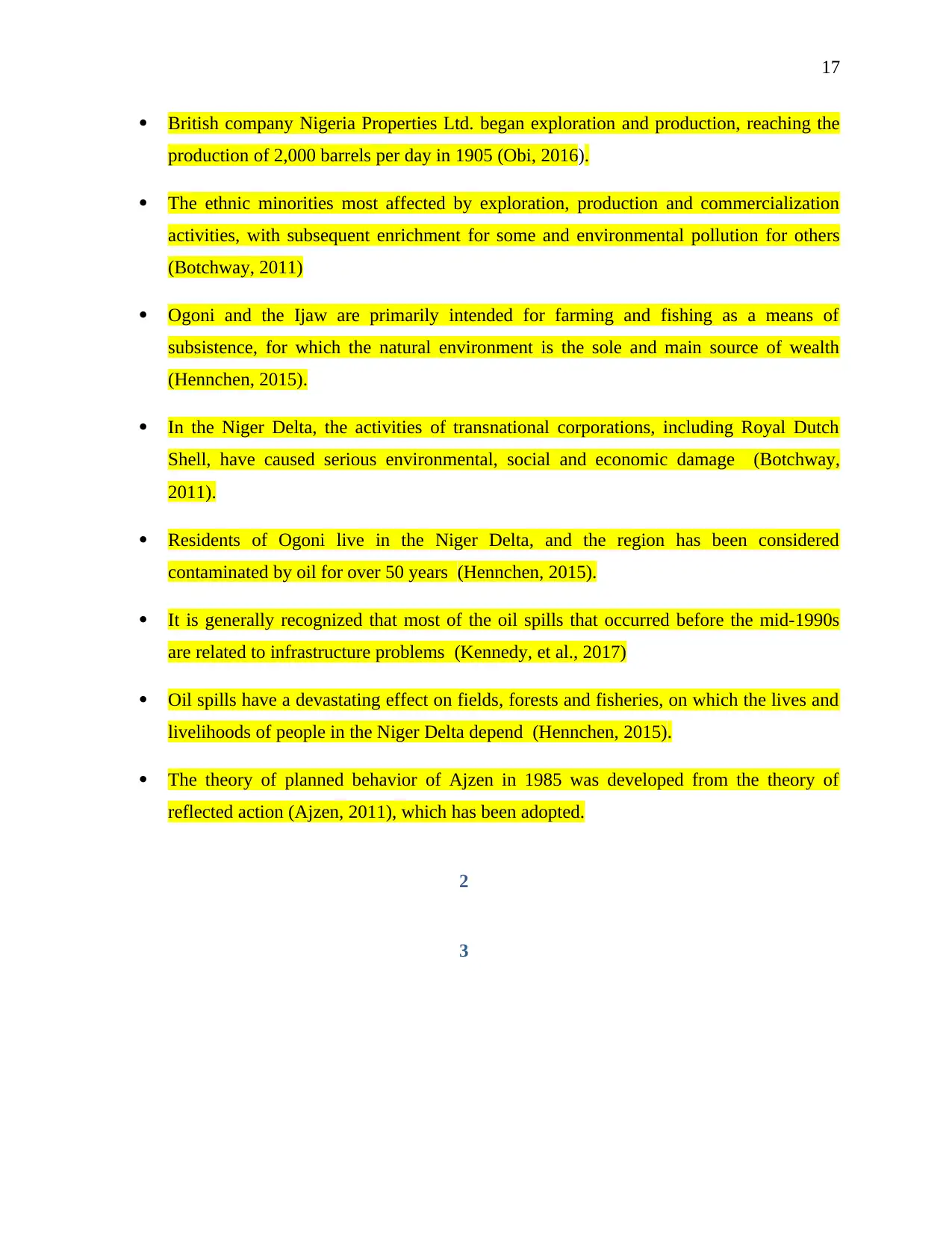
17
British company Nigeria Properties Ltd. began exploration and production, reaching the
production of 2,000 barrels per day in 1905 (Obi, 2016).
The ethnic minorities most affected by exploration, production and commercialization
activities, with subsequent enrichment for some and environmental pollution for others
(Botchway, 2011)
Ogoni and the Ijaw are primarily intended for farming and fishing as a means of
subsistence, for which the natural environment is the sole and main source of wealth
(Hennchen, 2015).
In the Niger Delta, the activities of transnational corporations, including Royal Dutch
Shell, have caused serious environmental, social and economic damage (Botchway,
2011).
Residents of Ogoni live in the Niger Delta, and the region has been considered
contaminated by oil for over 50 years (Hennchen, 2015).
It is generally recognized that most of the oil spills that occurred before the mid-1990s
are related to infrastructure problems (Kennedy, et al., 2017)
Oil spills have a devastating effect on fields, forests and fisheries, on which the lives and
livelihoods of people in the Niger Delta depend (Hennchen, 2015).
The theory of planned behavior of Ajzen in 1985 was developed from the theory of
reflected action (Ajzen, 2011), which has been adopted.
2
3
British company Nigeria Properties Ltd. began exploration and production, reaching the
production of 2,000 barrels per day in 1905 (Obi, 2016).
The ethnic minorities most affected by exploration, production and commercialization
activities, with subsequent enrichment for some and environmental pollution for others
(Botchway, 2011)
Ogoni and the Ijaw are primarily intended for farming and fishing as a means of
subsistence, for which the natural environment is the sole and main source of wealth
(Hennchen, 2015).
In the Niger Delta, the activities of transnational corporations, including Royal Dutch
Shell, have caused serious environmental, social and economic damage (Botchway,
2011).
Residents of Ogoni live in the Niger Delta, and the region has been considered
contaminated by oil for over 50 years (Hennchen, 2015).
It is generally recognized that most of the oil spills that occurred before the mid-1990s
are related to infrastructure problems (Kennedy, et al., 2017)
Oil spills have a devastating effect on fields, forests and fisheries, on which the lives and
livelihoods of people in the Niger Delta depend (Hennchen, 2015).
The theory of planned behavior of Ajzen in 1985 was developed from the theory of
reflected action (Ajzen, 2011), which has been adopted.
2
3
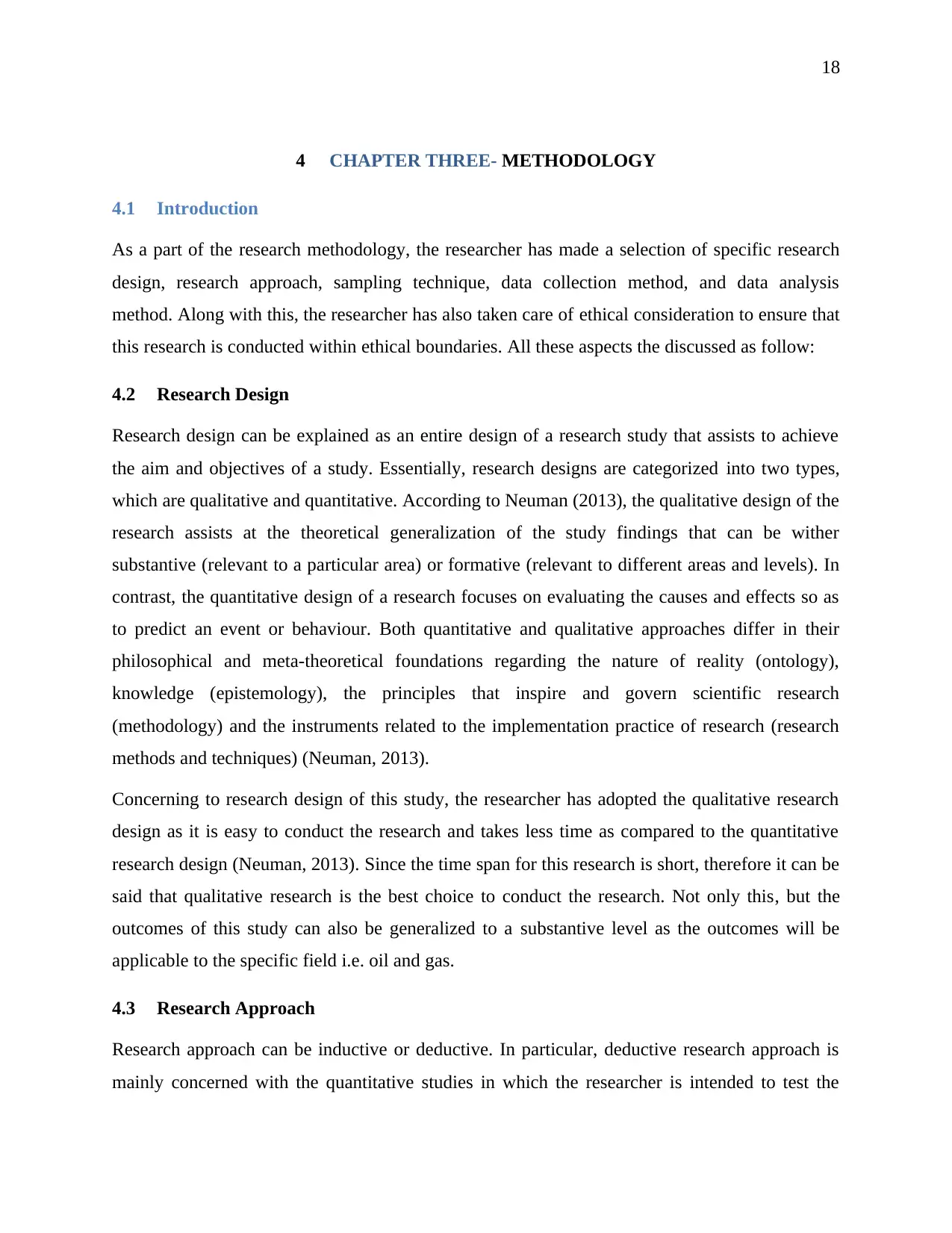
18
4 CHAPTER THREE- METHODOLOGY
4.1 Introduction
As a part of the research methodology, the researcher has made a selection of specific research
design, research approach, sampling technique, data collection method, and data analysis
method. Along with this, the researcher has also taken care of ethical consideration to ensure that
this research is conducted within ethical boundaries. All these aspects the discussed as follow:
4.2 Research Design
Research design can be explained as an entire design of a research study that assists to achieve
the aim and objectives of a study. Essentially, research designs are categorized into two types,
which are qualitative and quantitative. According to Neuman (2013), the qualitative design of the
research assists at the theoretical generalization of the study findings that can be wither
substantive (relevant to a particular area) or formative (relevant to different areas and levels). In
contrast, the quantitative design of a research focuses on evaluating the causes and effects so as
to predict an event or behaviour. Both quantitative and qualitative approaches differ in their
philosophical and meta-theoretical foundations regarding the nature of reality (ontology),
knowledge (epistemology), the principles that inspire and govern scientific research
(methodology) and the instruments related to the implementation practice of research (research
methods and techniques) (Neuman, 2013).
Concerning to research design of this study, the researcher has adopted the qualitative research
design as it is easy to conduct the research and takes less time as compared to the quantitative
research design (Neuman, 2013). Since the time span for this research is short, therefore it can be
said that qualitative research is the best choice to conduct the research. Not only this, but the
outcomes of this study can also be generalized to a substantive level as the outcomes will be
applicable to the specific field i.e. oil and gas.
4.3 Research Approach
Research approach can be inductive or deductive. In particular, deductive research approach is
mainly concerned with the quantitative studies in which the researcher is intended to test the
4 CHAPTER THREE- METHODOLOGY
4.1 Introduction
As a part of the research methodology, the researcher has made a selection of specific research
design, research approach, sampling technique, data collection method, and data analysis
method. Along with this, the researcher has also taken care of ethical consideration to ensure that
this research is conducted within ethical boundaries. All these aspects the discussed as follow:
4.2 Research Design
Research design can be explained as an entire design of a research study that assists to achieve
the aim and objectives of a study. Essentially, research designs are categorized into two types,
which are qualitative and quantitative. According to Neuman (2013), the qualitative design of the
research assists at the theoretical generalization of the study findings that can be wither
substantive (relevant to a particular area) or formative (relevant to different areas and levels). In
contrast, the quantitative design of a research focuses on evaluating the causes and effects so as
to predict an event or behaviour. Both quantitative and qualitative approaches differ in their
philosophical and meta-theoretical foundations regarding the nature of reality (ontology),
knowledge (epistemology), the principles that inspire and govern scientific research
(methodology) and the instruments related to the implementation practice of research (research
methods and techniques) (Neuman, 2013).
Concerning to research design of this study, the researcher has adopted the qualitative research
design as it is easy to conduct the research and takes less time as compared to the quantitative
research design (Neuman, 2013). Since the time span for this research is short, therefore it can be
said that qualitative research is the best choice to conduct the research. Not only this, but the
outcomes of this study can also be generalized to a substantive level as the outcomes will be
applicable to the specific field i.e. oil and gas.
4.3 Research Approach
Research approach can be inductive or deductive. In particular, deductive research approach is
mainly concerned with the quantitative studies in which the researcher is intended to test the
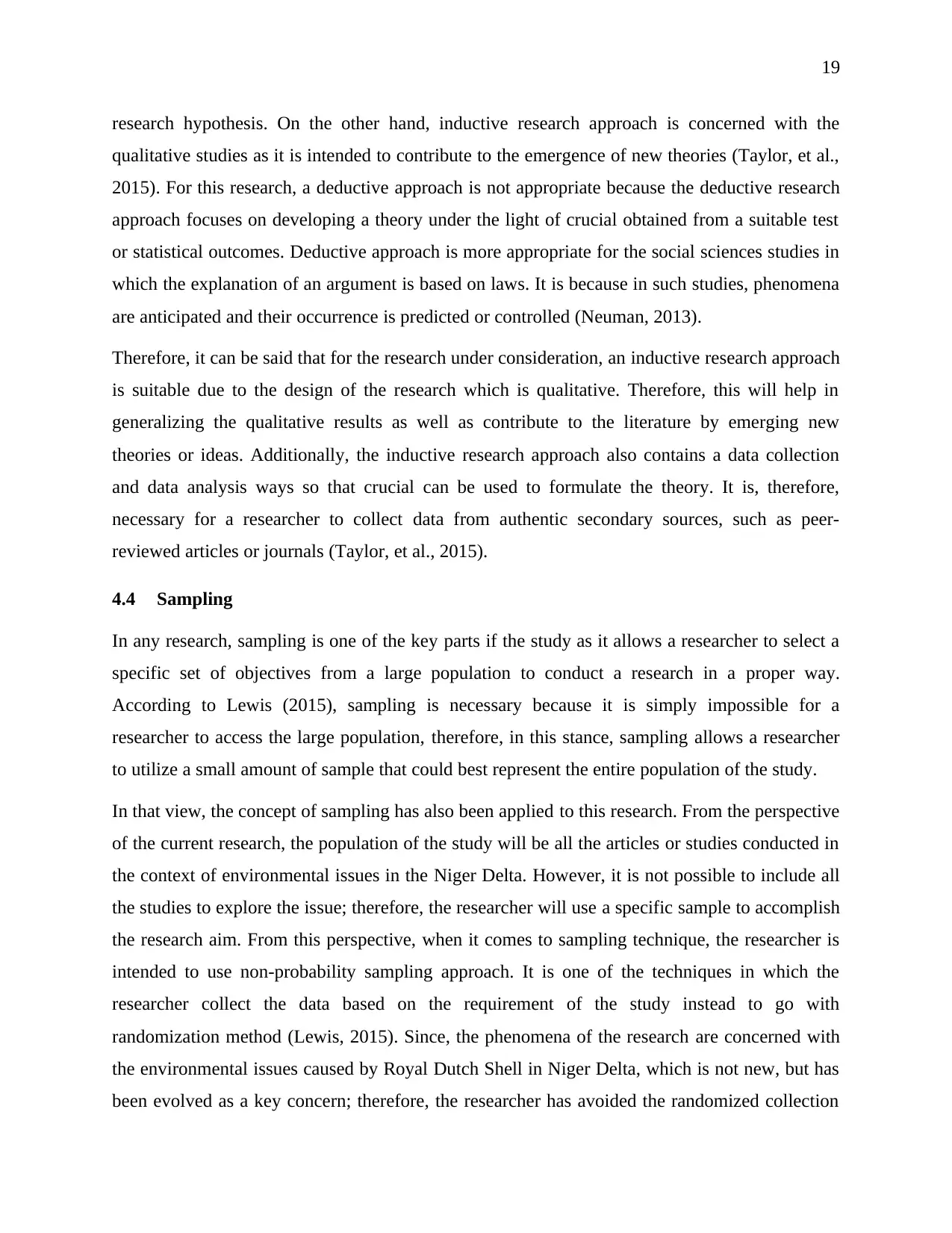
19
research hypothesis. On the other hand, inductive research approach is concerned with the
qualitative studies as it is intended to contribute to the emergence of new theories (Taylor, et al.,
2015). For this research, a deductive approach is not appropriate because the deductive research
approach focuses on developing a theory under the light of crucial obtained from a suitable test
or statistical outcomes. Deductive approach is more appropriate for the social sciences studies in
which the explanation of an argument is based on laws. It is because in such studies, phenomena
are anticipated and their occurrence is predicted or controlled (Neuman, 2013).
Therefore, it can be said that for the research under consideration, an inductive research approach
is suitable due to the design of the research which is qualitative. Therefore, this will help in
generalizing the qualitative results as well as contribute to the literature by emerging new
theories or ideas. Additionally, the inductive research approach also contains a data collection
and data analysis ways so that crucial can be used to formulate the theory. It is, therefore,
necessary for a researcher to collect data from authentic secondary sources, such as peer-
reviewed articles or journals (Taylor, et al., 2015).
4.4 Sampling
In any research, sampling is one of the key parts if the study as it allows a researcher to select a
specific set of objectives from a large population to conduct a research in a proper way.
According to Lewis (2015), sampling is necessary because it is simply impossible for a
researcher to access the large population, therefore, in this stance, sampling allows a researcher
to utilize a small amount of sample that could best represent the entire population of the study.
In that view, the concept of sampling has also been applied to this research. From the perspective
of the current research, the population of the study will be all the articles or studies conducted in
the context of environmental issues in the Niger Delta. However, it is not possible to include all
the studies to explore the issue; therefore, the researcher will use a specific sample to accomplish
the research aim. From this perspective, when it comes to sampling technique, the researcher is
intended to use non-probability sampling approach. It is one of the techniques in which the
researcher collect the data based on the requirement of the study instead to go with
randomization method (Lewis, 2015). Since, the phenomena of the research are concerned with
the environmental issues caused by Royal Dutch Shell in Niger Delta, which is not new, but has
been evolved as a key concern; therefore, the researcher has avoided the randomized collection
research hypothesis. On the other hand, inductive research approach is concerned with the
qualitative studies as it is intended to contribute to the emergence of new theories (Taylor, et al.,
2015). For this research, a deductive approach is not appropriate because the deductive research
approach focuses on developing a theory under the light of crucial obtained from a suitable test
or statistical outcomes. Deductive approach is more appropriate for the social sciences studies in
which the explanation of an argument is based on laws. It is because in such studies, phenomena
are anticipated and their occurrence is predicted or controlled (Neuman, 2013).
Therefore, it can be said that for the research under consideration, an inductive research approach
is suitable due to the design of the research which is qualitative. Therefore, this will help in
generalizing the qualitative results as well as contribute to the literature by emerging new
theories or ideas. Additionally, the inductive research approach also contains a data collection
and data analysis ways so that crucial can be used to formulate the theory. It is, therefore,
necessary for a researcher to collect data from authentic secondary sources, such as peer-
reviewed articles or journals (Taylor, et al., 2015).
4.4 Sampling
In any research, sampling is one of the key parts if the study as it allows a researcher to select a
specific set of objectives from a large population to conduct a research in a proper way.
According to Lewis (2015), sampling is necessary because it is simply impossible for a
researcher to access the large population, therefore, in this stance, sampling allows a researcher
to utilize a small amount of sample that could best represent the entire population of the study.
In that view, the concept of sampling has also been applied to this research. From the perspective
of the current research, the population of the study will be all the articles or studies conducted in
the context of environmental issues in the Niger Delta. However, it is not possible to include all
the studies to explore the issue; therefore, the researcher will use a specific sample to accomplish
the research aim. From this perspective, when it comes to sampling technique, the researcher is
intended to use non-probability sampling approach. It is one of the techniques in which the
researcher collect the data based on the requirement of the study instead to go with
randomization method (Lewis, 2015). Since, the phenomena of the research are concerned with
the environmental issues caused by Royal Dutch Shell in Niger Delta, which is not new, but has
been evolved as a key concern; therefore, the researcher has avoided the randomized collection
Paraphrase This Document
Need a fresh take? Get an instant paraphrase of this document with our AI Paraphraser
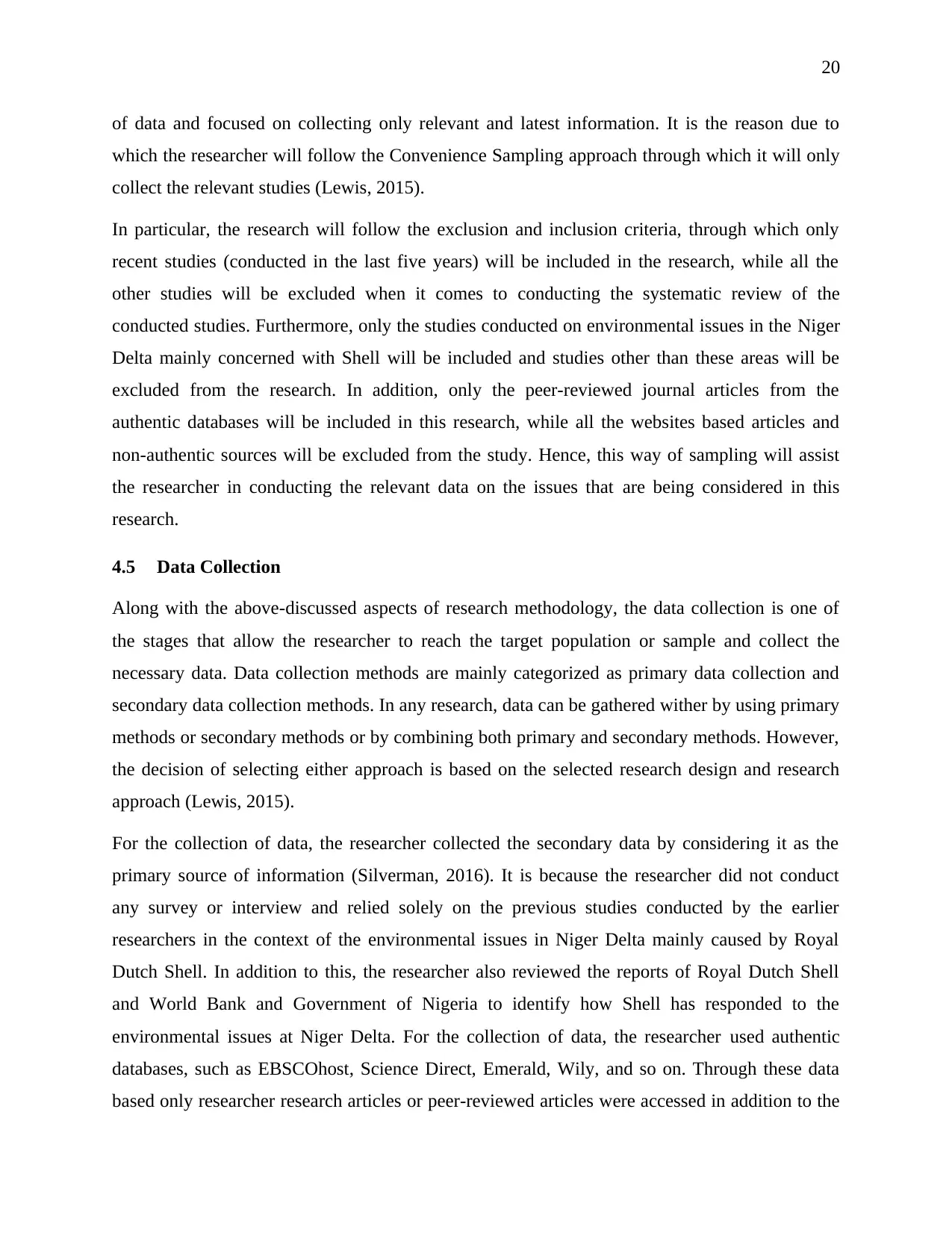
20
of data and focused on collecting only relevant and latest information. It is the reason due to
which the researcher will follow the Convenience Sampling approach through which it will only
collect the relevant studies (Lewis, 2015).
In particular, the research will follow the exclusion and inclusion criteria, through which only
recent studies (conducted in the last five years) will be included in the research, while all the
other studies will be excluded when it comes to conducting the systematic review of the
conducted studies. Furthermore, only the studies conducted on environmental issues in the Niger
Delta mainly concerned with Shell will be included and studies other than these areas will be
excluded from the research. In addition, only the peer-reviewed journal articles from the
authentic databases will be included in this research, while all the websites based articles and
non-authentic sources will be excluded from the study. Hence, this way of sampling will assist
the researcher in conducting the relevant data on the issues that are being considered in this
research.
4.5 Data Collection
Along with the above-discussed aspects of research methodology, the data collection is one of
the stages that allow the researcher to reach the target population or sample and collect the
necessary data. Data collection methods are mainly categorized as primary data collection and
secondary data collection methods. In any research, data can be gathered wither by using primary
methods or secondary methods or by combining both primary and secondary methods. However,
the decision of selecting either approach is based on the selected research design and research
approach (Lewis, 2015).
For the collection of data, the researcher collected the secondary data by considering it as the
primary source of information (Silverman, 2016). It is because the researcher did not conduct
any survey or interview and relied solely on the previous studies conducted by the earlier
researchers in the context of the environmental issues in Niger Delta mainly caused by Royal
Dutch Shell. In addition to this, the researcher also reviewed the reports of Royal Dutch Shell
and World Bank and Government of Nigeria to identify how Shell has responded to the
environmental issues at Niger Delta. For the collection of data, the researcher used authentic
databases, such as EBSCOhost, Science Direct, Emerald, Wily, and so on. Through these data
based only researcher research articles or peer-reviewed articles were accessed in addition to the
of data and focused on collecting only relevant and latest information. It is the reason due to
which the researcher will follow the Convenience Sampling approach through which it will only
collect the relevant studies (Lewis, 2015).
In particular, the research will follow the exclusion and inclusion criteria, through which only
recent studies (conducted in the last five years) will be included in the research, while all the
other studies will be excluded when it comes to conducting the systematic review of the
conducted studies. Furthermore, only the studies conducted on environmental issues in the Niger
Delta mainly concerned with Shell will be included and studies other than these areas will be
excluded from the research. In addition, only the peer-reviewed journal articles from the
authentic databases will be included in this research, while all the websites based articles and
non-authentic sources will be excluded from the study. Hence, this way of sampling will assist
the researcher in conducting the relevant data on the issues that are being considered in this
research.
4.5 Data Collection
Along with the above-discussed aspects of research methodology, the data collection is one of
the stages that allow the researcher to reach the target population or sample and collect the
necessary data. Data collection methods are mainly categorized as primary data collection and
secondary data collection methods. In any research, data can be gathered wither by using primary
methods or secondary methods or by combining both primary and secondary methods. However,
the decision of selecting either approach is based on the selected research design and research
approach (Lewis, 2015).
For the collection of data, the researcher collected the secondary data by considering it as the
primary source of information (Silverman, 2016). It is because the researcher did not conduct
any survey or interview and relied solely on the previous studies conducted by the earlier
researchers in the context of the environmental issues in Niger Delta mainly caused by Royal
Dutch Shell. In addition to this, the researcher also reviewed the reports of Royal Dutch Shell
and World Bank and Government of Nigeria to identify how Shell has responded to the
environmental issues at Niger Delta. For the collection of data, the researcher used authentic
databases, such as EBSCOhost, Science Direct, Emerald, Wily, and so on. Through these data
based only researcher research articles or peer-reviewed articles were accessed in addition to the
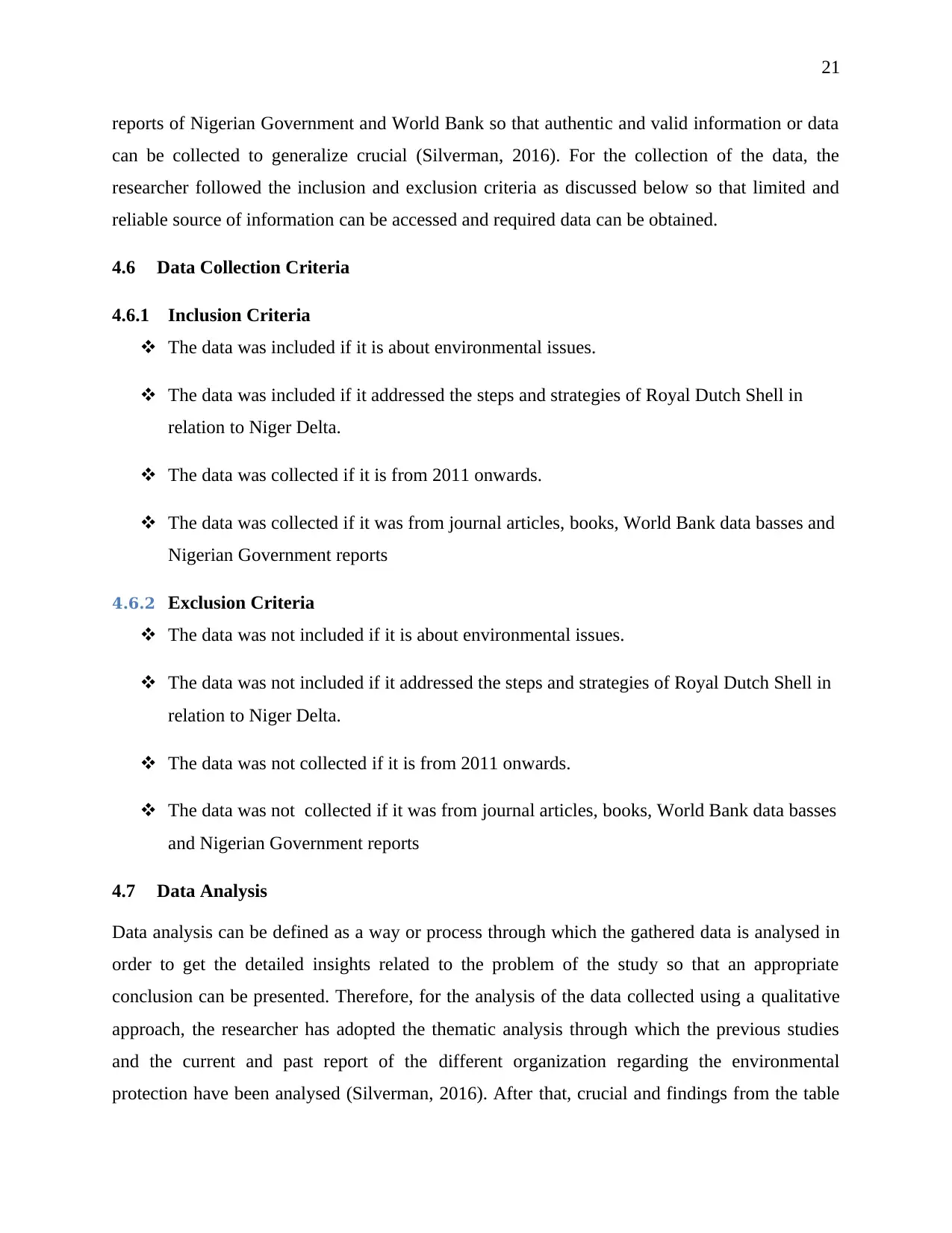
21
reports of Nigerian Government and World Bank so that authentic and valid information or data
can be collected to generalize crucial (Silverman, 2016). For the collection of the data, the
researcher followed the inclusion and exclusion criteria as discussed below so that limited and
reliable source of information can be accessed and required data can be obtained.
4.6 Data Collection Criteria
4.6.1 Inclusion Criteria
The data was included if it is about environmental issues.
The data was included if it addressed the steps and strategies of Royal Dutch Shell in
relation to Niger Delta.
The data was collected if it is from 2011 onwards.
The data was collected if it was from journal articles, books, World Bank data basses and
Nigerian Government reports
4.6.2 Exclusion Criteria
The data was not included if it is about environmental issues.
The data was not included if it addressed the steps and strategies of Royal Dutch Shell in
relation to Niger Delta.
The data was not collected if it is from 2011 onwards.
The data was not collected if it was from journal articles, books, World Bank data basses
and Nigerian Government reports
4.7 Data Analysis
Data analysis can be defined as a way or process through which the gathered data is analysed in
order to get the detailed insights related to the problem of the study so that an appropriate
conclusion can be presented. Therefore, for the analysis of the data collected using a qualitative
approach, the researcher has adopted the thematic analysis through which the previous studies
and the current and past report of the different organization regarding the environmental
protection have been analysed (Silverman, 2016). After that, crucial and findings from the table
reports of Nigerian Government and World Bank so that authentic and valid information or data
can be collected to generalize crucial (Silverman, 2016). For the collection of the data, the
researcher followed the inclusion and exclusion criteria as discussed below so that limited and
reliable source of information can be accessed and required data can be obtained.
4.6 Data Collection Criteria
4.6.1 Inclusion Criteria
The data was included if it is about environmental issues.
The data was included if it addressed the steps and strategies of Royal Dutch Shell in
relation to Niger Delta.
The data was collected if it is from 2011 onwards.
The data was collected if it was from journal articles, books, World Bank data basses and
Nigerian Government reports
4.6.2 Exclusion Criteria
The data was not included if it is about environmental issues.
The data was not included if it addressed the steps and strategies of Royal Dutch Shell in
relation to Niger Delta.
The data was not collected if it is from 2011 onwards.
The data was not collected if it was from journal articles, books, World Bank data basses
and Nigerian Government reports
4.7 Data Analysis
Data analysis can be defined as a way or process through which the gathered data is analysed in
order to get the detailed insights related to the problem of the study so that an appropriate
conclusion can be presented. Therefore, for the analysis of the data collected using a qualitative
approach, the researcher has adopted the thematic analysis through which the previous studies
and the current and past report of the different organization regarding the environmental
protection have been analysed (Silverman, 2016). After that, crucial and findings from the table
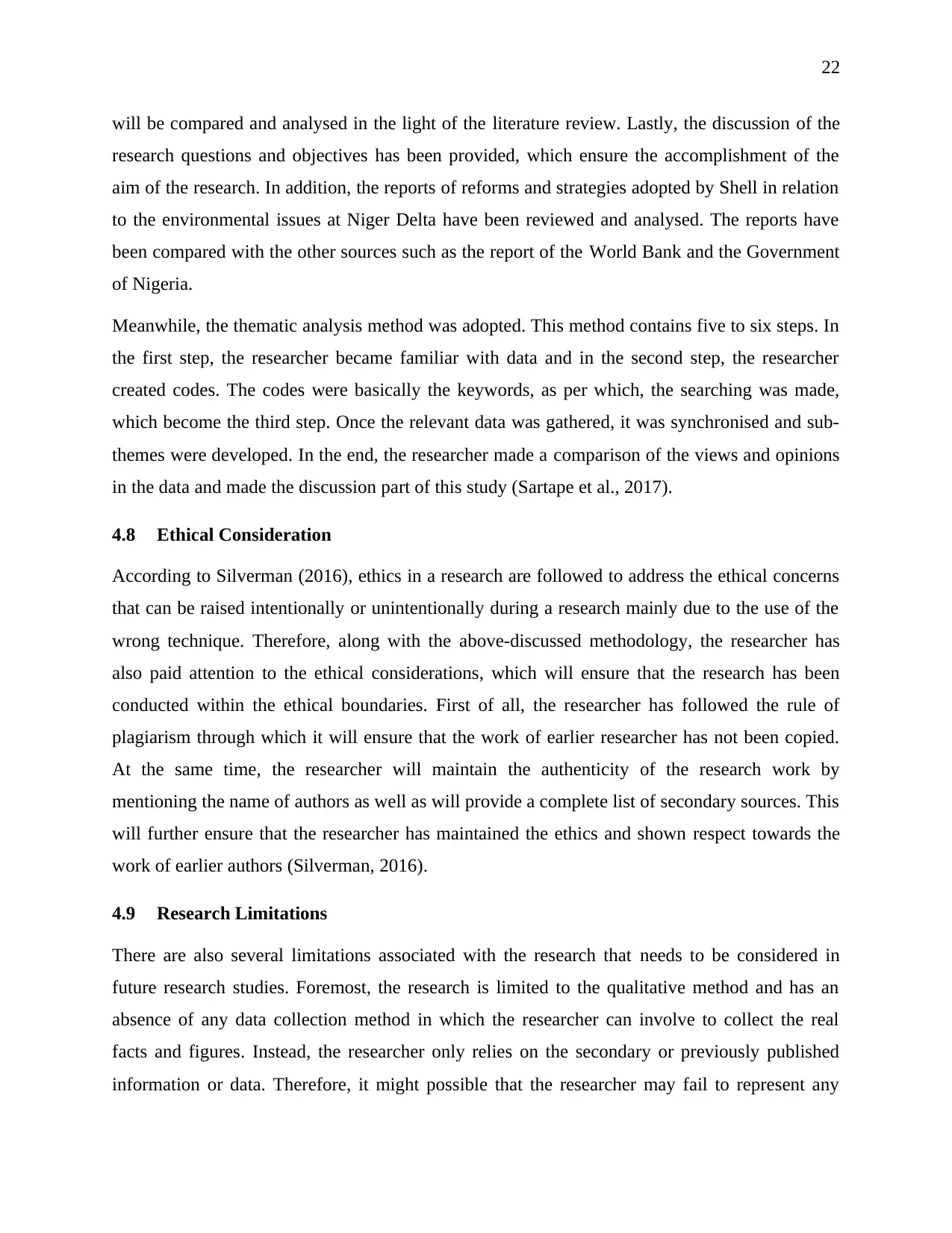
22
will be compared and analysed in the light of the literature review. Lastly, the discussion of the
research questions and objectives has been provided, which ensure the accomplishment of the
aim of the research. In addition, the reports of reforms and strategies adopted by Shell in relation
to the environmental issues at Niger Delta have been reviewed and analysed. The reports have
been compared with the other sources such as the report of the World Bank and the Government
of Nigeria.
Meanwhile, the thematic analysis method was adopted. This method contains five to six steps. In
the first step, the researcher became familiar with data and in the second step, the researcher
created codes. The codes were basically the keywords, as per which, the searching was made,
which become the third step. Once the relevant data was gathered, it was synchronised and sub-
themes were developed. In the end, the researcher made a comparison of the views and opinions
in the data and made the discussion part of this study (Sartape et al., 2017).
4.8 Ethical Consideration
According to Silverman (2016), ethics in a research are followed to address the ethical concerns
that can be raised intentionally or unintentionally during a research mainly due to the use of the
wrong technique. Therefore, along with the above-discussed methodology, the researcher has
also paid attention to the ethical considerations, which will ensure that the research has been
conducted within the ethical boundaries. First of all, the researcher has followed the rule of
plagiarism through which it will ensure that the work of earlier researcher has not been copied.
At the same time, the researcher will maintain the authenticity of the research work by
mentioning the name of authors as well as will provide a complete list of secondary sources. This
will further ensure that the researcher has maintained the ethics and shown respect towards the
work of earlier authors (Silverman, 2016).
4.9 Research Limitations
There are also several limitations associated with the research that needs to be considered in
future research studies. Foremost, the research is limited to the qualitative method and has an
absence of any data collection method in which the researcher can involve to collect the real
facts and figures. Instead, the researcher only relies on the secondary or previously published
information or data. Therefore, it might possible that the researcher may fail to represent any
will be compared and analysed in the light of the literature review. Lastly, the discussion of the
research questions and objectives has been provided, which ensure the accomplishment of the
aim of the research. In addition, the reports of reforms and strategies adopted by Shell in relation
to the environmental issues at Niger Delta have been reviewed and analysed. The reports have
been compared with the other sources such as the report of the World Bank and the Government
of Nigeria.
Meanwhile, the thematic analysis method was adopted. This method contains five to six steps. In
the first step, the researcher became familiar with data and in the second step, the researcher
created codes. The codes were basically the keywords, as per which, the searching was made,
which become the third step. Once the relevant data was gathered, it was synchronised and sub-
themes were developed. In the end, the researcher made a comparison of the views and opinions
in the data and made the discussion part of this study (Sartape et al., 2017).
4.8 Ethical Consideration
According to Silverman (2016), ethics in a research are followed to address the ethical concerns
that can be raised intentionally or unintentionally during a research mainly due to the use of the
wrong technique. Therefore, along with the above-discussed methodology, the researcher has
also paid attention to the ethical considerations, which will ensure that the research has been
conducted within the ethical boundaries. First of all, the researcher has followed the rule of
plagiarism through which it will ensure that the work of earlier researcher has not been copied.
At the same time, the researcher will maintain the authenticity of the research work by
mentioning the name of authors as well as will provide a complete list of secondary sources. This
will further ensure that the researcher has maintained the ethics and shown respect towards the
work of earlier authors (Silverman, 2016).
4.9 Research Limitations
There are also several limitations associated with the research that needs to be considered in
future research studies. Foremost, the research is limited to the qualitative method and has an
absence of any data collection method in which the researcher can involve to collect the real
facts and figures. Instead, the researcher only relies on the secondary or previously published
information or data. Therefore, it might possible that the researcher may fail to represent any
Secure Best Marks with AI Grader
Need help grading? Try our AI Grader for instant feedback on your assignments.
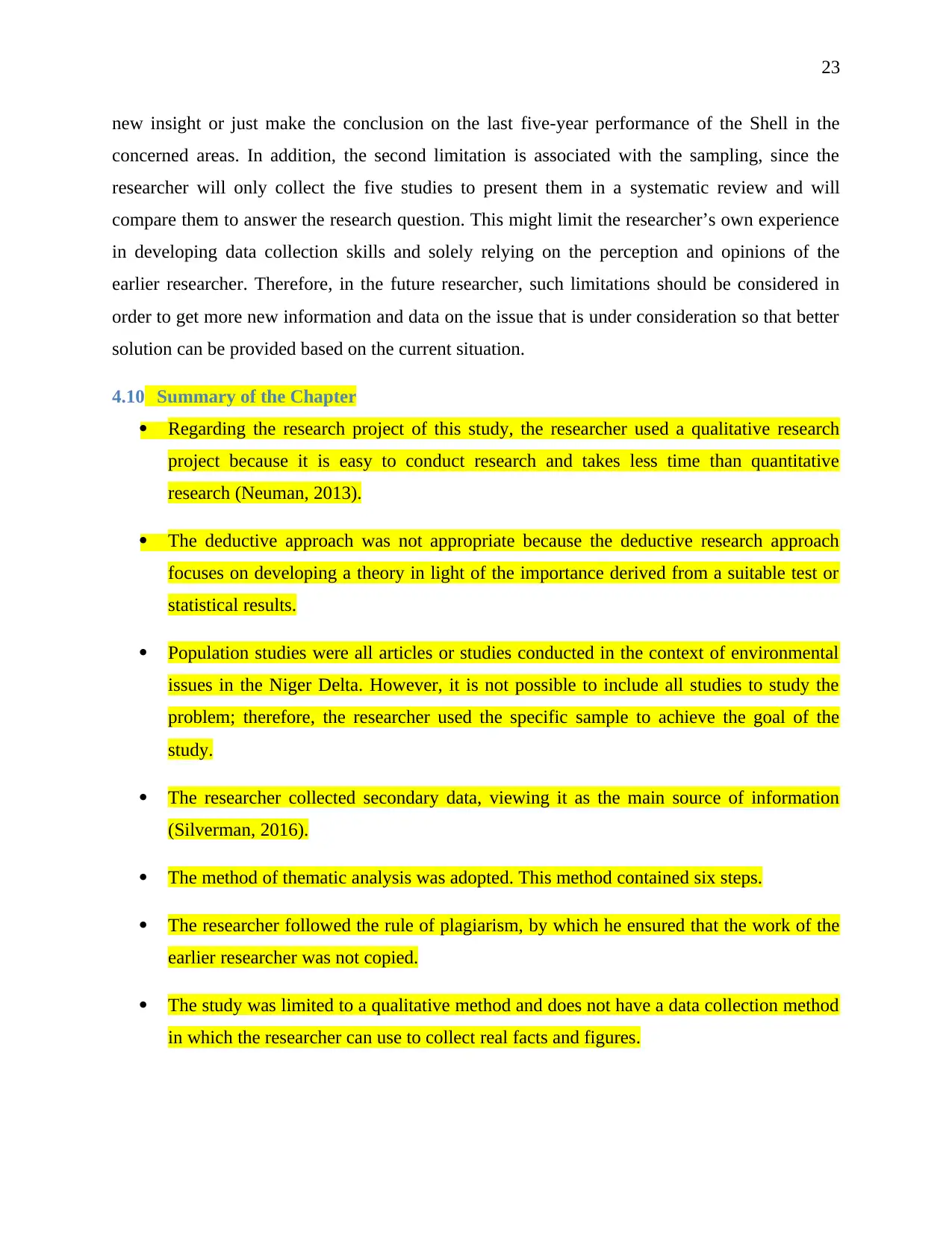
23
new insight or just make the conclusion on the last five-year performance of the Shell in the
concerned areas. In addition, the second limitation is associated with the sampling, since the
researcher will only collect the five studies to present them in a systematic review and will
compare them to answer the research question. This might limit the researcher’s own experience
in developing data collection skills and solely relying on the perception and opinions of the
earlier researcher. Therefore, in the future researcher, such limitations should be considered in
order to get more new information and data on the issue that is under consideration so that better
solution can be provided based on the current situation.
4.10 Summary of the Chapter
Regarding the research project of this study, the researcher used a qualitative research
project because it is easy to conduct research and takes less time than quantitative
research (Neuman, 2013).
The deductive approach was not appropriate because the deductive research approach
focuses on developing a theory in light of the importance derived from a suitable test or
statistical results.
Population studies were all articles or studies conducted in the context of environmental
issues in the Niger Delta. However, it is not possible to include all studies to study the
problem; therefore, the researcher used the specific sample to achieve the goal of the
study.
The researcher collected secondary data, viewing it as the main source of information
(Silverman, 2016).
The method of thematic analysis was adopted. This method contained six steps.
The researcher followed the rule of plagiarism, by which he ensured that the work of the
earlier researcher was not copied.
The study was limited to a qualitative method and does not have a data collection method
in which the researcher can use to collect real facts and figures.
new insight or just make the conclusion on the last five-year performance of the Shell in the
concerned areas. In addition, the second limitation is associated with the sampling, since the
researcher will only collect the five studies to present them in a systematic review and will
compare them to answer the research question. This might limit the researcher’s own experience
in developing data collection skills and solely relying on the perception and opinions of the
earlier researcher. Therefore, in the future researcher, such limitations should be considered in
order to get more new information and data on the issue that is under consideration so that better
solution can be provided based on the current situation.
4.10 Summary of the Chapter
Regarding the research project of this study, the researcher used a qualitative research
project because it is easy to conduct research and takes less time than quantitative
research (Neuman, 2013).
The deductive approach was not appropriate because the deductive research approach
focuses on developing a theory in light of the importance derived from a suitable test or
statistical results.
Population studies were all articles or studies conducted in the context of environmental
issues in the Niger Delta. However, it is not possible to include all studies to study the
problem; therefore, the researcher used the specific sample to achieve the goal of the
study.
The researcher collected secondary data, viewing it as the main source of information
(Silverman, 2016).
The method of thematic analysis was adopted. This method contained six steps.
The researcher followed the rule of plagiarism, by which he ensured that the work of the
earlier researcher was not copied.
The study was limited to a qualitative method and does not have a data collection method
in which the researcher can use to collect real facts and figures.
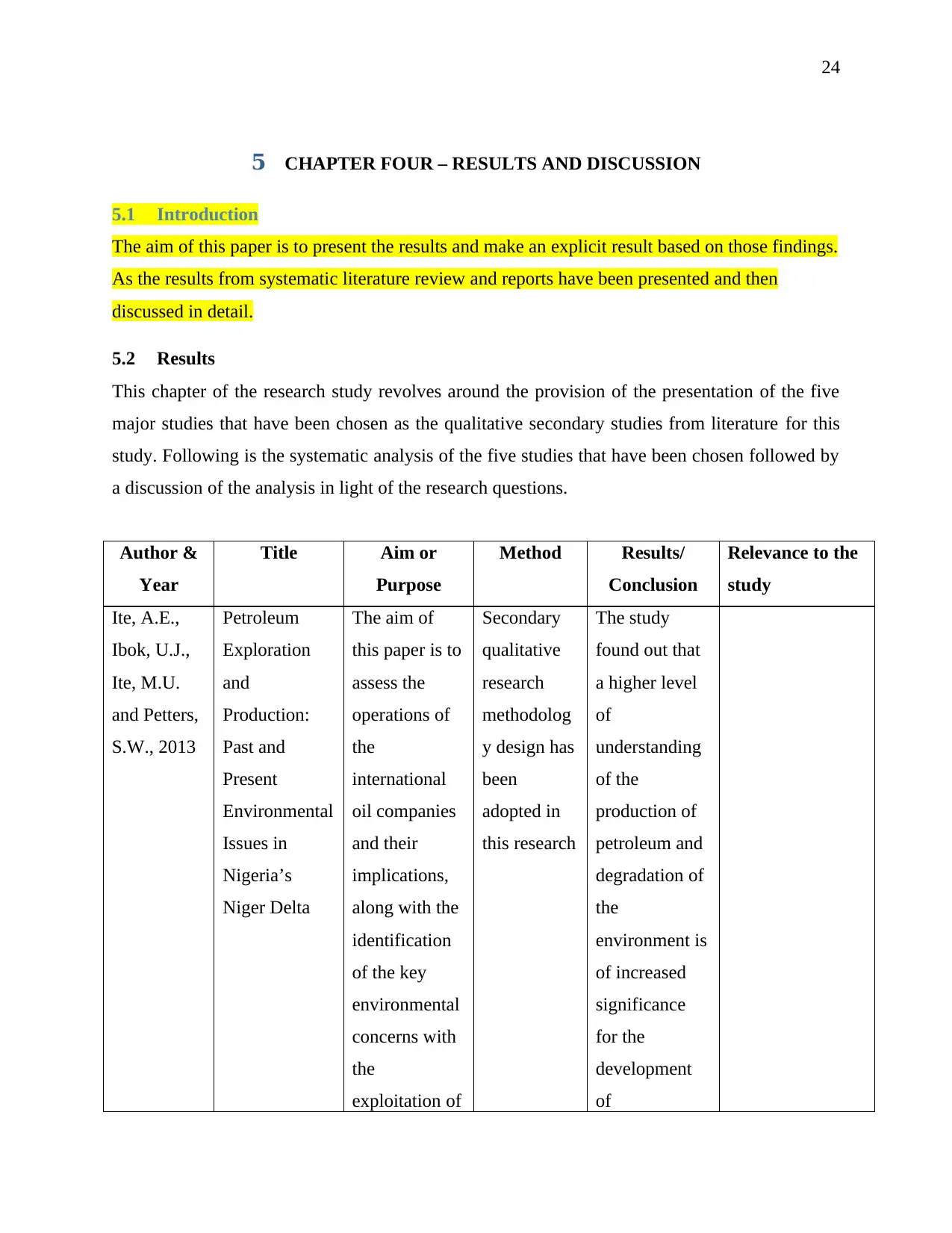
24
5 CHAPTER FOUR – RESULTS AND DISCUSSION
5.1 Introduction
The aim of this paper is to present the results and make an explicit result based on those findings.
As the results from systematic literature review and reports have been presented and then
discussed in detail.
5.2 Results
This chapter of the research study revolves around the provision of the presentation of the five
major studies that have been chosen as the qualitative secondary studies from literature for this
study. Following is the systematic analysis of the five studies that have been chosen followed by
a discussion of the analysis in light of the research questions.
Author &
Year
Title Aim or
Purpose
Method Results/
Conclusion
Relevance to the
study
Ite, A.E.,
Ibok, U.J.,
Ite, M.U.
and Petters,
S.W., 2013
Petroleum
Exploration
and
Production:
Past and
Present
Environmental
Issues in
Nigeria’s
Niger Delta
The aim of
this paper is to
assess the
operations of
the
international
oil companies
and their
implications,
along with the
identification
of the key
environmental
concerns with
the
exploitation of
Secondary
qualitative
research
methodolog
y design has
been
adopted in
this research
The study
found out that
a higher level
of
understanding
of the
production of
petroleum and
degradation of
the
environment is
of increased
significance
for the
development
of
5 CHAPTER FOUR – RESULTS AND DISCUSSION
5.1 Introduction
The aim of this paper is to present the results and make an explicit result based on those findings.
As the results from systematic literature review and reports have been presented and then
discussed in detail.
5.2 Results
This chapter of the research study revolves around the provision of the presentation of the five
major studies that have been chosen as the qualitative secondary studies from literature for this
study. Following is the systematic analysis of the five studies that have been chosen followed by
a discussion of the analysis in light of the research questions.
Author &
Year
Title Aim or
Purpose
Method Results/
Conclusion
Relevance to the
study
Ite, A.E.,
Ibok, U.J.,
Ite, M.U.
and Petters,
S.W., 2013
Petroleum
Exploration
and
Production:
Past and
Present
Environmental
Issues in
Nigeria’s
Niger Delta
The aim of
this paper is to
assess the
operations of
the
international
oil companies
and their
implications,
along with the
identification
of the key
environmental
concerns with
the
exploitation of
Secondary
qualitative
research
methodolog
y design has
been
adopted in
this research
The study
found out that
a higher level
of
understanding
of the
production of
petroleum and
degradation of
the
environment is
of increased
significance
for the
development
of
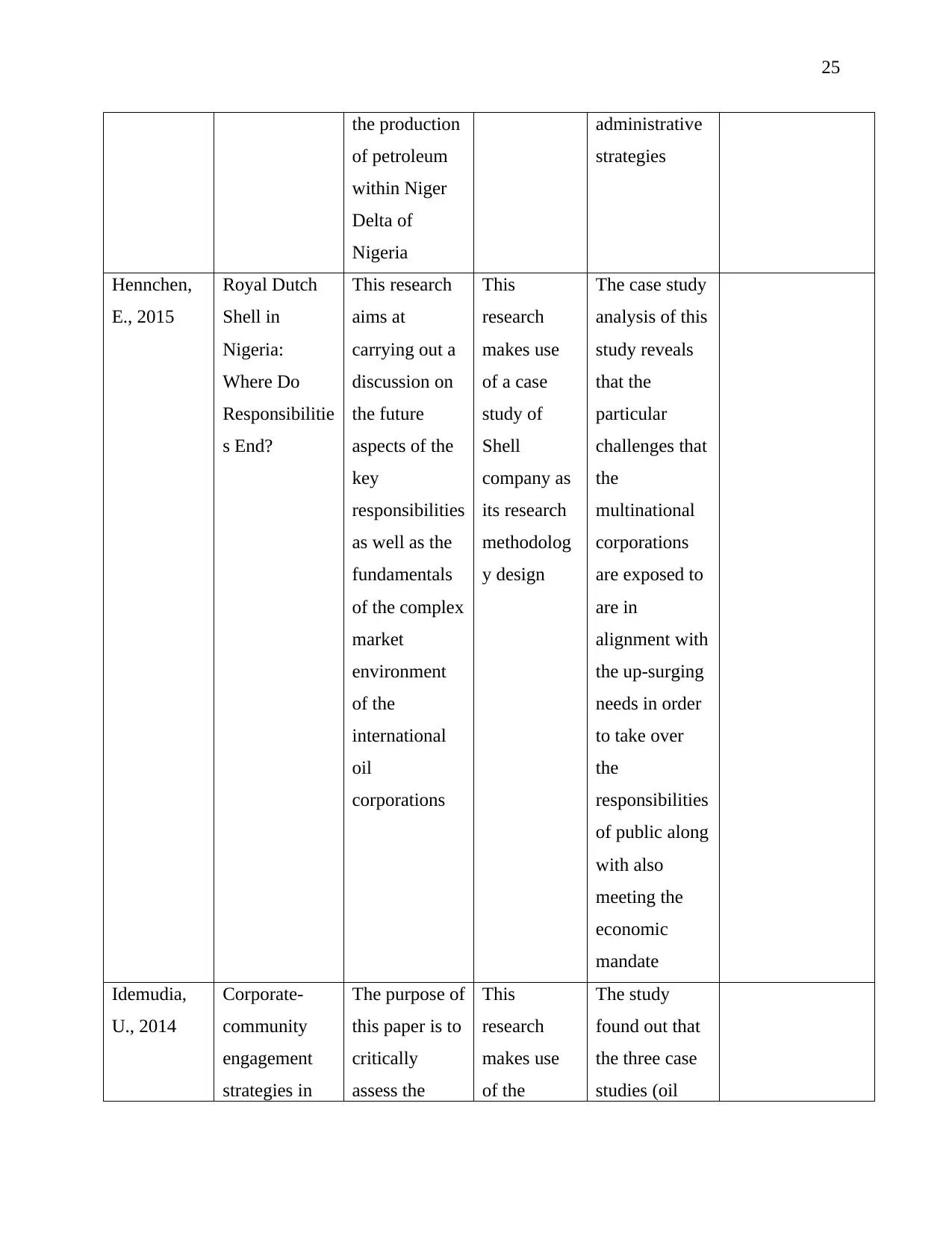
25
the production
of petroleum
within Niger
Delta of
Nigeria
administrative
strategies
Hennchen,
E., 2015
Royal Dutch
Shell in
Nigeria:
Where Do
Responsibilitie
s End?
This research
aims at
carrying out a
discussion on
the future
aspects of the
key
responsibilities
as well as the
fundamentals
of the complex
market
environment
of the
international
oil
corporations
This
research
makes use
of a case
study of
Shell
company as
its research
methodolog
y design
The case study
analysis of this
study reveals
that the
particular
challenges that
the
multinational
corporations
are exposed to
are in
alignment with
the up-surging
needs in order
to take over
the
responsibilities
of public along
with also
meeting the
economic
mandate
Idemudia,
U., 2014
Corporate-
community
engagement
strategies in
The purpose of
this paper is to
critically
assess the
This
research
makes use
of the
The study
found out that
the three case
studies (oil
the production
of petroleum
within Niger
Delta of
Nigeria
administrative
strategies
Hennchen,
E., 2015
Royal Dutch
Shell in
Nigeria:
Where Do
Responsibilitie
s End?
This research
aims at
carrying out a
discussion on
the future
aspects of the
key
responsibilities
as well as the
fundamentals
of the complex
market
environment
of the
international
oil
corporations
This
research
makes use
of a case
study of
Shell
company as
its research
methodolog
y design
The case study
analysis of this
study reveals
that the
particular
challenges that
the
multinational
corporations
are exposed to
are in
alignment with
the up-surging
needs in order
to take over
the
responsibilities
of public along
with also
meeting the
economic
mandate
Idemudia,
U., 2014
Corporate-
community
engagement
strategies in
The purpose of
this paper is to
critically
assess the
This
research
makes use
of the
The study
found out that
the three case
studies (oil
Paraphrase This Document
Need a fresh take? Get an instant paraphrase of this document with our AI Paraphraser
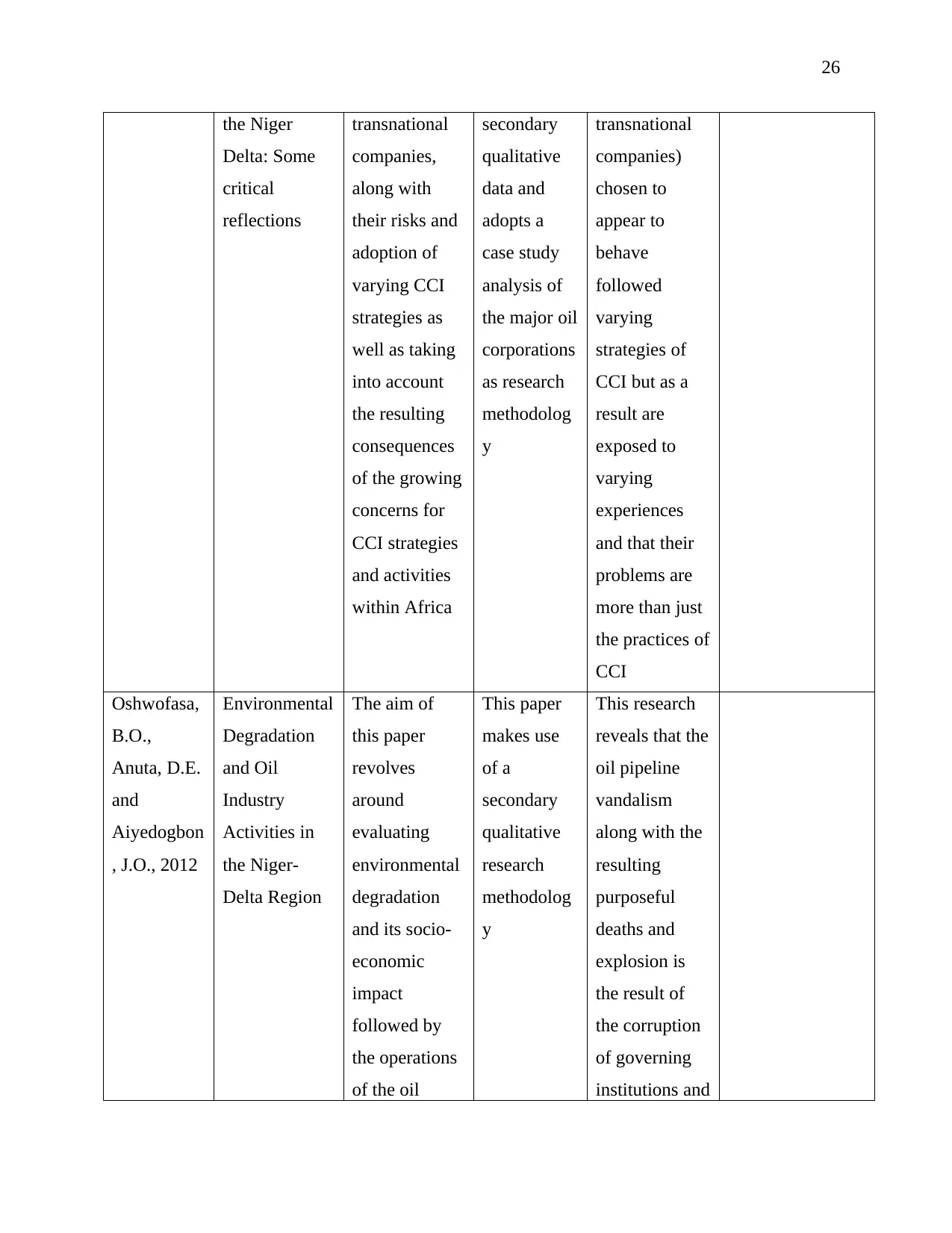
26
the Niger
Delta: Some
critical
reflections
transnational
companies,
along with
their risks and
adoption of
varying CCI
strategies as
well as taking
into account
the resulting
consequences
of the growing
concerns for
CCI strategies
and activities
within Africa
secondary
qualitative
data and
adopts a
case study
analysis of
the major oil
corporations
as research
methodolog
y
transnational
companies)
chosen to
appear to
behave
followed
varying
strategies of
CCI but as a
result are
exposed to
varying
experiences
and that their
problems are
more than just
the practices of
CCI
Oshwofasa,
B.O.,
Anuta, D.E.
and
Aiyedogbon
, J.O., 2012
Environmental
Degradation
and Oil
Industry
Activities in
the Niger-
Delta Region
The aim of
this paper
revolves
around
evaluating
environmental
degradation
and its socio-
economic
impact
followed by
the operations
of the oil
This paper
makes use
of a
secondary
qualitative
research
methodolog
y
This research
reveals that the
oil pipeline
vandalism
along with the
resulting
purposeful
deaths and
explosion is
the result of
the corruption
of governing
institutions and
the Niger
Delta: Some
critical
reflections
transnational
companies,
along with
their risks and
adoption of
varying CCI
strategies as
well as taking
into account
the resulting
consequences
of the growing
concerns for
CCI strategies
and activities
within Africa
secondary
qualitative
data and
adopts a
case study
analysis of
the major oil
corporations
as research
methodolog
y
transnational
companies)
chosen to
appear to
behave
followed
varying
strategies of
CCI but as a
result are
exposed to
varying
experiences
and that their
problems are
more than just
the practices of
CCI
Oshwofasa,
B.O.,
Anuta, D.E.
and
Aiyedogbon
, J.O., 2012
Environmental
Degradation
and Oil
Industry
Activities in
the Niger-
Delta Region
The aim of
this paper
revolves
around
evaluating
environmental
degradation
and its socio-
economic
impact
followed by
the operations
of the oil
This paper
makes use
of a
secondary
qualitative
research
methodolog
y
This research
reveals that the
oil pipeline
vandalism
along with the
resulting
purposeful
deaths and
explosion is
the result of
the corruption
of governing
institutions and
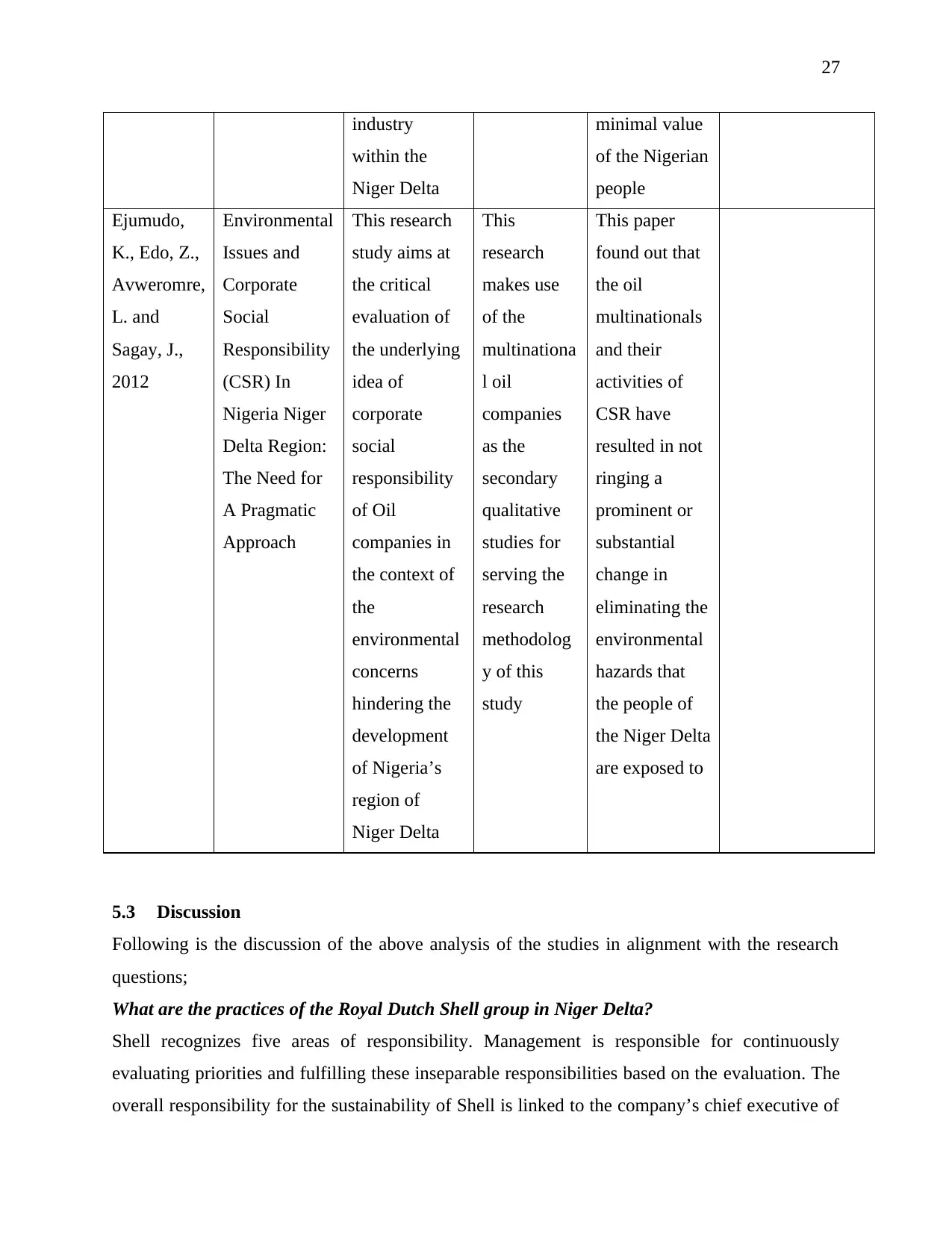
27
industry
within the
Niger Delta
minimal value
of the Nigerian
people
Ejumudo,
K., Edo, Z.,
Avweromre,
L. and
Sagay, J.,
2012
Environmental
Issues and
Corporate
Social
Responsibility
(CSR) In
Nigeria Niger
Delta Region:
The Need for
A Pragmatic
Approach
This research
study aims at
the critical
evaluation of
the underlying
idea of
corporate
social
responsibility
of Oil
companies in
the context of
the
environmental
concerns
hindering the
development
of Nigeria’s
region of
Niger Delta
This
research
makes use
of the
multinationa
l oil
companies
as the
secondary
qualitative
studies for
serving the
research
methodolog
y of this
study
This paper
found out that
the oil
multinationals
and their
activities of
CSR have
resulted in not
ringing a
prominent or
substantial
change in
eliminating the
environmental
hazards that
the people of
the Niger Delta
are exposed to
5.3 Discussion
Following is the discussion of the above analysis of the studies in alignment with the research
questions;
What are the practices of the Royal Dutch Shell group in Niger Delta?
Shell recognizes five areas of responsibility. Management is responsible for continuously
evaluating priorities and fulfilling these inseparable responsibilities based on the evaluation. The
overall responsibility for the sustainability of Shell is linked to the company’s chief executive of
industry
within the
Niger Delta
minimal value
of the Nigerian
people
Ejumudo,
K., Edo, Z.,
Avweromre,
L. and
Sagay, J.,
2012
Environmental
Issues and
Corporate
Social
Responsibility
(CSR) In
Nigeria Niger
Delta Region:
The Need for
A Pragmatic
Approach
This research
study aims at
the critical
evaluation of
the underlying
idea of
corporate
social
responsibility
of Oil
companies in
the context of
the
environmental
concerns
hindering the
development
of Nigeria’s
region of
Niger Delta
This
research
makes use
of the
multinationa
l oil
companies
as the
secondary
qualitative
studies for
serving the
research
methodolog
y of this
study
This paper
found out that
the oil
multinationals
and their
activities of
CSR have
resulted in not
ringing a
prominent or
substantial
change in
eliminating the
environmental
hazards that
the people of
the Niger Delta
are exposed to
5.3 Discussion
Following is the discussion of the above analysis of the studies in alignment with the research
questions;
What are the practices of the Royal Dutch Shell group in Niger Delta?
Shell recognizes five areas of responsibility. Management is responsible for continuously
evaluating priorities and fulfilling these inseparable responsibilities based on the evaluation. The
overall responsibility for the sustainability of Shell is linked to the company’s chief executive of
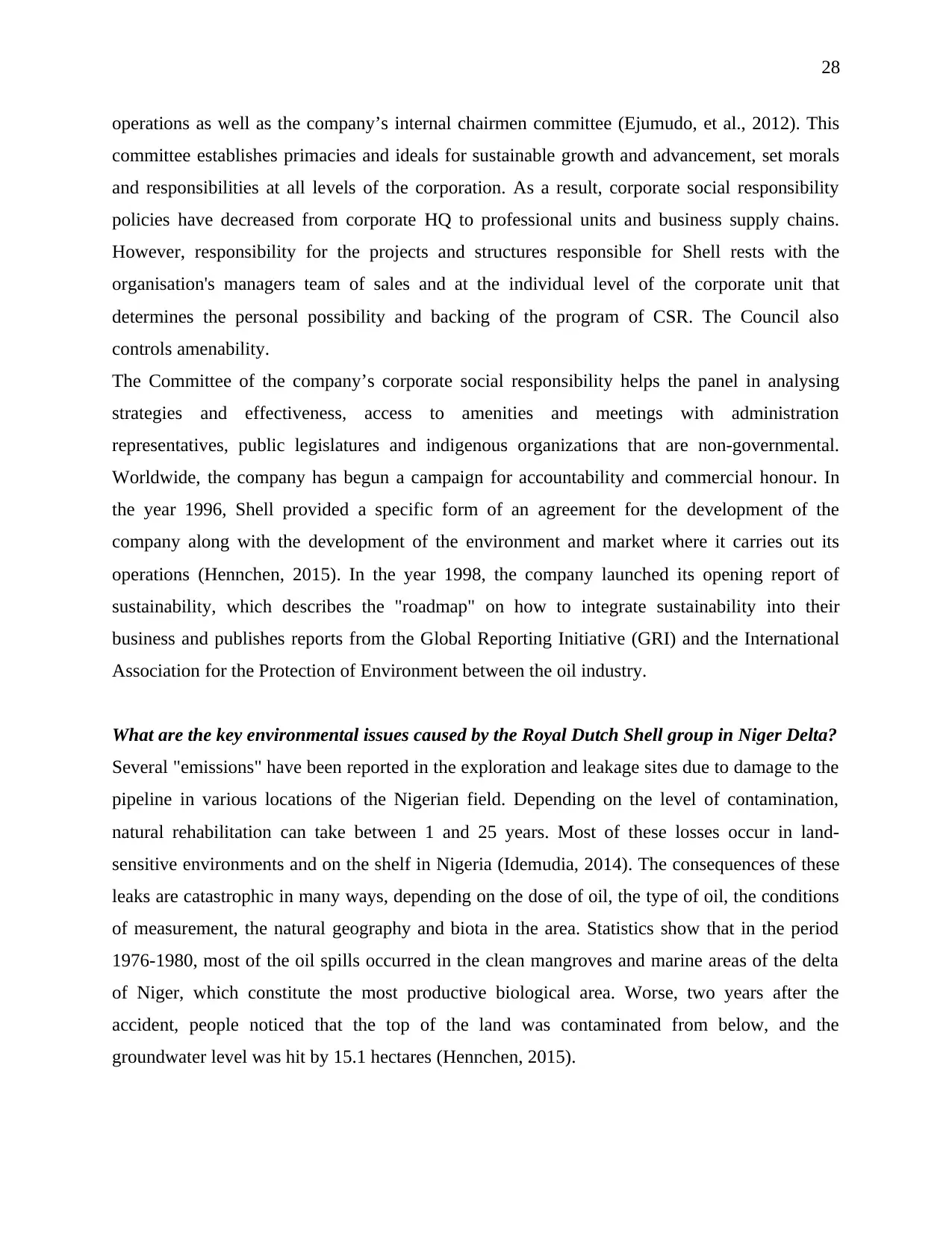
28
operations as well as the company’s internal chairmen committee (Ejumudo, et al., 2012). This
committee establishes primacies and ideals for sustainable growth and advancement, set morals
and responsibilities at all levels of the corporation. As a result, corporate social responsibility
policies have decreased from corporate HQ to professional units and business supply chains.
However, responsibility for the projects and structures responsible for Shell rests with the
organisation's managers team of sales and at the individual level of the corporate unit that
determines the personal possibility and backing of the program of CSR. The Council also
controls amenability.
The Committee of the company’s corporate social responsibility helps the panel in analysing
strategies and effectiveness, access to amenities and meetings with administration
representatives, public legislatures and indigenous organizations that are non-governmental.
Worldwide, the company has begun a campaign for accountability and commercial honour. In
the year 1996, Shell provided a specific form of an agreement for the development of the
company along with the development of the environment and market where it carries out its
operations (Hennchen, 2015). In the year 1998, the company launched its opening report of
sustainability, which describes the "roadmap" on how to integrate sustainability into their
business and publishes reports from the Global Reporting Initiative (GRI) and the International
Association for the Protection of Environment between the oil industry.
What are the key environmental issues caused by the Royal Dutch Shell group in Niger Delta?
Several "emissions" have been reported in the exploration and leakage sites due to damage to the
pipeline in various locations of the Nigerian field. Depending on the level of contamination,
natural rehabilitation can take between 1 and 25 years. Most of these losses occur in land-
sensitive environments and on the shelf in Nigeria (Idemudia, 2014). The consequences of these
leaks are catastrophic in many ways, depending on the dose of oil, the type of oil, the conditions
of measurement, the natural geography and biota in the area. Statistics show that in the period
1976-1980, most of the oil spills occurred in the clean mangroves and marine areas of the delta
of Niger, which constitute the most productive biological area. Worse, two years after the
accident, people noticed that the top of the land was contaminated from below, and the
groundwater level was hit by 15.1 hectares (Hennchen, 2015).
operations as well as the company’s internal chairmen committee (Ejumudo, et al., 2012). This
committee establishes primacies and ideals for sustainable growth and advancement, set morals
and responsibilities at all levels of the corporation. As a result, corporate social responsibility
policies have decreased from corporate HQ to professional units and business supply chains.
However, responsibility for the projects and structures responsible for Shell rests with the
organisation's managers team of sales and at the individual level of the corporate unit that
determines the personal possibility and backing of the program of CSR. The Council also
controls amenability.
The Committee of the company’s corporate social responsibility helps the panel in analysing
strategies and effectiveness, access to amenities and meetings with administration
representatives, public legislatures and indigenous organizations that are non-governmental.
Worldwide, the company has begun a campaign for accountability and commercial honour. In
the year 1996, Shell provided a specific form of an agreement for the development of the
company along with the development of the environment and market where it carries out its
operations (Hennchen, 2015). In the year 1998, the company launched its opening report of
sustainability, which describes the "roadmap" on how to integrate sustainability into their
business and publishes reports from the Global Reporting Initiative (GRI) and the International
Association for the Protection of Environment between the oil industry.
What are the key environmental issues caused by the Royal Dutch Shell group in Niger Delta?
Several "emissions" have been reported in the exploration and leakage sites due to damage to the
pipeline in various locations of the Nigerian field. Depending on the level of contamination,
natural rehabilitation can take between 1 and 25 years. Most of these losses occur in land-
sensitive environments and on the shelf in Nigeria (Idemudia, 2014). The consequences of these
leaks are catastrophic in many ways, depending on the dose of oil, the type of oil, the conditions
of measurement, the natural geography and biota in the area. Statistics show that in the period
1976-1980, most of the oil spills occurred in the clean mangroves and marine areas of the delta
of Niger, which constitute the most productive biological area. Worse, two years after the
accident, people noticed that the top of the land was contaminated from below, and the
groundwater level was hit by 15.1 hectares (Hennchen, 2015).
Secure Best Marks with AI Grader
Need help grading? Try our AI Grader for instant feedback on your assignments.
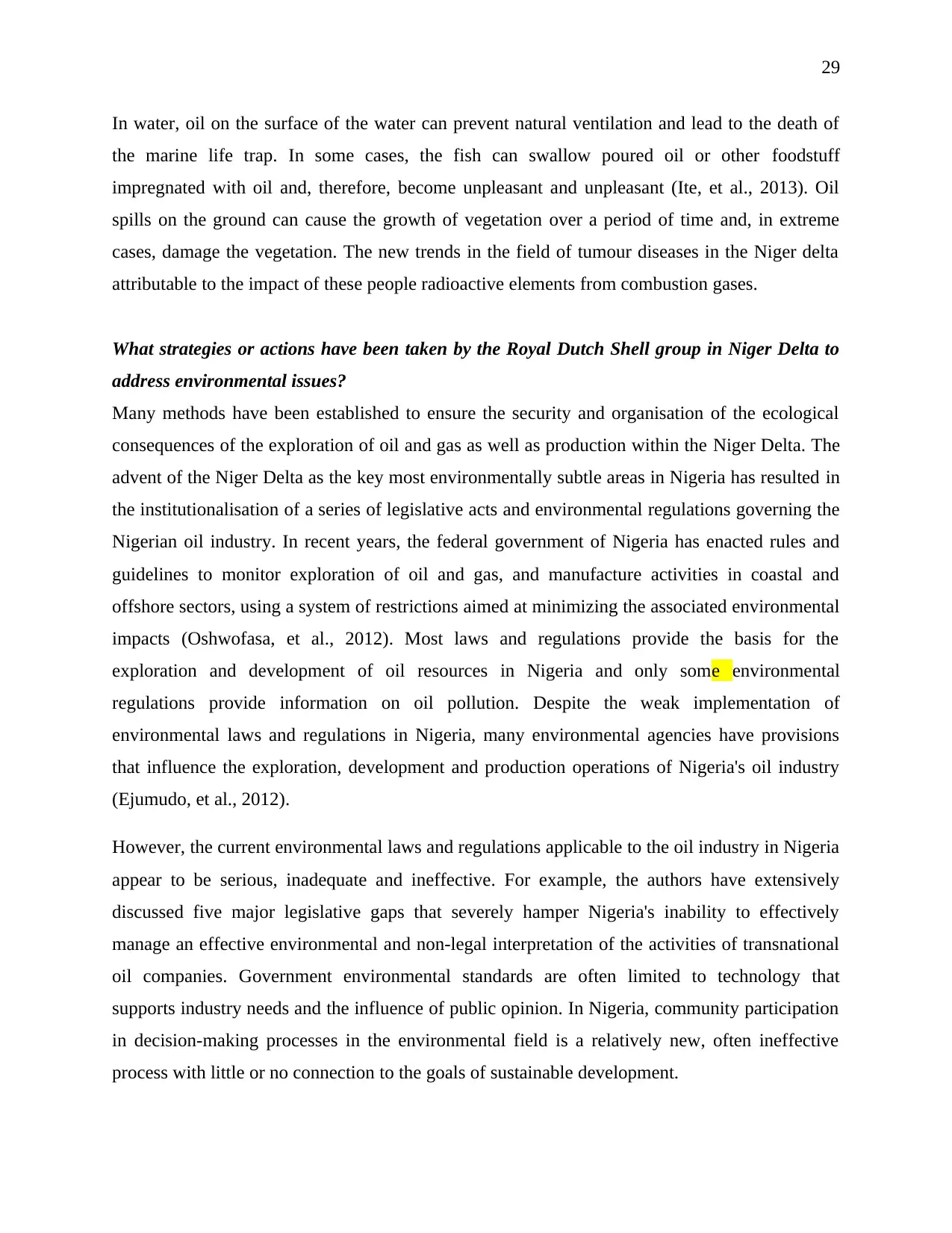
29
In water, oil on the surface of the water can prevent natural ventilation and lead to the death of
the marine life trap. In some cases, the fish can swallow poured oil or other foodstuff
impregnated with oil and, therefore, become unpleasant and unpleasant (Ite, et al., 2013). Oil
spills on the ground can cause the growth of vegetation over a period of time and, in extreme
cases, damage the vegetation. The new trends in the field of tumour diseases in the Niger delta
attributable to the impact of these people radioactive elements from combustion gases.
What strategies or actions have been taken by the Royal Dutch Shell group in Niger Delta to
address environmental issues?
Many methods have been established to ensure the security and organisation of the ecological
consequences of the exploration of oil and gas as well as production within the Niger Delta. The
advent of the Niger Delta as the key most environmentally subtle areas in Nigeria has resulted in
the institutionalisation of a series of legislative acts and environmental regulations governing the
Nigerian oil industry. In recent years, the federal government of Nigeria has enacted rules and
guidelines to monitor exploration of oil and gas, and manufacture activities in coastal and
offshore sectors, using a system of restrictions aimed at minimizing the associated environmental
impacts (Oshwofasa, et al., 2012). Most laws and regulations provide the basis for the
exploration and development of oil resources in Nigeria and only some environmental
regulations provide information on oil pollution. Despite the weak implementation of
environmental laws and regulations in Nigeria, many environmental agencies have provisions
that influence the exploration, development and production operations of Nigeria's oil industry
(Ejumudo, et al., 2012).
However, the current environmental laws and regulations applicable to the oil industry in Nigeria
appear to be serious, inadequate and ineffective. For example, the authors have extensively
discussed five major legislative gaps that severely hamper Nigeria's inability to effectively
manage an effective environmental and non-legal interpretation of the activities of transnational
oil companies. Government environmental standards are often limited to technology that
supports industry needs and the influence of public opinion. In Nigeria, community participation
in decision-making processes in the environmental field is a relatively new, often ineffective
process with little or no connection to the goals of sustainable development.
In water, oil on the surface of the water can prevent natural ventilation and lead to the death of
the marine life trap. In some cases, the fish can swallow poured oil or other foodstuff
impregnated with oil and, therefore, become unpleasant and unpleasant (Ite, et al., 2013). Oil
spills on the ground can cause the growth of vegetation over a period of time and, in extreme
cases, damage the vegetation. The new trends in the field of tumour diseases in the Niger delta
attributable to the impact of these people radioactive elements from combustion gases.
What strategies or actions have been taken by the Royal Dutch Shell group in Niger Delta to
address environmental issues?
Many methods have been established to ensure the security and organisation of the ecological
consequences of the exploration of oil and gas as well as production within the Niger Delta. The
advent of the Niger Delta as the key most environmentally subtle areas in Nigeria has resulted in
the institutionalisation of a series of legislative acts and environmental regulations governing the
Nigerian oil industry. In recent years, the federal government of Nigeria has enacted rules and
guidelines to monitor exploration of oil and gas, and manufacture activities in coastal and
offshore sectors, using a system of restrictions aimed at minimizing the associated environmental
impacts (Oshwofasa, et al., 2012). Most laws and regulations provide the basis for the
exploration and development of oil resources in Nigeria and only some environmental
regulations provide information on oil pollution. Despite the weak implementation of
environmental laws and regulations in Nigeria, many environmental agencies have provisions
that influence the exploration, development and production operations of Nigeria's oil industry
(Ejumudo, et al., 2012).
However, the current environmental laws and regulations applicable to the oil industry in Nigeria
appear to be serious, inadequate and ineffective. For example, the authors have extensively
discussed five major legislative gaps that severely hamper Nigeria's inability to effectively
manage an effective environmental and non-legal interpretation of the activities of transnational
oil companies. Government environmental standards are often limited to technology that
supports industry needs and the influence of public opinion. In Nigeria, community participation
in decision-making processes in the environmental field is a relatively new, often ineffective
process with little or no connection to the goals of sustainable development.
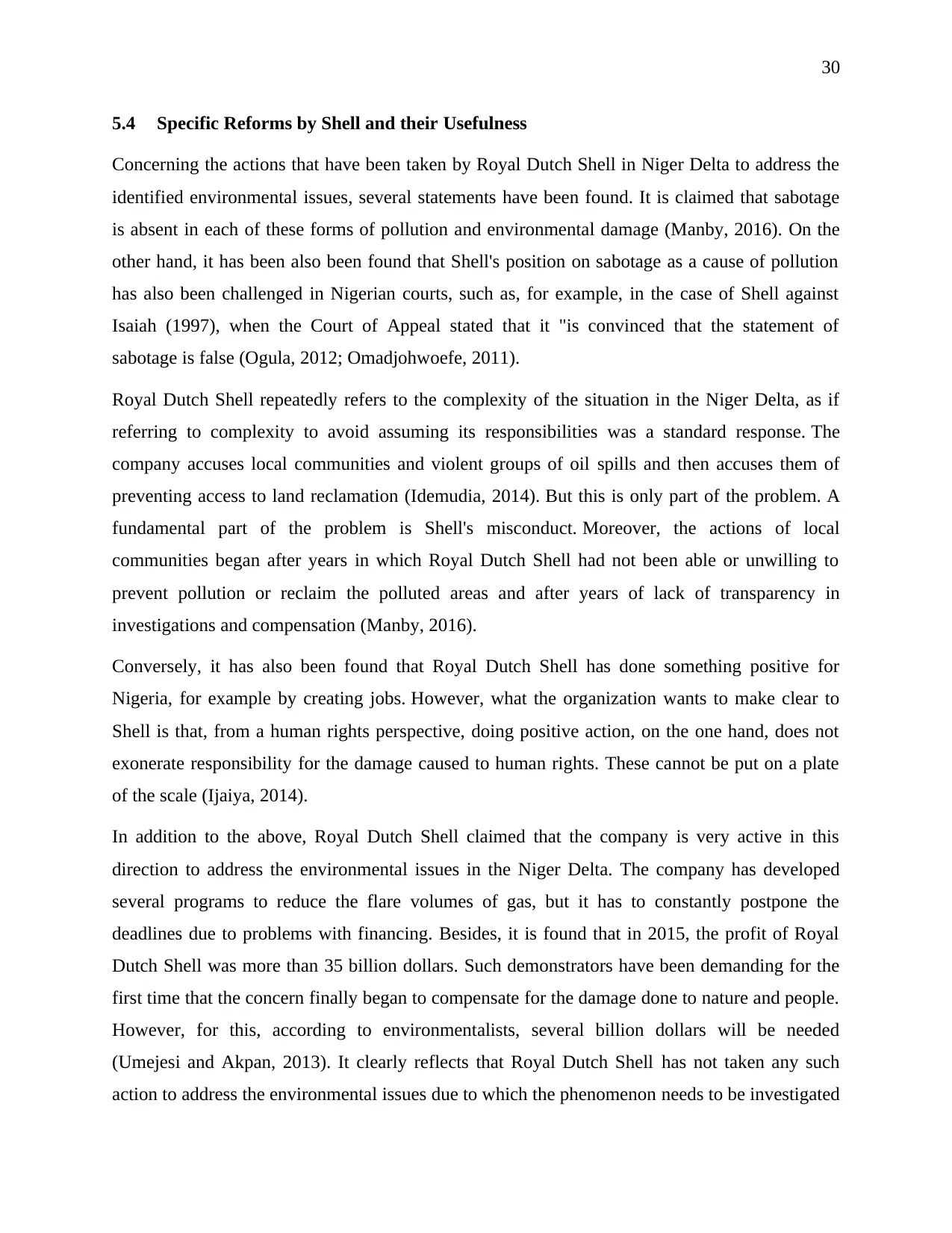
30
5.4 Specific Reforms by Shell and their Usefulness
Concerning the actions that have been taken by Royal Dutch Shell in Niger Delta to address the
identified environmental issues, several statements have been found. It is claimed that sabotage
is absent in each of these forms of pollution and environmental damage (Manby, 2016). On the
other hand, it has been also been found that Shell's position on sabotage as a cause of pollution
has also been challenged in Nigerian courts, such as, for example, in the case of Shell against
Isaiah (1997), when the Court of Appeal stated that it "is convinced that the statement of
sabotage is false (Ogula, 2012; Omadjohwoefe, 2011).
Royal Dutch Shell repeatedly refers to the complexity of the situation in the Niger Delta, as if
referring to complexity to avoid assuming its responsibilities was a standard response. The
company accuses local communities and violent groups of oil spills and then accuses them of
preventing access to land reclamation (Idemudia, 2014). But this is only part of the problem. A
fundamental part of the problem is Shell's misconduct. Moreover, the actions of local
communities began after years in which Royal Dutch Shell had not been able or unwilling to
prevent pollution or reclaim the polluted areas and after years of lack of transparency in
investigations and compensation (Manby, 2016).
Conversely, it has also been found that Royal Dutch Shell has done something positive for
Nigeria, for example by creating jobs. However, what the organization wants to make clear to
Shell is that, from a human rights perspective, doing positive action, on the one hand, does not
exonerate responsibility for the damage caused to human rights. These cannot be put on a plate
of the scale (Ijaiya, 2014).
In addition to the above, Royal Dutch Shell claimed that the company is very active in this
direction to address the environmental issues in the Niger Delta. The company has developed
several programs to reduce the flare volumes of gas, but it has to constantly postpone the
deadlines due to problems with financing. Besides, it is found that in 2015, the profit of Royal
Dutch Shell was more than 35 billion dollars. Such demonstrators have been demanding for the
first time that the concern finally began to compensate for the damage done to nature and people.
However, for this, according to environmentalists, several billion dollars will be needed
(Umejesi and Akpan, 2013). It clearly reflects that Royal Dutch Shell has not taken any such
action to address the environmental issues due to which the phenomenon needs to be investigated
5.4 Specific Reforms by Shell and their Usefulness
Concerning the actions that have been taken by Royal Dutch Shell in Niger Delta to address the
identified environmental issues, several statements have been found. It is claimed that sabotage
is absent in each of these forms of pollution and environmental damage (Manby, 2016). On the
other hand, it has been also been found that Shell's position on sabotage as a cause of pollution
has also been challenged in Nigerian courts, such as, for example, in the case of Shell against
Isaiah (1997), when the Court of Appeal stated that it "is convinced that the statement of
sabotage is false (Ogula, 2012; Omadjohwoefe, 2011).
Royal Dutch Shell repeatedly refers to the complexity of the situation in the Niger Delta, as if
referring to complexity to avoid assuming its responsibilities was a standard response. The
company accuses local communities and violent groups of oil spills and then accuses them of
preventing access to land reclamation (Idemudia, 2014). But this is only part of the problem. A
fundamental part of the problem is Shell's misconduct. Moreover, the actions of local
communities began after years in which Royal Dutch Shell had not been able or unwilling to
prevent pollution or reclaim the polluted areas and after years of lack of transparency in
investigations and compensation (Manby, 2016).
Conversely, it has also been found that Royal Dutch Shell has done something positive for
Nigeria, for example by creating jobs. However, what the organization wants to make clear to
Shell is that, from a human rights perspective, doing positive action, on the one hand, does not
exonerate responsibility for the damage caused to human rights. These cannot be put on a plate
of the scale (Ijaiya, 2014).
In addition to the above, Royal Dutch Shell claimed that the company is very active in this
direction to address the environmental issues in the Niger Delta. The company has developed
several programs to reduce the flare volumes of gas, but it has to constantly postpone the
deadlines due to problems with financing. Besides, it is found that in 2015, the profit of Royal
Dutch Shell was more than 35 billion dollars. Such demonstrators have been demanding for the
first time that the concern finally began to compensate for the damage done to nature and people.
However, for this, according to environmentalists, several billion dollars will be needed
(Umejesi and Akpan, 2013). It clearly reflects that Royal Dutch Shell has not taken any such
action to address the environmental issues due to which the phenomenon needs to be investigated
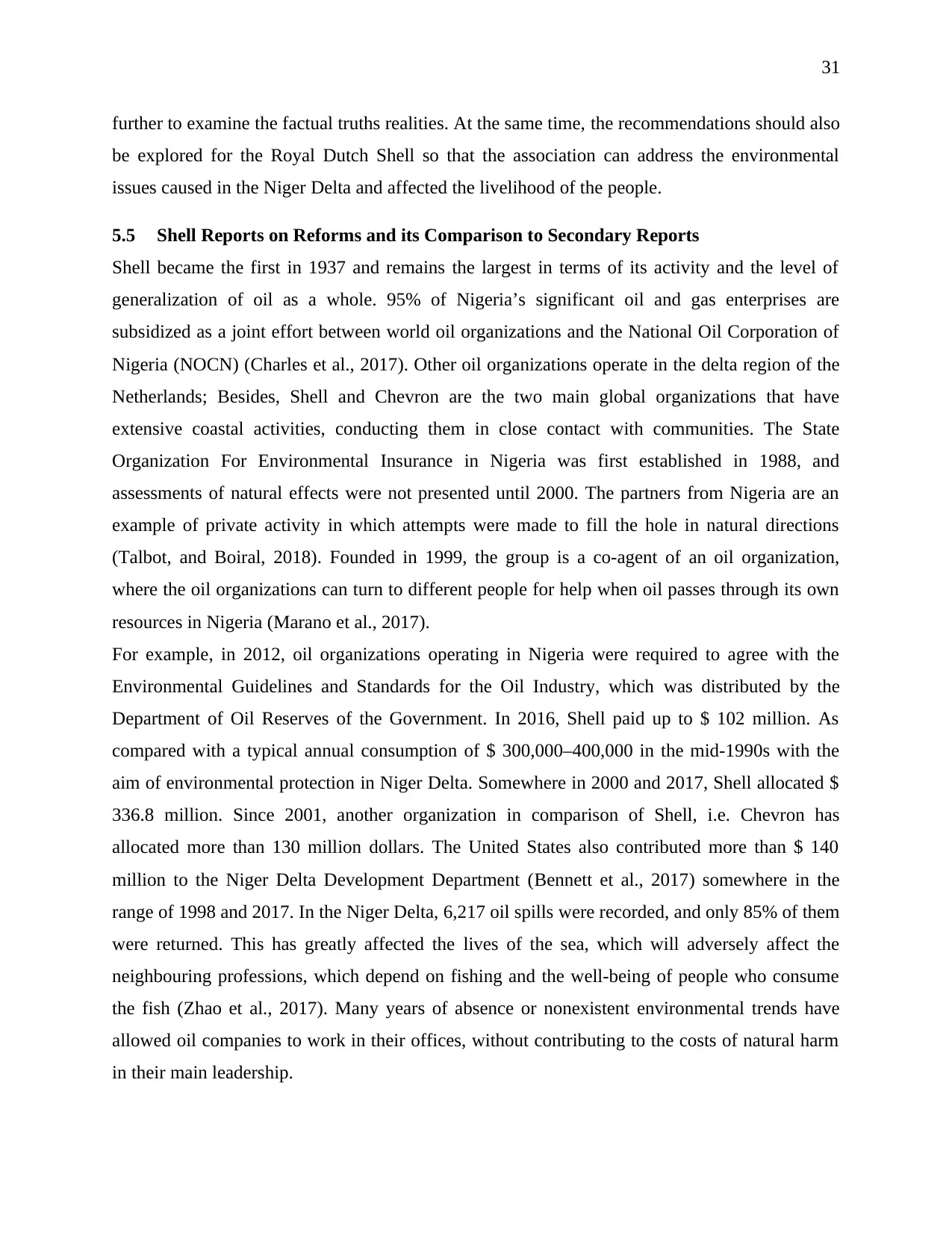
31
further to examine the factual truths realities. At the same time, the recommendations should also
be explored for the Royal Dutch Shell so that the association can address the environmental
issues caused in the Niger Delta and affected the livelihood of the people.
5.5 Shell Reports on Reforms and its Comparison to Secondary Reports
Shell became the first in 1937 and remains the largest in terms of its activity and the level of
generalization of oil as a whole. 95% of Nigeria’s significant oil and gas enterprises are
subsidized as a joint effort between world oil organizations and the National Oil Corporation of
Nigeria (NOCN) (Charles et al., 2017). Other oil organizations operate in the delta region of the
Netherlands; Besides, Shell and Chevron are the two main global organizations that have
extensive coastal activities, conducting them in close contact with communities. The State
Organization For Environmental Insurance in Nigeria was first established in 1988, and
assessments of natural effects were not presented until 2000. The partners from Nigeria are an
example of private activity in which attempts were made to fill the hole in natural directions
(Talbot, and Boiral, 2018). Founded in 1999, the group is a co-agent of an oil organization,
where the oil organizations can turn to different people for help when oil passes through its own
resources in Nigeria (Marano et al., 2017).
For example, in 2012, oil organizations operating in Nigeria were required to agree with the
Environmental Guidelines and Standards for the Oil Industry, which was distributed by the
Department of Oil Reserves of the Government. In 2016, Shell paid up to $ 102 million. As
compared with a typical annual consumption of $ 300,000–400,000 in the mid-1990s with the
aim of environmental protection in Niger Delta. Somewhere in 2000 and 2017, Shell allocated $
336.8 million. Since 2001, another organization in comparison of Shell, i.e. Chevron has
allocated more than 130 million dollars. The United States also contributed more than $ 140
million to the Niger Delta Development Department (Bennett et al., 2017) somewhere in the
range of 1998 and 2017. In the Niger Delta, 6,217 oil spills were recorded, and only 85% of them
were returned. This has greatly affected the lives of the sea, which will adversely affect the
neighbouring professions, which depend on fishing and the well-being of people who consume
the fish (Zhao et al., 2017). Many years of absence or nonexistent environmental trends have
allowed oil companies to work in their offices, without contributing to the costs of natural harm
in their main leadership.
further to examine the factual truths realities. At the same time, the recommendations should also
be explored for the Royal Dutch Shell so that the association can address the environmental
issues caused in the Niger Delta and affected the livelihood of the people.
5.5 Shell Reports on Reforms and its Comparison to Secondary Reports
Shell became the first in 1937 and remains the largest in terms of its activity and the level of
generalization of oil as a whole. 95% of Nigeria’s significant oil and gas enterprises are
subsidized as a joint effort between world oil organizations and the National Oil Corporation of
Nigeria (NOCN) (Charles et al., 2017). Other oil organizations operate in the delta region of the
Netherlands; Besides, Shell and Chevron are the two main global organizations that have
extensive coastal activities, conducting them in close contact with communities. The State
Organization For Environmental Insurance in Nigeria was first established in 1988, and
assessments of natural effects were not presented until 2000. The partners from Nigeria are an
example of private activity in which attempts were made to fill the hole in natural directions
(Talbot, and Boiral, 2018). Founded in 1999, the group is a co-agent of an oil organization,
where the oil organizations can turn to different people for help when oil passes through its own
resources in Nigeria (Marano et al., 2017).
For example, in 2012, oil organizations operating in Nigeria were required to agree with the
Environmental Guidelines and Standards for the Oil Industry, which was distributed by the
Department of Oil Reserves of the Government. In 2016, Shell paid up to $ 102 million. As
compared with a typical annual consumption of $ 300,000–400,000 in the mid-1990s with the
aim of environmental protection in Niger Delta. Somewhere in 2000 and 2017, Shell allocated $
336.8 million. Since 2001, another organization in comparison of Shell, i.e. Chevron has
allocated more than 130 million dollars. The United States also contributed more than $ 140
million to the Niger Delta Development Department (Bennett et al., 2017) somewhere in the
range of 1998 and 2017. In the Niger Delta, 6,217 oil spills were recorded, and only 85% of them
were returned. This has greatly affected the lives of the sea, which will adversely affect the
neighbouring professions, which depend on fishing and the well-being of people who consume
the fish (Zhao et al., 2017). Many years of absence or nonexistent environmental trends have
allowed oil companies to work in their offices, without contributing to the costs of natural harm
in their main leadership.
Paraphrase This Document
Need a fresh take? Get an instant paraphrase of this document with our AI Paraphraser
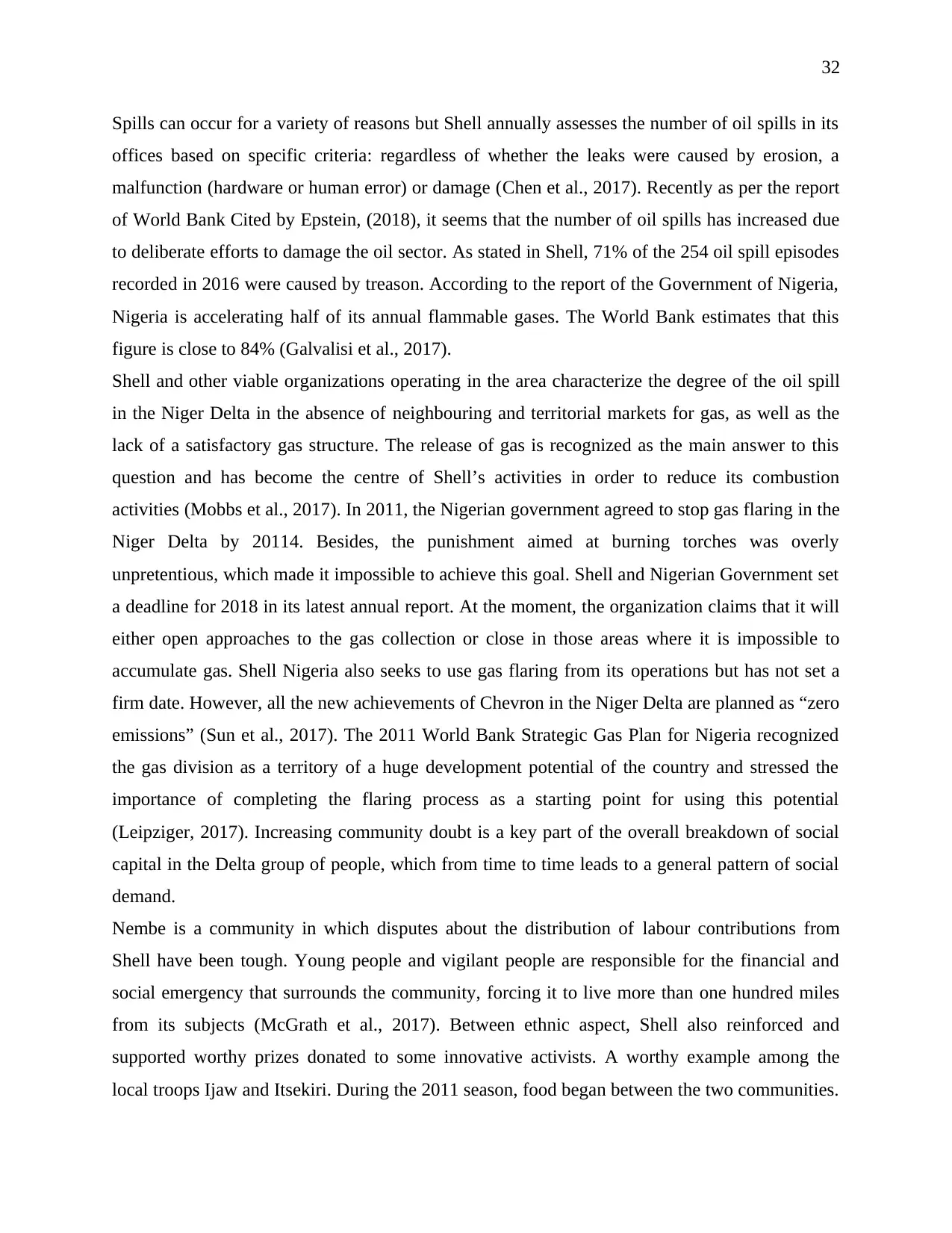
32
Spills can occur for a variety of reasons but Shell annually assesses the number of oil spills in its
offices based on specific criteria: regardless of whether the leaks were caused by erosion, a
malfunction (hardware or human error) or damage (Chen et al., 2017). Recently as per the report
of World Bank Cited by Epstein, (2018), it seems that the number of oil spills has increased due
to deliberate efforts to damage the oil sector. As stated in Shell, 71% of the 254 oil spill episodes
recorded in 2016 were caused by treason. According to the report of the Government of Nigeria,
Nigeria is accelerating half of its annual flammable gases. The World Bank estimates that this
figure is close to 84% (Galvalisi et al., 2017).
Shell and other viable organizations operating in the area characterize the degree of the oil spill
in the Niger Delta in the absence of neighbouring and territorial markets for gas, as well as the
lack of a satisfactory gas structure. The release of gas is recognized as the main answer to this
question and has become the centre of Shell’s activities in order to reduce its combustion
activities (Mobbs et al., 2017). In 2011, the Nigerian government agreed to stop gas flaring in the
Niger Delta by 20114. Besides, the punishment aimed at burning torches was overly
unpretentious, which made it impossible to achieve this goal. Shell and Nigerian Government set
a deadline for 2018 in its latest annual report. At the moment, the organization claims that it will
either open approaches to the gas collection or close in those areas where it is impossible to
accumulate gas. Shell Nigeria also seeks to use gas flaring from its operations but has not set a
firm date. However, all the new achievements of Chevron in the Niger Delta are planned as “zero
emissions” (Sun et al., 2017). The 2011 World Bank Strategic Gas Plan for Nigeria recognized
the gas division as a territory of a huge development potential of the country and stressed the
importance of completing the flaring process as a starting point for using this potential
(Leipziger, 2017). Increasing community doubt is a key part of the overall breakdown of social
capital in the Delta group of people, which from time to time leads to a general pattern of social
demand.
Nembe is a community in which disputes about the distribution of labour contributions from
Shell have been tough. Young people and vigilant people are responsible for the financial and
social emergency that surrounds the community, forcing it to live more than one hundred miles
from its subjects (McGrath et al., 2017). Between ethnic aspect, Shell also reinforced and
supported worthy prizes donated to some innovative activists. A worthy example among the
local troops Ijaw and Itsekiri. During the 2011 season, food began between the two communities.
Spills can occur for a variety of reasons but Shell annually assesses the number of oil spills in its
offices based on specific criteria: regardless of whether the leaks were caused by erosion, a
malfunction (hardware or human error) or damage (Chen et al., 2017). Recently as per the report
of World Bank Cited by Epstein, (2018), it seems that the number of oil spills has increased due
to deliberate efforts to damage the oil sector. As stated in Shell, 71% of the 254 oil spill episodes
recorded in 2016 were caused by treason. According to the report of the Government of Nigeria,
Nigeria is accelerating half of its annual flammable gases. The World Bank estimates that this
figure is close to 84% (Galvalisi et al., 2017).
Shell and other viable organizations operating in the area characterize the degree of the oil spill
in the Niger Delta in the absence of neighbouring and territorial markets for gas, as well as the
lack of a satisfactory gas structure. The release of gas is recognized as the main answer to this
question and has become the centre of Shell’s activities in order to reduce its combustion
activities (Mobbs et al., 2017). In 2011, the Nigerian government agreed to stop gas flaring in the
Niger Delta by 20114. Besides, the punishment aimed at burning torches was overly
unpretentious, which made it impossible to achieve this goal. Shell and Nigerian Government set
a deadline for 2018 in its latest annual report. At the moment, the organization claims that it will
either open approaches to the gas collection or close in those areas where it is impossible to
accumulate gas. Shell Nigeria also seeks to use gas flaring from its operations but has not set a
firm date. However, all the new achievements of Chevron in the Niger Delta are planned as “zero
emissions” (Sun et al., 2017). The 2011 World Bank Strategic Gas Plan for Nigeria recognized
the gas division as a territory of a huge development potential of the country and stressed the
importance of completing the flaring process as a starting point for using this potential
(Leipziger, 2017). Increasing community doubt is a key part of the overall breakdown of social
capital in the Delta group of people, which from time to time leads to a general pattern of social
demand.
Nembe is a community in which disputes about the distribution of labour contributions from
Shell have been tough. Young people and vigilant people are responsible for the financial and
social emergency that surrounds the community, forcing it to live more than one hundred miles
from its subjects (McGrath et al., 2017). Between ethnic aspect, Shell also reinforced and
supported worthy prizes donated to some innovative activists. A worthy example among the
local troops Ijaw and Itsekiri. During the 2011 season, food began between the two communities.
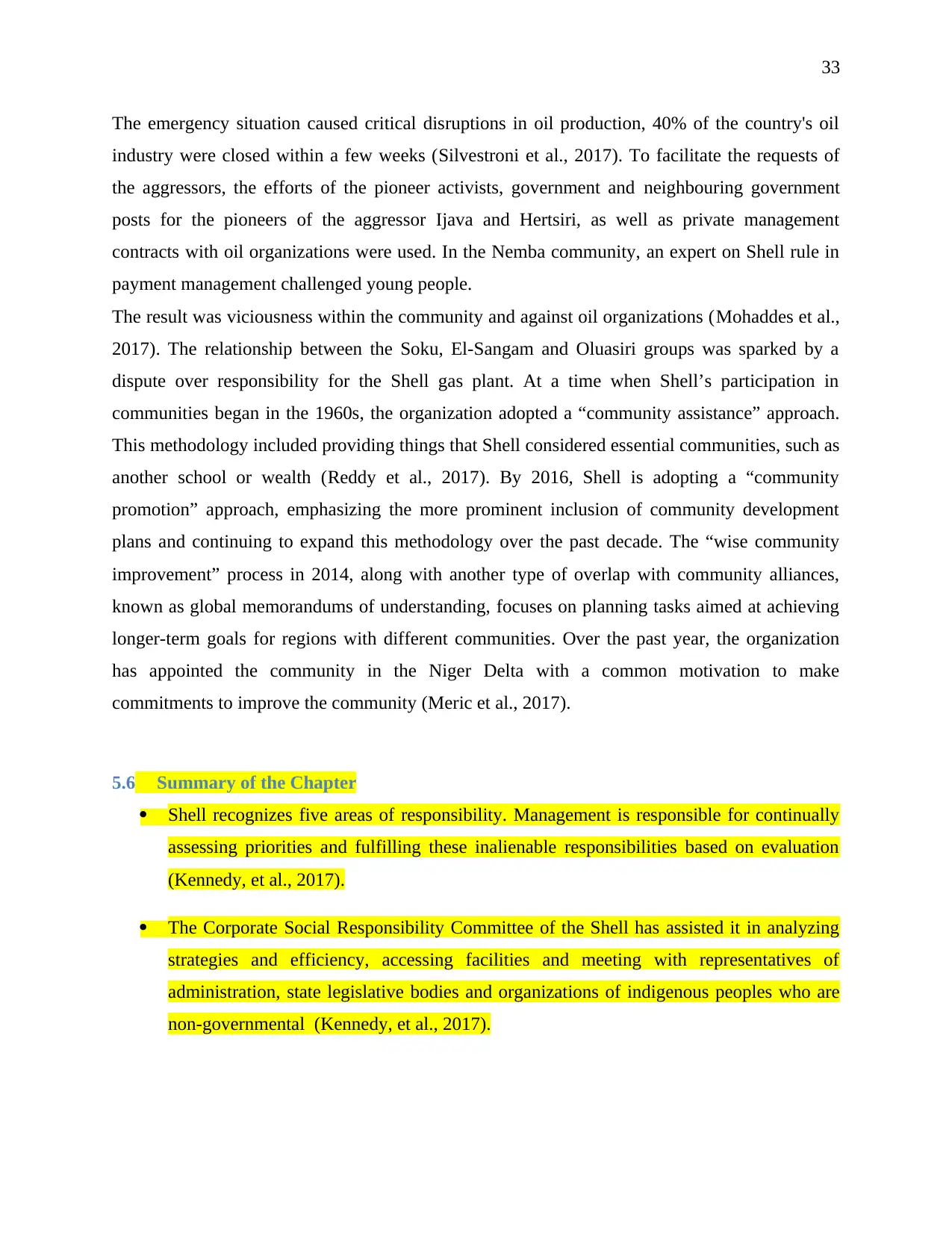
33
The emergency situation caused critical disruptions in oil production, 40% of the country's oil
industry were closed within a few weeks (Silvestroni et al., 2017). To facilitate the requests of
the aggressors, the efforts of the pioneer activists, government and neighbouring government
posts for the pioneers of the aggressor Ijava and Hertsiri, as well as private management
contracts with oil organizations were used. In the Nemba community, an expert on Shell rule in
payment management challenged young people.
The result was viciousness within the community and against oil organizations (Mohaddes et al.,
2017). The relationship between the Soku, El-Sangam and Oluasiri groups was sparked by a
dispute over responsibility for the Shell gas plant. At a time when Shell’s participation in
communities began in the 1960s, the organization adopted a “community assistance” approach.
This methodology included providing things that Shell considered essential communities, such as
another school or wealth (Reddy et al., 2017). By 2016, Shell is adopting a “community
promotion” approach, emphasizing the more prominent inclusion of community development
plans and continuing to expand this methodology over the past decade. The “wise community
improvement” process in 2014, along with another type of overlap with community alliances,
known as global memorandums of understanding, focuses on planning tasks aimed at achieving
longer-term goals for regions with different communities. Over the past year, the organization
has appointed the community in the Niger Delta with a common motivation to make
commitments to improve the community (Meric et al., 2017).
5.6 Summary of the Chapter
Shell recognizes five areas of responsibility. Management is responsible for continually
assessing priorities and fulfilling these inalienable responsibilities based on evaluation
(Kennedy, et al., 2017).
The Corporate Social Responsibility Committee of the Shell has assisted it in analyzing
strategies and efficiency, accessing facilities and meeting with representatives of
administration, state legislative bodies and organizations of indigenous peoples who are
non-governmental (Kennedy, et al., 2017).
The emergency situation caused critical disruptions in oil production, 40% of the country's oil
industry were closed within a few weeks (Silvestroni et al., 2017). To facilitate the requests of
the aggressors, the efforts of the pioneer activists, government and neighbouring government
posts for the pioneers of the aggressor Ijava and Hertsiri, as well as private management
contracts with oil organizations were used. In the Nemba community, an expert on Shell rule in
payment management challenged young people.
The result was viciousness within the community and against oil organizations (Mohaddes et al.,
2017). The relationship between the Soku, El-Sangam and Oluasiri groups was sparked by a
dispute over responsibility for the Shell gas plant. At a time when Shell’s participation in
communities began in the 1960s, the organization adopted a “community assistance” approach.
This methodology included providing things that Shell considered essential communities, such as
another school or wealth (Reddy et al., 2017). By 2016, Shell is adopting a “community
promotion” approach, emphasizing the more prominent inclusion of community development
plans and continuing to expand this methodology over the past decade. The “wise community
improvement” process in 2014, along with another type of overlap with community alliances,
known as global memorandums of understanding, focuses on planning tasks aimed at achieving
longer-term goals for regions with different communities. Over the past year, the organization
has appointed the community in the Niger Delta with a common motivation to make
commitments to improve the community (Meric et al., 2017).
5.6 Summary of the Chapter
Shell recognizes five areas of responsibility. Management is responsible for continually
assessing priorities and fulfilling these inalienable responsibilities based on evaluation
(Kennedy, et al., 2017).
The Corporate Social Responsibility Committee of the Shell has assisted it in analyzing
strategies and efficiency, accessing facilities and meeting with representatives of
administration, state legislative bodies and organizations of indigenous peoples who are
non-governmental (Kennedy, et al., 2017).
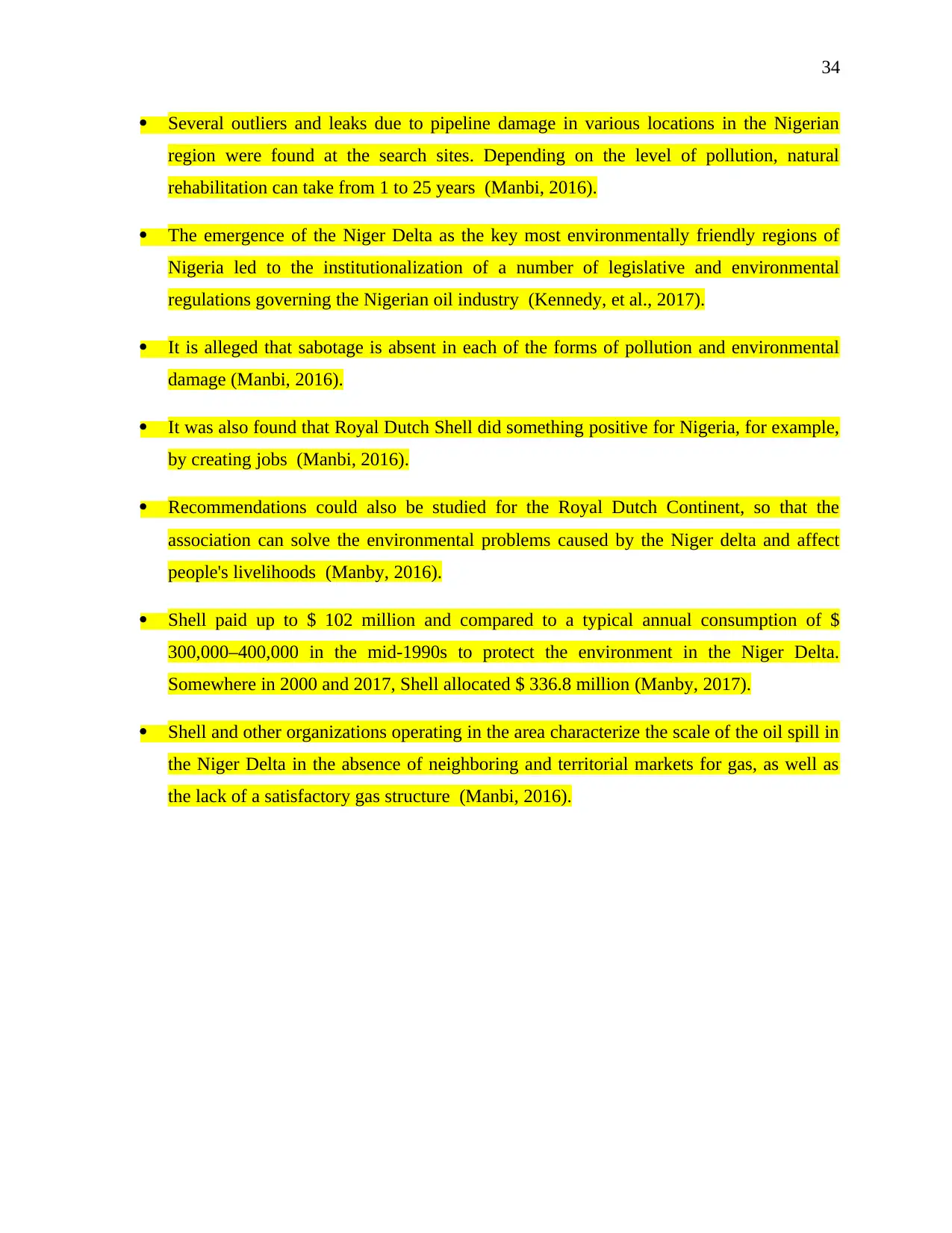
34
Several outliers and leaks due to pipeline damage in various locations in the Nigerian
region were found at the search sites. Depending on the level of pollution, natural
rehabilitation can take from 1 to 25 years (Manbi, 2016).
The emergence of the Niger Delta as the key most environmentally friendly regions of
Nigeria led to the institutionalization of a number of legislative and environmental
regulations governing the Nigerian oil industry (Kennedy, et al., 2017).
It is alleged that sabotage is absent in each of the forms of pollution and environmental
damage (Manbi, 2016).
It was also found that Royal Dutch Shell did something positive for Nigeria, for example,
by creating jobs (Manbi, 2016).
Recommendations could also be studied for the Royal Dutch Continent, so that the
association can solve the environmental problems caused by the Niger delta and affect
people's livelihoods (Manby, 2016).
Shell paid up to $ 102 million and compared to a typical annual consumption of $
300,000–400,000 in the mid-1990s to protect the environment in the Niger Delta.
Somewhere in 2000 and 2017, Shell allocated $ 336.8 million (Manby, 2017).
Shell and other organizations operating in the area characterize the scale of the oil spill in
the Niger Delta in the absence of neighboring and territorial markets for gas, as well as
the lack of a satisfactory gas structure (Manbi, 2016).
Several outliers and leaks due to pipeline damage in various locations in the Nigerian
region were found at the search sites. Depending on the level of pollution, natural
rehabilitation can take from 1 to 25 years (Manbi, 2016).
The emergence of the Niger Delta as the key most environmentally friendly regions of
Nigeria led to the institutionalization of a number of legislative and environmental
regulations governing the Nigerian oil industry (Kennedy, et al., 2017).
It is alleged that sabotage is absent in each of the forms of pollution and environmental
damage (Manbi, 2016).
It was also found that Royal Dutch Shell did something positive for Nigeria, for example,
by creating jobs (Manbi, 2016).
Recommendations could also be studied for the Royal Dutch Continent, so that the
association can solve the environmental problems caused by the Niger delta and affect
people's livelihoods (Manby, 2016).
Shell paid up to $ 102 million and compared to a typical annual consumption of $
300,000–400,000 in the mid-1990s to protect the environment in the Niger Delta.
Somewhere in 2000 and 2017, Shell allocated $ 336.8 million (Manby, 2017).
Shell and other organizations operating in the area characterize the scale of the oil spill in
the Niger Delta in the absence of neighboring and territorial markets for gas, as well as
the lack of a satisfactory gas structure (Manbi, 2016).
Secure Best Marks with AI Grader
Need help grading? Try our AI Grader for instant feedback on your assignments.
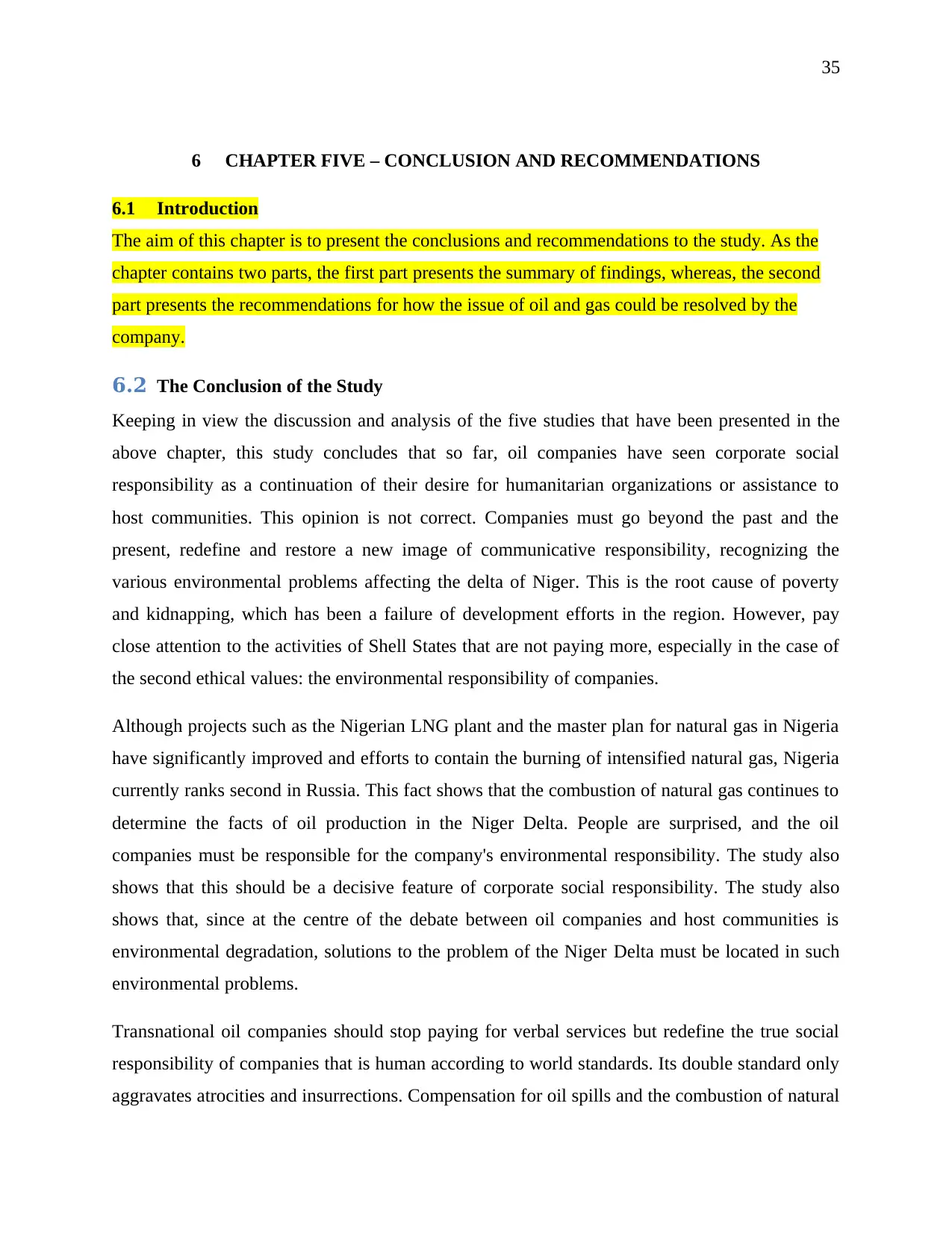
35
6 CHAPTER FIVE – CONCLUSION AND RECOMMENDATIONS
6.1 Introduction
The aim of this chapter is to present the conclusions and recommendations to the study. As the
chapter contains two parts, the first part presents the summary of findings, whereas, the second
part presents the recommendations for how the issue of oil and gas could be resolved by the
company.
6.2 The Conclusion of the Study
Keeping in view the discussion and analysis of the five studies that have been presented in the
above chapter, this study concludes that so far, oil companies have seen corporate social
responsibility as a continuation of their desire for humanitarian organizations or assistance to
host communities. This opinion is not correct. Companies must go beyond the past and the
present, redefine and restore a new image of communicative responsibility, recognizing the
various environmental problems affecting the delta of Niger. This is the root cause of poverty
and kidnapping, which has been a failure of development efforts in the region. However, pay
close attention to the activities of Shell States that are not paying more, especially in the case of
the second ethical values: the environmental responsibility of companies.
Although projects such as the Nigerian LNG plant and the master plan for natural gas in Nigeria
have significantly improved and efforts to contain the burning of intensified natural gas, Nigeria
currently ranks second in Russia. This fact shows that the combustion of natural gas continues to
determine the facts of oil production in the Niger Delta. People are surprised, and the oil
companies must be responsible for the company's environmental responsibility. The study also
shows that this should be a decisive feature of corporate social responsibility. The study also
shows that, since at the centre of the debate between oil companies and host communities is
environmental degradation, solutions to the problem of the Niger Delta must be located in such
environmental problems.
Transnational oil companies should stop paying for verbal services but redefine the true social
responsibility of companies that is human according to world standards. Its double standard only
aggravates atrocities and insurrections. Compensation for oil spills and the combustion of natural
6 CHAPTER FIVE – CONCLUSION AND RECOMMENDATIONS
6.1 Introduction
The aim of this chapter is to present the conclusions and recommendations to the study. As the
chapter contains two parts, the first part presents the summary of findings, whereas, the second
part presents the recommendations for how the issue of oil and gas could be resolved by the
company.
6.2 The Conclusion of the Study
Keeping in view the discussion and analysis of the five studies that have been presented in the
above chapter, this study concludes that so far, oil companies have seen corporate social
responsibility as a continuation of their desire for humanitarian organizations or assistance to
host communities. This opinion is not correct. Companies must go beyond the past and the
present, redefine and restore a new image of communicative responsibility, recognizing the
various environmental problems affecting the delta of Niger. This is the root cause of poverty
and kidnapping, which has been a failure of development efforts in the region. However, pay
close attention to the activities of Shell States that are not paying more, especially in the case of
the second ethical values: the environmental responsibility of companies.
Although projects such as the Nigerian LNG plant and the master plan for natural gas in Nigeria
have significantly improved and efforts to contain the burning of intensified natural gas, Nigeria
currently ranks second in Russia. This fact shows that the combustion of natural gas continues to
determine the facts of oil production in the Niger Delta. People are surprised, and the oil
companies must be responsible for the company's environmental responsibility. The study also
shows that this should be a decisive feature of corporate social responsibility. The study also
shows that, since at the centre of the debate between oil companies and host communities is
environmental degradation, solutions to the problem of the Niger Delta must be located in such
environmental problems.
Transnational oil companies should stop paying for verbal services but redefine the true social
responsibility of companies that is human according to world standards. Its double standard only
aggravates atrocities and insurrections. Compensation for oil spills and the combustion of natural
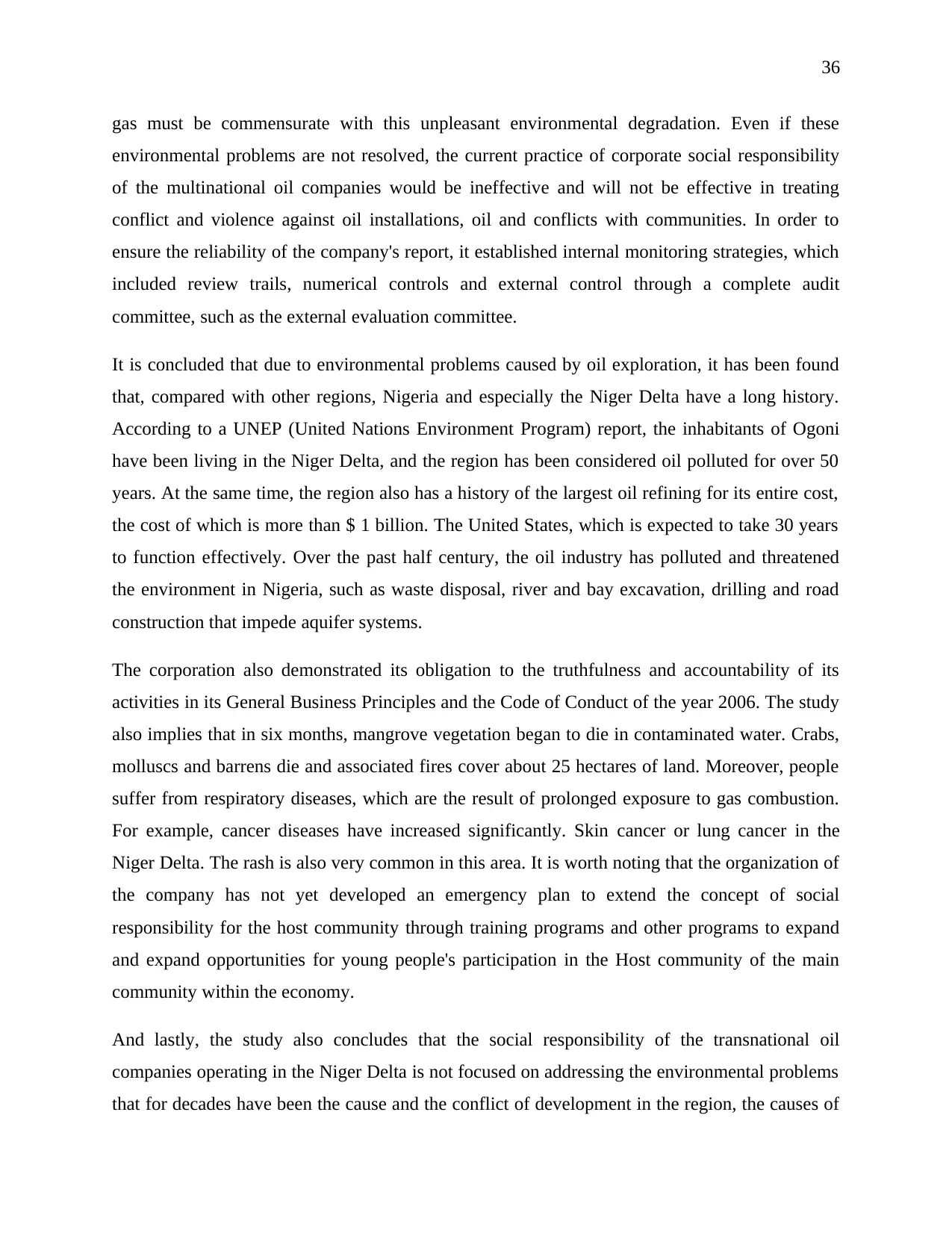
36
gas must be commensurate with this unpleasant environmental degradation. Even if these
environmental problems are not resolved, the current practice of corporate social responsibility
of the multinational oil companies would be ineffective and will not be effective in treating
conflict and violence against oil installations, oil and conflicts with communities. In order to
ensure the reliability of the company's report, it established internal monitoring strategies, which
included review trails, numerical controls and external control through a complete audit
committee, such as the external evaluation committee.
It is concluded that due to environmental problems caused by oil exploration, it has been found
that, compared with other regions, Nigeria and especially the Niger Delta have a long history.
According to a UNEP (United Nations Environment Program) report, the inhabitants of Ogoni
have been living in the Niger Delta, and the region has been considered oil polluted for over 50
years. At the same time, the region also has a history of the largest oil refining for its entire cost,
the cost of which is more than $ 1 billion. The United States, which is expected to take 30 years
to function effectively. Over the past half century, the oil industry has polluted and threatened
the environment in Nigeria, such as waste disposal, river and bay excavation, drilling and road
construction that impede aquifer systems.
The corporation also demonstrated its obligation to the truthfulness and accountability of its
activities in its General Business Principles and the Code of Conduct of the year 2006. The study
also implies that in six months, mangrove vegetation began to die in contaminated water. Crabs,
molluscs and barrens die and associated fires cover about 25 hectares of land. Moreover, people
suffer from respiratory diseases, which are the result of prolonged exposure to gas combustion.
For example, cancer diseases have increased significantly. Skin cancer or lung cancer in the
Niger Delta. The rash is also very common in this area. It is worth noting that the organization of
the company has not yet developed an emergency plan to extend the concept of social
responsibility for the host community through training programs and other programs to expand
and expand opportunities for young people's participation in the Host community of the main
community within the economy.
And lastly, the study also concludes that the social responsibility of the transnational oil
companies operating in the Niger Delta is not focused on addressing the environmental problems
that for decades have been the cause and the conflict of development in the region, the causes of
gas must be commensurate with this unpleasant environmental degradation. Even if these
environmental problems are not resolved, the current practice of corporate social responsibility
of the multinational oil companies would be ineffective and will not be effective in treating
conflict and violence against oil installations, oil and conflicts with communities. In order to
ensure the reliability of the company's report, it established internal monitoring strategies, which
included review trails, numerical controls and external control through a complete audit
committee, such as the external evaluation committee.
It is concluded that due to environmental problems caused by oil exploration, it has been found
that, compared with other regions, Nigeria and especially the Niger Delta have a long history.
According to a UNEP (United Nations Environment Program) report, the inhabitants of Ogoni
have been living in the Niger Delta, and the region has been considered oil polluted for over 50
years. At the same time, the region also has a history of the largest oil refining for its entire cost,
the cost of which is more than $ 1 billion. The United States, which is expected to take 30 years
to function effectively. Over the past half century, the oil industry has polluted and threatened
the environment in Nigeria, such as waste disposal, river and bay excavation, drilling and road
construction that impede aquifer systems.
The corporation also demonstrated its obligation to the truthfulness and accountability of its
activities in its General Business Principles and the Code of Conduct of the year 2006. The study
also implies that in six months, mangrove vegetation began to die in contaminated water. Crabs,
molluscs and barrens die and associated fires cover about 25 hectares of land. Moreover, people
suffer from respiratory diseases, which are the result of prolonged exposure to gas combustion.
For example, cancer diseases have increased significantly. Skin cancer or lung cancer in the
Niger Delta. The rash is also very common in this area. It is worth noting that the organization of
the company has not yet developed an emergency plan to extend the concept of social
responsibility for the host community through training programs and other programs to expand
and expand opportunities for young people's participation in the Host community of the main
community within the economy.
And lastly, the study also concludes that the social responsibility of the transnational oil
companies operating in the Niger Delta is not focused on addressing the environmental problems
that for decades have been the cause and the conflict of development in the region, the causes of
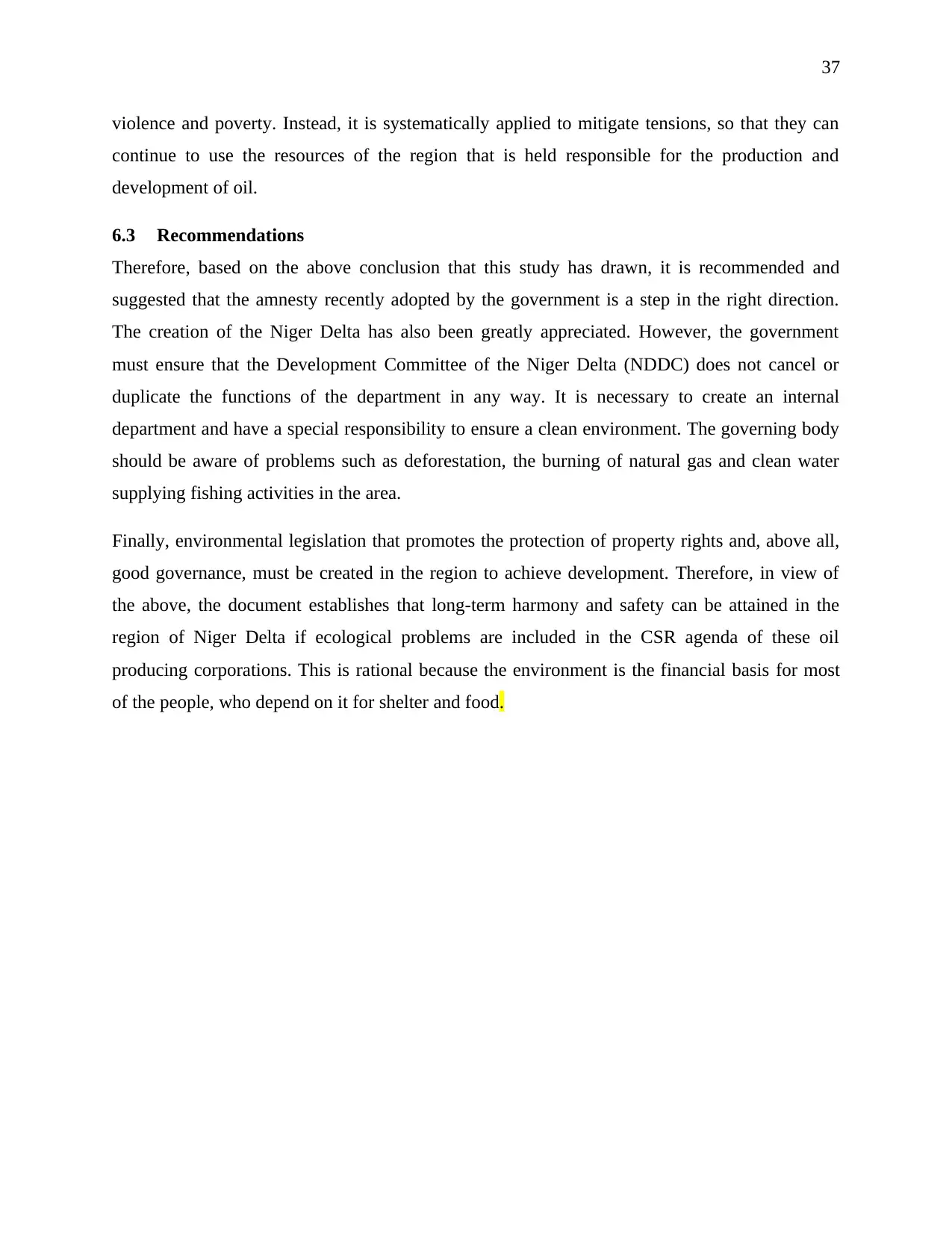
37
violence and poverty. Instead, it is systematically applied to mitigate tensions, so that they can
continue to use the resources of the region that is held responsible for the production and
development of oil.
6.3 Recommendations
Therefore, based on the above conclusion that this study has drawn, it is recommended and
suggested that the amnesty recently adopted by the government is a step in the right direction.
The creation of the Niger Delta has also been greatly appreciated. However, the government
must ensure that the Development Committee of the Niger Delta (NDDC) does not cancel or
duplicate the functions of the department in any way. It is necessary to create an internal
department and have a special responsibility to ensure a clean environment. The governing body
should be aware of problems such as deforestation, the burning of natural gas and clean water
supplying fishing activities in the area.
Finally, environmental legislation that promotes the protection of property rights and, above all,
good governance, must be created in the region to achieve development. Therefore, in view of
the above, the document establishes that long-term harmony and safety can be attained in the
region of Niger Delta if ecological problems are included in the CSR agenda of these oil
producing corporations. This is rational because the environment is the financial basis for most
of the people, who depend on it for shelter and food.
violence and poverty. Instead, it is systematically applied to mitigate tensions, so that they can
continue to use the resources of the region that is held responsible for the production and
development of oil.
6.3 Recommendations
Therefore, based on the above conclusion that this study has drawn, it is recommended and
suggested that the amnesty recently adopted by the government is a step in the right direction.
The creation of the Niger Delta has also been greatly appreciated. However, the government
must ensure that the Development Committee of the Niger Delta (NDDC) does not cancel or
duplicate the functions of the department in any way. It is necessary to create an internal
department and have a special responsibility to ensure a clean environment. The governing body
should be aware of problems such as deforestation, the burning of natural gas and clean water
supplying fishing activities in the area.
Finally, environmental legislation that promotes the protection of property rights and, above all,
good governance, must be created in the region to achieve development. Therefore, in view of
the above, the document establishes that long-term harmony and safety can be attained in the
region of Niger Delta if ecological problems are included in the CSR agenda of these oil
producing corporations. This is rational because the environment is the financial basis for most
of the people, who depend on it for shelter and food.
Paraphrase This Document
Need a fresh take? Get an instant paraphrase of this document with our AI Paraphraser
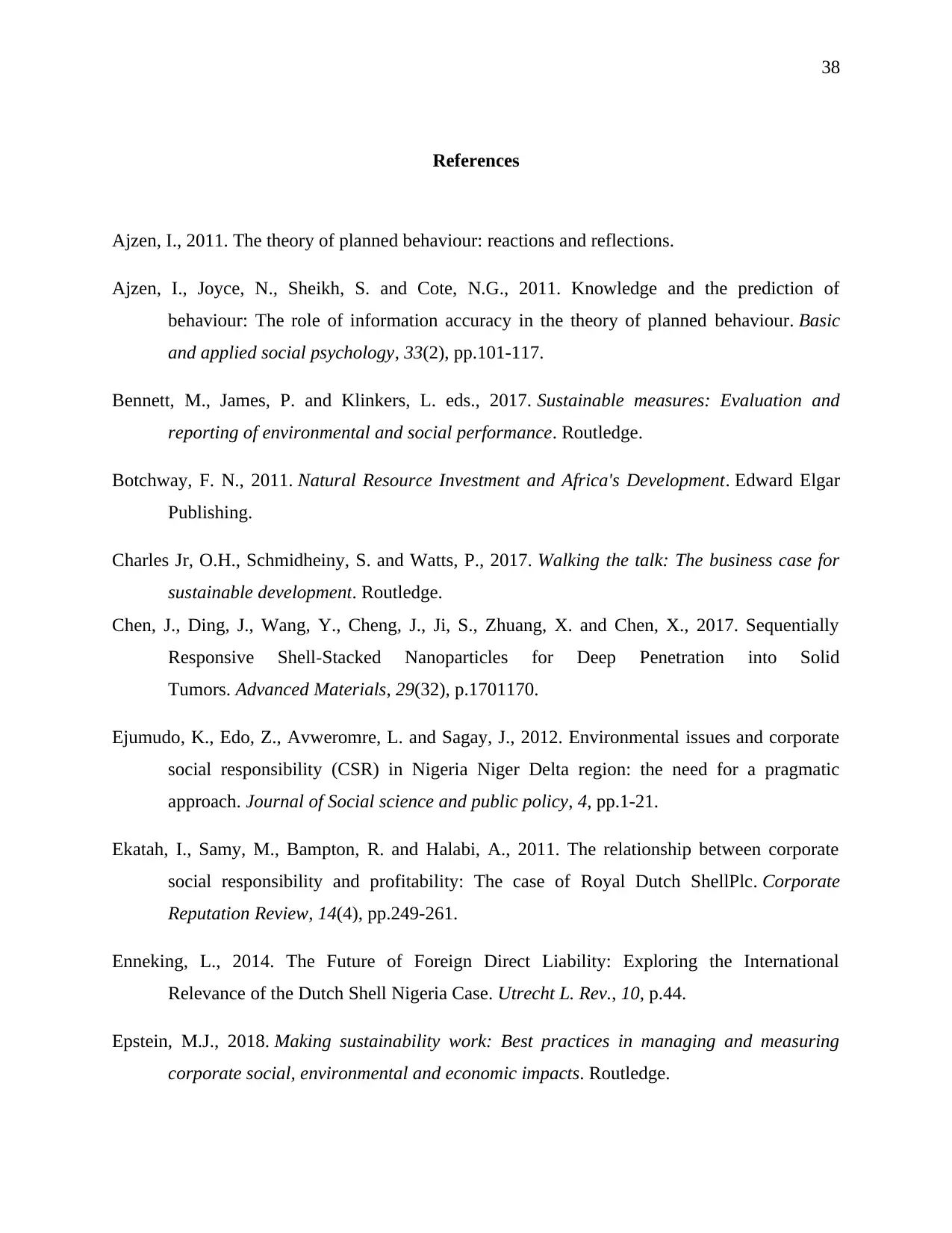
38
References
Ajzen, I., 2011. The theory of planned behaviour: reactions and reflections.
Ajzen, I., Joyce, N., Sheikh, S. and Cote, N.G., 2011. Knowledge and the prediction of
behaviour: The role of information accuracy in the theory of planned behaviour. Basic
and applied social psychology, 33(2), pp.101-117.
Bennett, M., James, P. and Klinkers, L. eds., 2017. Sustainable measures: Evaluation and
reporting of environmental and social performance. Routledge.
Botchway, F. N., 2011. Natural Resource Investment and Africa's Development. Edward Elgar
Publishing.
Charles Jr, O.H., Schmidheiny, S. and Watts, P., 2017. Walking the talk: The business case for
sustainable development. Routledge.
Chen, J., Ding, J., Wang, Y., Cheng, J., Ji, S., Zhuang, X. and Chen, X., 2017. Sequentially
Responsive Shell‐Stacked Nanoparticles for Deep Penetration into Solid
Tumors. Advanced Materials, 29(32), p.1701170.
Ejumudo, K., Edo, Z., Avweromre, L. and Sagay, J., 2012. Environmental issues and corporate
social responsibility (CSR) in Nigeria Niger Delta region: the need for a pragmatic
approach. Journal of Social science and public policy, 4, pp.1-21.
Ekatah, I., Samy, M., Bampton, R. and Halabi, A., 2011. The relationship between corporate
social responsibility and profitability: The case of Royal Dutch ShellPlc. Corporate
Reputation Review, 14(4), pp.249-261.
Enneking, L., 2014. The Future of Foreign Direct Liability: Exploring the International
Relevance of the Dutch Shell Nigeria Case. Utrecht L. Rev., 10, p.44.
Epstein, M.J., 2018. Making sustainability work: Best practices in managing and measuring
corporate social, environmental and economic impacts. Routledge.
References
Ajzen, I., 2011. The theory of planned behaviour: reactions and reflections.
Ajzen, I., Joyce, N., Sheikh, S. and Cote, N.G., 2011. Knowledge and the prediction of
behaviour: The role of information accuracy in the theory of planned behaviour. Basic
and applied social psychology, 33(2), pp.101-117.
Bennett, M., James, P. and Klinkers, L. eds., 2017. Sustainable measures: Evaluation and
reporting of environmental and social performance. Routledge.
Botchway, F. N., 2011. Natural Resource Investment and Africa's Development. Edward Elgar
Publishing.
Charles Jr, O.H., Schmidheiny, S. and Watts, P., 2017. Walking the talk: The business case for
sustainable development. Routledge.
Chen, J., Ding, J., Wang, Y., Cheng, J., Ji, S., Zhuang, X. and Chen, X., 2017. Sequentially
Responsive Shell‐Stacked Nanoparticles for Deep Penetration into Solid
Tumors. Advanced Materials, 29(32), p.1701170.
Ejumudo, K., Edo, Z., Avweromre, L. and Sagay, J., 2012. Environmental issues and corporate
social responsibility (CSR) in Nigeria Niger Delta region: the need for a pragmatic
approach. Journal of Social science and public policy, 4, pp.1-21.
Ekatah, I., Samy, M., Bampton, R. and Halabi, A., 2011. The relationship between corporate
social responsibility and profitability: The case of Royal Dutch ShellPlc. Corporate
Reputation Review, 14(4), pp.249-261.
Enneking, L., 2014. The Future of Foreign Direct Liability: Exploring the International
Relevance of the Dutch Shell Nigeria Case. Utrecht L. Rev., 10, p.44.
Epstein, M.J., 2018. Making sustainability work: Best practices in managing and measuring
corporate social, environmental and economic impacts. Routledge.
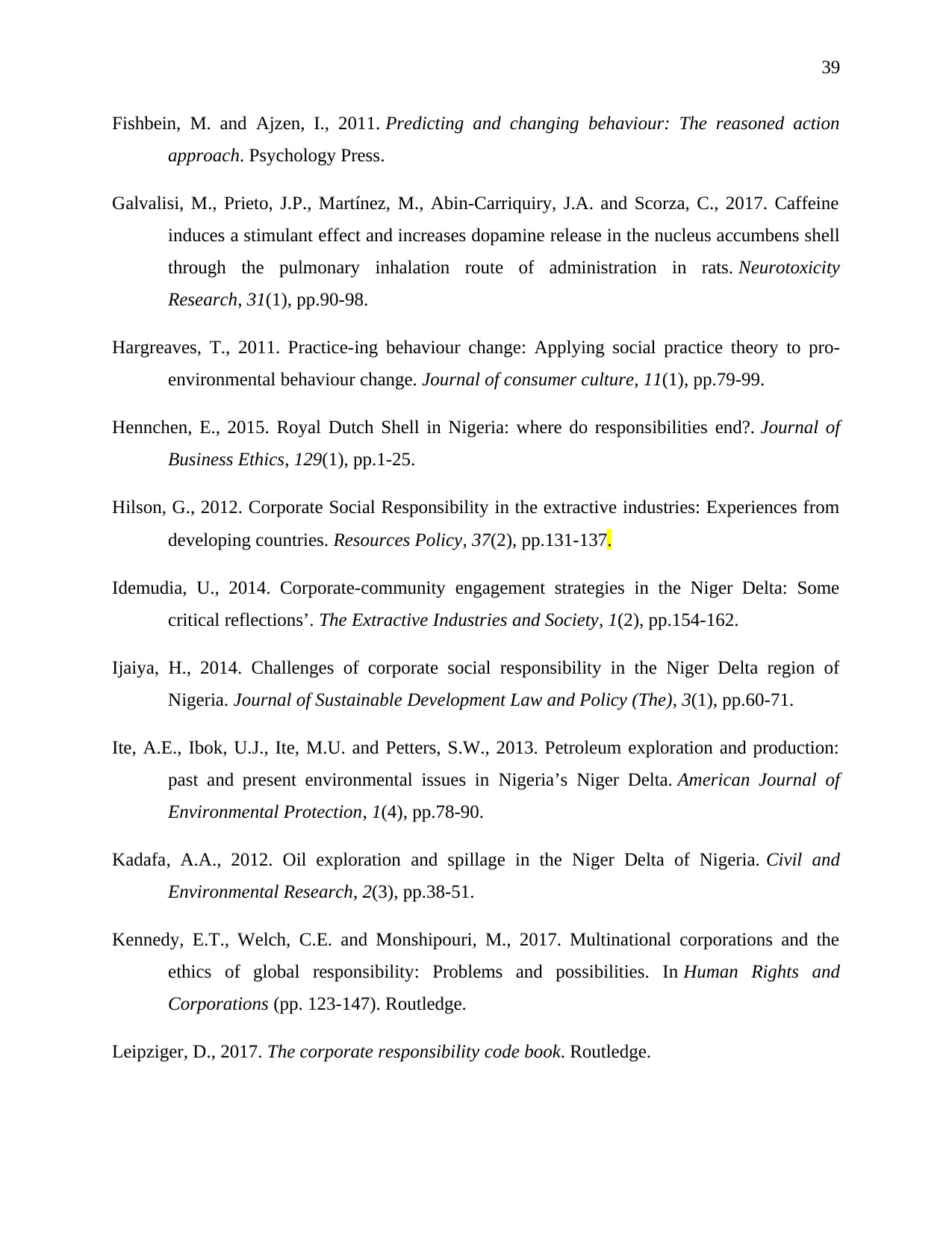
39
Fishbein, M. and Ajzen, I., 2011. Predicting and changing behaviour: The reasoned action
approach. Psychology Press.
Galvalisi, M., Prieto, J.P., Martínez, M., Abin-Carriquiry, J.A. and Scorza, C., 2017. Caffeine
induces a stimulant effect and increases dopamine release in the nucleus accumbens shell
through the pulmonary inhalation route of administration in rats. Neurotoxicity
Research, 31(1), pp.90-98.
Hargreaves, T., 2011. Practice-ing behaviour change: Applying social practice theory to pro-
environmental behaviour change. Journal of consumer culture, 11(1), pp.79-99.
Hennchen, E., 2015. Royal Dutch Shell in Nigeria: where do responsibilities end?. Journal of
Business Ethics, 129(1), pp.1-25.
Hilson, G., 2012. Corporate Social Responsibility in the extractive industries: Experiences from
developing countries. Resources Policy, 37(2), pp.131-137.
Idemudia, U., 2014. Corporate-community engagement strategies in the Niger Delta: Some
critical reflections’. The Extractive Industries and Society, 1(2), pp.154-162.
Ijaiya, H., 2014. Challenges of corporate social responsibility in the Niger Delta region of
Nigeria. Journal of Sustainable Development Law and Policy (The), 3(1), pp.60-71.
Ite, A.E., Ibok, U.J., Ite, M.U. and Petters, S.W., 2013. Petroleum exploration and production:
past and present environmental issues in Nigeria’s Niger Delta. American Journal of
Environmental Protection, 1(4), pp.78-90.
Kadafa, A.A., 2012. Oil exploration and spillage in the Niger Delta of Nigeria. Civil and
Environmental Research, 2(3), pp.38-51.
Kennedy, E.T., Welch, C.E. and Monshipouri, M., 2017. Multinational corporations and the
ethics of global responsibility: Problems and possibilities. In Human Rights and
Corporations (pp. 123-147). Routledge.
Leipziger, D., 2017. The corporate responsibility code book. Routledge.
Fishbein, M. and Ajzen, I., 2011. Predicting and changing behaviour: The reasoned action
approach. Psychology Press.
Galvalisi, M., Prieto, J.P., Martínez, M., Abin-Carriquiry, J.A. and Scorza, C., 2017. Caffeine
induces a stimulant effect and increases dopamine release in the nucleus accumbens shell
through the pulmonary inhalation route of administration in rats. Neurotoxicity
Research, 31(1), pp.90-98.
Hargreaves, T., 2011. Practice-ing behaviour change: Applying social practice theory to pro-
environmental behaviour change. Journal of consumer culture, 11(1), pp.79-99.
Hennchen, E., 2015. Royal Dutch Shell in Nigeria: where do responsibilities end?. Journal of
Business Ethics, 129(1), pp.1-25.
Hilson, G., 2012. Corporate Social Responsibility in the extractive industries: Experiences from
developing countries. Resources Policy, 37(2), pp.131-137.
Idemudia, U., 2014. Corporate-community engagement strategies in the Niger Delta: Some
critical reflections’. The Extractive Industries and Society, 1(2), pp.154-162.
Ijaiya, H., 2014. Challenges of corporate social responsibility in the Niger Delta region of
Nigeria. Journal of Sustainable Development Law and Policy (The), 3(1), pp.60-71.
Ite, A.E., Ibok, U.J., Ite, M.U. and Petters, S.W., 2013. Petroleum exploration and production:
past and present environmental issues in Nigeria’s Niger Delta. American Journal of
Environmental Protection, 1(4), pp.78-90.
Kadafa, A.A., 2012. Oil exploration and spillage in the Niger Delta of Nigeria. Civil and
Environmental Research, 2(3), pp.38-51.
Kennedy, E.T., Welch, C.E. and Monshipouri, M., 2017. Multinational corporations and the
ethics of global responsibility: Problems and possibilities. In Human Rights and
Corporations (pp. 123-147). Routledge.
Leipziger, D., 2017. The corporate responsibility code book. Routledge.
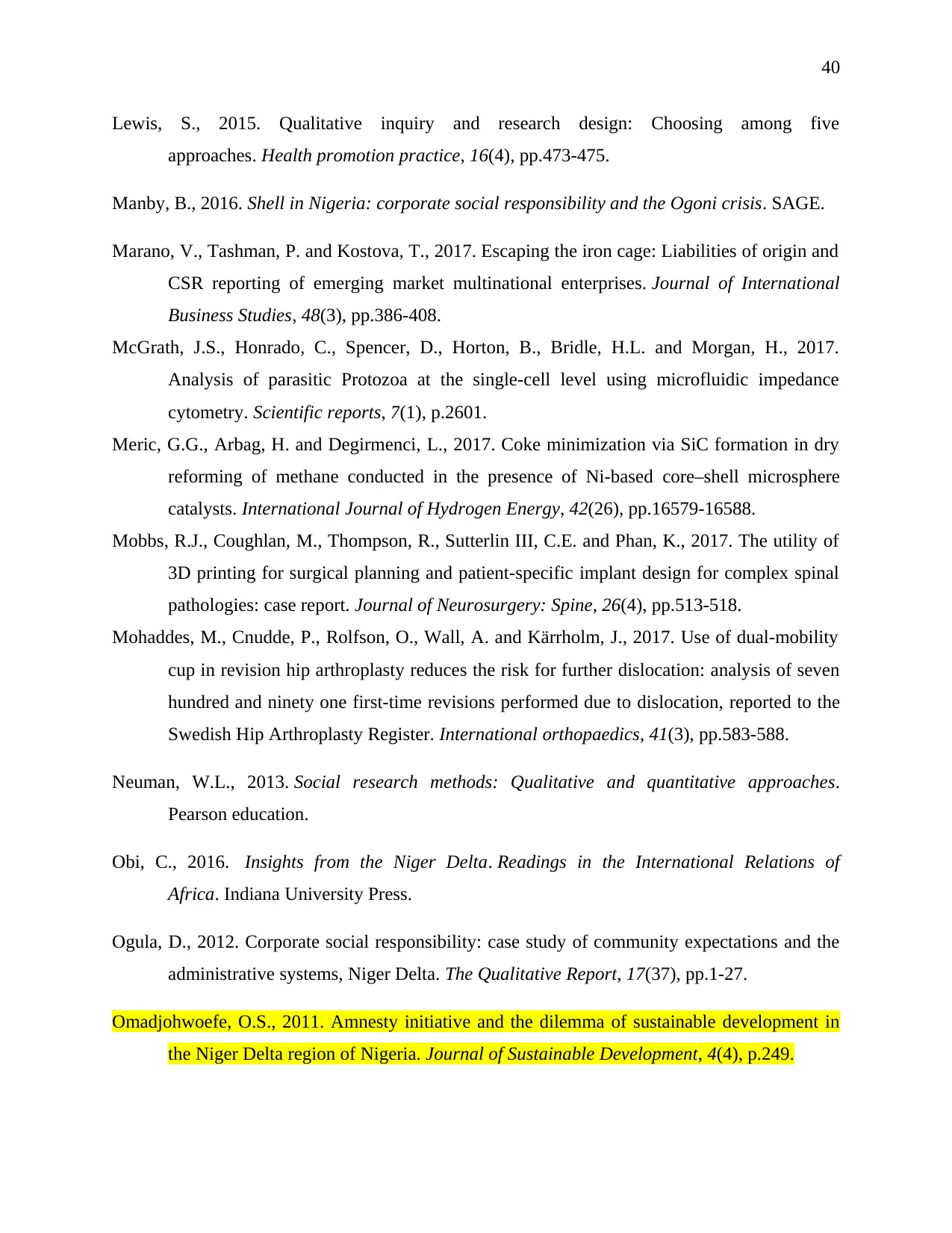
40
Lewis, S., 2015. Qualitative inquiry and research design: Choosing among five
approaches. Health promotion practice, 16(4), pp.473-475.
Manby, B., 2016. Shell in Nigeria: corporate social responsibility and the Ogoni crisis. SAGE.
Marano, V., Tashman, P. and Kostova, T., 2017. Escaping the iron cage: Liabilities of origin and
CSR reporting of emerging market multinational enterprises. Journal of International
Business Studies, 48(3), pp.386-408.
McGrath, J.S., Honrado, C., Spencer, D., Horton, B., Bridle, H.L. and Morgan, H., 2017.
Analysis of parasitic Protozoa at the single-cell level using microfluidic impedance
cytometry. Scientific reports, 7(1), p.2601.
Meric, G.G., Arbag, H. and Degirmenci, L., 2017. Coke minimization via SiC formation in dry
reforming of methane conducted in the presence of Ni-based core–shell microsphere
catalysts. International Journal of Hydrogen Energy, 42(26), pp.16579-16588.
Mobbs, R.J., Coughlan, M., Thompson, R., Sutterlin III, C.E. and Phan, K., 2017. The utility of
3D printing for surgical planning and patient-specific implant design for complex spinal
pathologies: case report. Journal of Neurosurgery: Spine, 26(4), pp.513-518.
Mohaddes, M., Cnudde, P., Rolfson, O., Wall, A. and Kärrholm, J., 2017. Use of dual-mobility
cup in revision hip arthroplasty reduces the risk for further dislocation: analysis of seven
hundred and ninety one first-time revisions performed due to dislocation, reported to the
Swedish Hip Arthroplasty Register. International orthopaedics, 41(3), pp.583-588.
Neuman, W.L., 2013. Social research methods: Qualitative and quantitative approaches.
Pearson education.
Obi, C., 2016. Insights from the Niger Delta. Readings in the International Relations of
Africa. Indiana University Press.
Ogula, D., 2012. Corporate social responsibility: case study of community expectations and the
administrative systems, Niger Delta. The Qualitative Report, 17(37), pp.1-27.
Omadjohwoefe, O.S., 2011. Amnesty initiative and the dilemma of sustainable development in
the Niger Delta region of Nigeria. Journal of Sustainable Development, 4(4), p.249.
Lewis, S., 2015. Qualitative inquiry and research design: Choosing among five
approaches. Health promotion practice, 16(4), pp.473-475.
Manby, B., 2016. Shell in Nigeria: corporate social responsibility and the Ogoni crisis. SAGE.
Marano, V., Tashman, P. and Kostova, T., 2017. Escaping the iron cage: Liabilities of origin and
CSR reporting of emerging market multinational enterprises. Journal of International
Business Studies, 48(3), pp.386-408.
McGrath, J.S., Honrado, C., Spencer, D., Horton, B., Bridle, H.L. and Morgan, H., 2017.
Analysis of parasitic Protozoa at the single-cell level using microfluidic impedance
cytometry. Scientific reports, 7(1), p.2601.
Meric, G.G., Arbag, H. and Degirmenci, L., 2017. Coke minimization via SiC formation in dry
reforming of methane conducted in the presence of Ni-based core–shell microsphere
catalysts. International Journal of Hydrogen Energy, 42(26), pp.16579-16588.
Mobbs, R.J., Coughlan, M., Thompson, R., Sutterlin III, C.E. and Phan, K., 2017. The utility of
3D printing for surgical planning and patient-specific implant design for complex spinal
pathologies: case report. Journal of Neurosurgery: Spine, 26(4), pp.513-518.
Mohaddes, M., Cnudde, P., Rolfson, O., Wall, A. and Kärrholm, J., 2017. Use of dual-mobility
cup in revision hip arthroplasty reduces the risk for further dislocation: analysis of seven
hundred and ninety one first-time revisions performed due to dislocation, reported to the
Swedish Hip Arthroplasty Register. International orthopaedics, 41(3), pp.583-588.
Neuman, W.L., 2013. Social research methods: Qualitative and quantitative approaches.
Pearson education.
Obi, C., 2016. Insights from the Niger Delta. Readings in the International Relations of
Africa. Indiana University Press.
Ogula, D., 2012. Corporate social responsibility: case study of community expectations and the
administrative systems, Niger Delta. The Qualitative Report, 17(37), pp.1-27.
Omadjohwoefe, O.S., 2011. Amnesty initiative and the dilemma of sustainable development in
the Niger Delta region of Nigeria. Journal of Sustainable Development, 4(4), p.249.
Secure Best Marks with AI Grader
Need help grading? Try our AI Grader for instant feedback on your assignments.
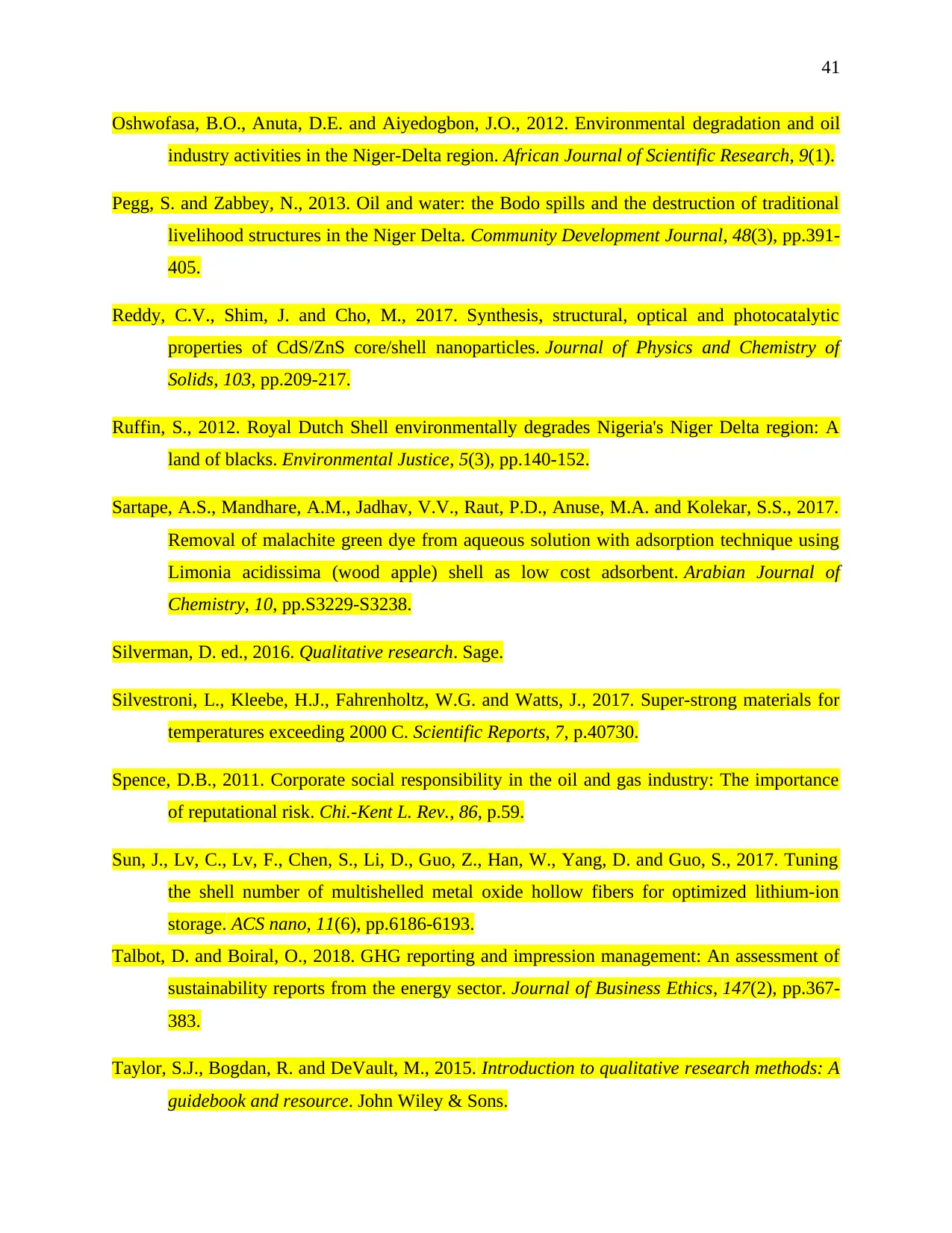
41
Oshwofasa, B.O., Anuta, D.E. and Aiyedogbon, J.O., 2012. Environmental degradation and oil
industry activities in the Niger-Delta region. African Journal of Scientific Research, 9(1).
Pegg, S. and Zabbey, N., 2013. Oil and water: the Bodo spills and the destruction of traditional
livelihood structures in the Niger Delta. Community Development Journal, 48(3), pp.391-
405.
Reddy, C.V., Shim, J. and Cho, M., 2017. Synthesis, structural, optical and photocatalytic
properties of CdS/ZnS core/shell nanoparticles. Journal of Physics and Chemistry of
Solids, 103, pp.209-217.
Ruffin, S., 2012. Royal Dutch Shell environmentally degrades Nigeria's Niger Delta region: A
land of blacks. Environmental Justice, 5(3), pp.140-152.
Sartape, A.S., Mandhare, A.M., Jadhav, V.V., Raut, P.D., Anuse, M.A. and Kolekar, S.S., 2017.
Removal of malachite green dye from aqueous solution with adsorption technique using
Limonia acidissima (wood apple) shell as low cost adsorbent. Arabian Journal of
Chemistry, 10, pp.S3229-S3238.
Silverman, D. ed., 2016. Qualitative research. Sage.
Silvestroni, L., Kleebe, H.J., Fahrenholtz, W.G. and Watts, J., 2017. Super-strong materials for
temperatures exceeding 2000 C. Scientific Reports, 7, p.40730.
Spence, D.B., 2011. Corporate social responsibility in the oil and gas industry: The importance
of reputational risk. Chi.-Kent L. Rev., 86, p.59.
Sun, J., Lv, C., Lv, F., Chen, S., Li, D., Guo, Z., Han, W., Yang, D. and Guo, S., 2017. Tuning
the shell number of multishelled metal oxide hollow fibers for optimized lithium-ion
storage. ACS nano, 11(6), pp.6186-6193.
Talbot, D. and Boiral, O., 2018. GHG reporting and impression management: An assessment of
sustainability reports from the energy sector. Journal of Business Ethics, 147(2), pp.367-
383.
Taylor, S.J., Bogdan, R. and DeVault, M., 2015. Introduction to qualitative research methods: A
guidebook and resource. John Wiley & Sons.
Oshwofasa, B.O., Anuta, D.E. and Aiyedogbon, J.O., 2012. Environmental degradation and oil
industry activities in the Niger-Delta region. African Journal of Scientific Research, 9(1).
Pegg, S. and Zabbey, N., 2013. Oil and water: the Bodo spills and the destruction of traditional
livelihood structures in the Niger Delta. Community Development Journal, 48(3), pp.391-
405.
Reddy, C.V., Shim, J. and Cho, M., 2017. Synthesis, structural, optical and photocatalytic
properties of CdS/ZnS core/shell nanoparticles. Journal of Physics and Chemistry of
Solids, 103, pp.209-217.
Ruffin, S., 2012. Royal Dutch Shell environmentally degrades Nigeria's Niger Delta region: A
land of blacks. Environmental Justice, 5(3), pp.140-152.
Sartape, A.S., Mandhare, A.M., Jadhav, V.V., Raut, P.D., Anuse, M.A. and Kolekar, S.S., 2017.
Removal of malachite green dye from aqueous solution with adsorption technique using
Limonia acidissima (wood apple) shell as low cost adsorbent. Arabian Journal of
Chemistry, 10, pp.S3229-S3238.
Silverman, D. ed., 2016. Qualitative research. Sage.
Silvestroni, L., Kleebe, H.J., Fahrenholtz, W.G. and Watts, J., 2017. Super-strong materials for
temperatures exceeding 2000 C. Scientific Reports, 7, p.40730.
Spence, D.B., 2011. Corporate social responsibility in the oil and gas industry: The importance
of reputational risk. Chi.-Kent L. Rev., 86, p.59.
Sun, J., Lv, C., Lv, F., Chen, S., Li, D., Guo, Z., Han, W., Yang, D. and Guo, S., 2017. Tuning
the shell number of multishelled metal oxide hollow fibers for optimized lithium-ion
storage. ACS nano, 11(6), pp.6186-6193.
Talbot, D. and Boiral, O., 2018. GHG reporting and impression management: An assessment of
sustainability reports from the energy sector. Journal of Business Ethics, 147(2), pp.367-
383.
Taylor, S.J., Bogdan, R. and DeVault, M., 2015. Introduction to qualitative research methods: A
guidebook and resource. John Wiley & Sons.
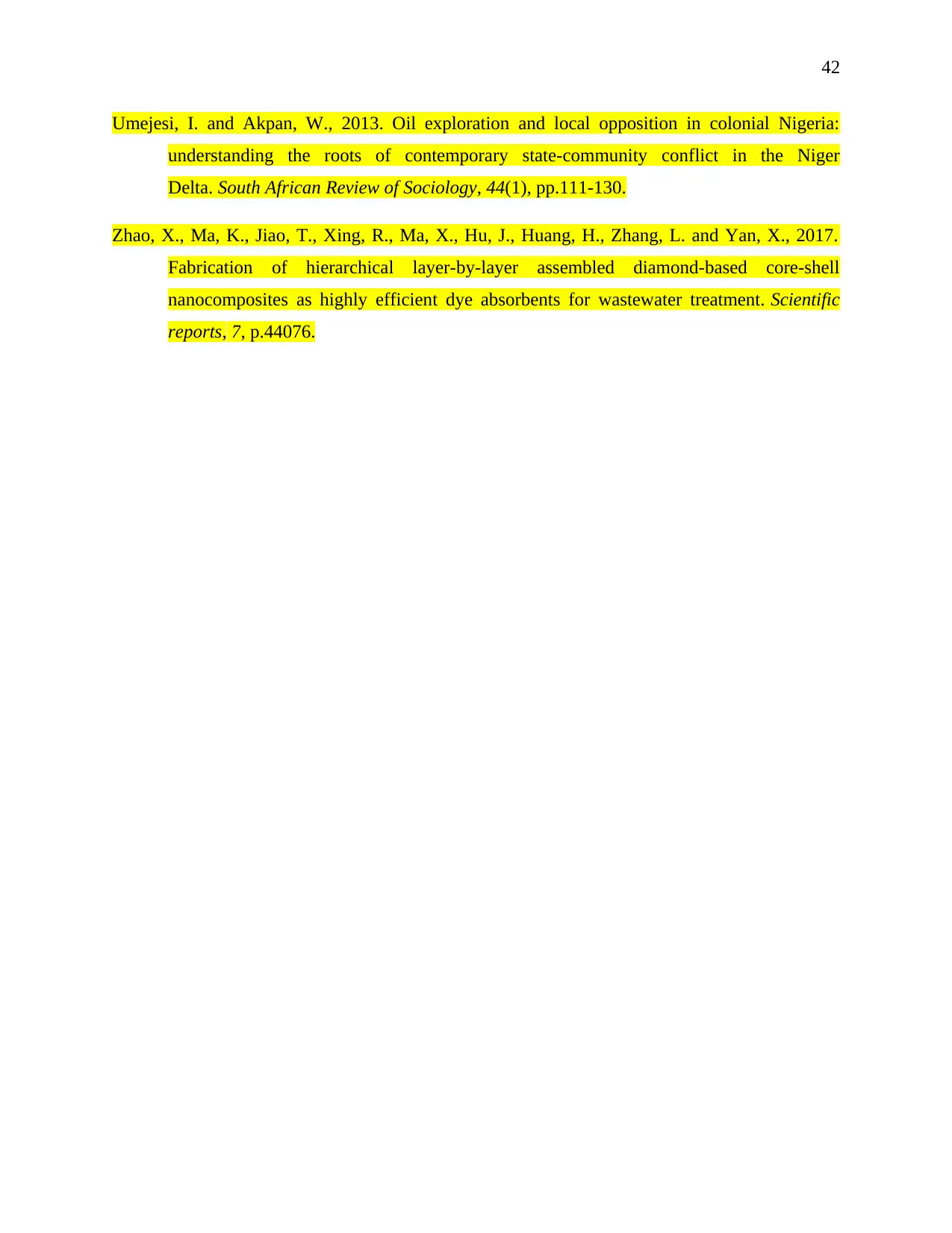
42
Umejesi, I. and Akpan, W., 2013. Oil exploration and local opposition in colonial Nigeria:
understanding the roots of contemporary state-community conflict in the Niger
Delta. South African Review of Sociology, 44(1), pp.111-130.
Zhao, X., Ma, K., Jiao, T., Xing, R., Ma, X., Hu, J., Huang, H., Zhang, L. and Yan, X., 2017.
Fabrication of hierarchical layer-by-layer assembled diamond-based core-shell
nanocomposites as highly efficient dye absorbents for wastewater treatment. Scientific
reports, 7, p.44076.
Umejesi, I. and Akpan, W., 2013. Oil exploration and local opposition in colonial Nigeria:
understanding the roots of contemporary state-community conflict in the Niger
Delta. South African Review of Sociology, 44(1), pp.111-130.
Zhao, X., Ma, K., Jiao, T., Xing, R., Ma, X., Hu, J., Huang, H., Zhang, L. and Yan, X., 2017.
Fabrication of hierarchical layer-by-layer assembled diamond-based core-shell
nanocomposites as highly efficient dye absorbents for wastewater treatment. Scientific
reports, 7, p.44076.
1 out of 42
Related Documents
Your All-in-One AI-Powered Toolkit for Academic Success.
+13062052269
info@desklib.com
Available 24*7 on WhatsApp / Email
![[object Object]](/_next/static/media/star-bottom.7253800d.svg)
Unlock your academic potential
© 2024 | Zucol Services PVT LTD | All rights reserved.





